


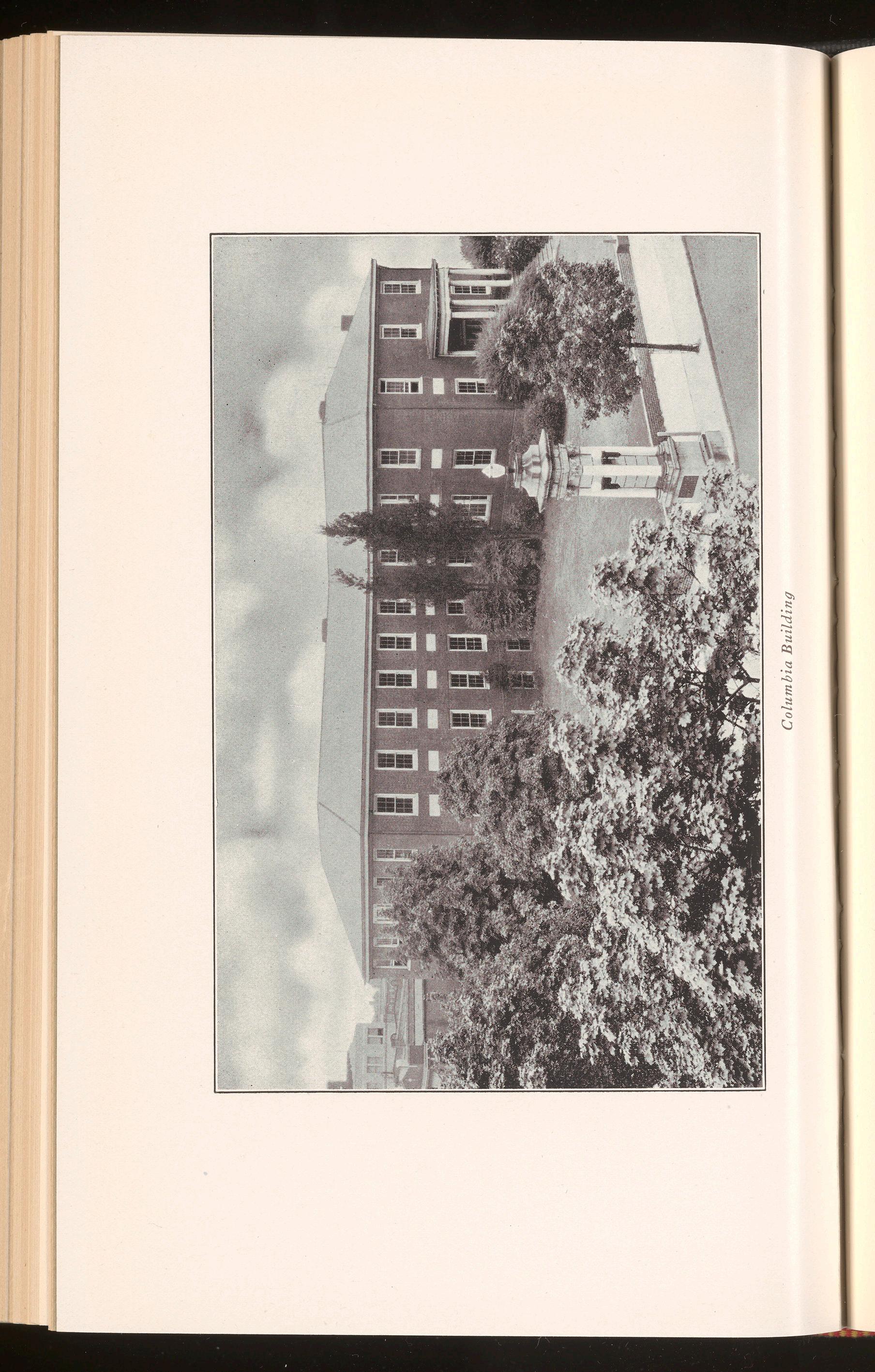
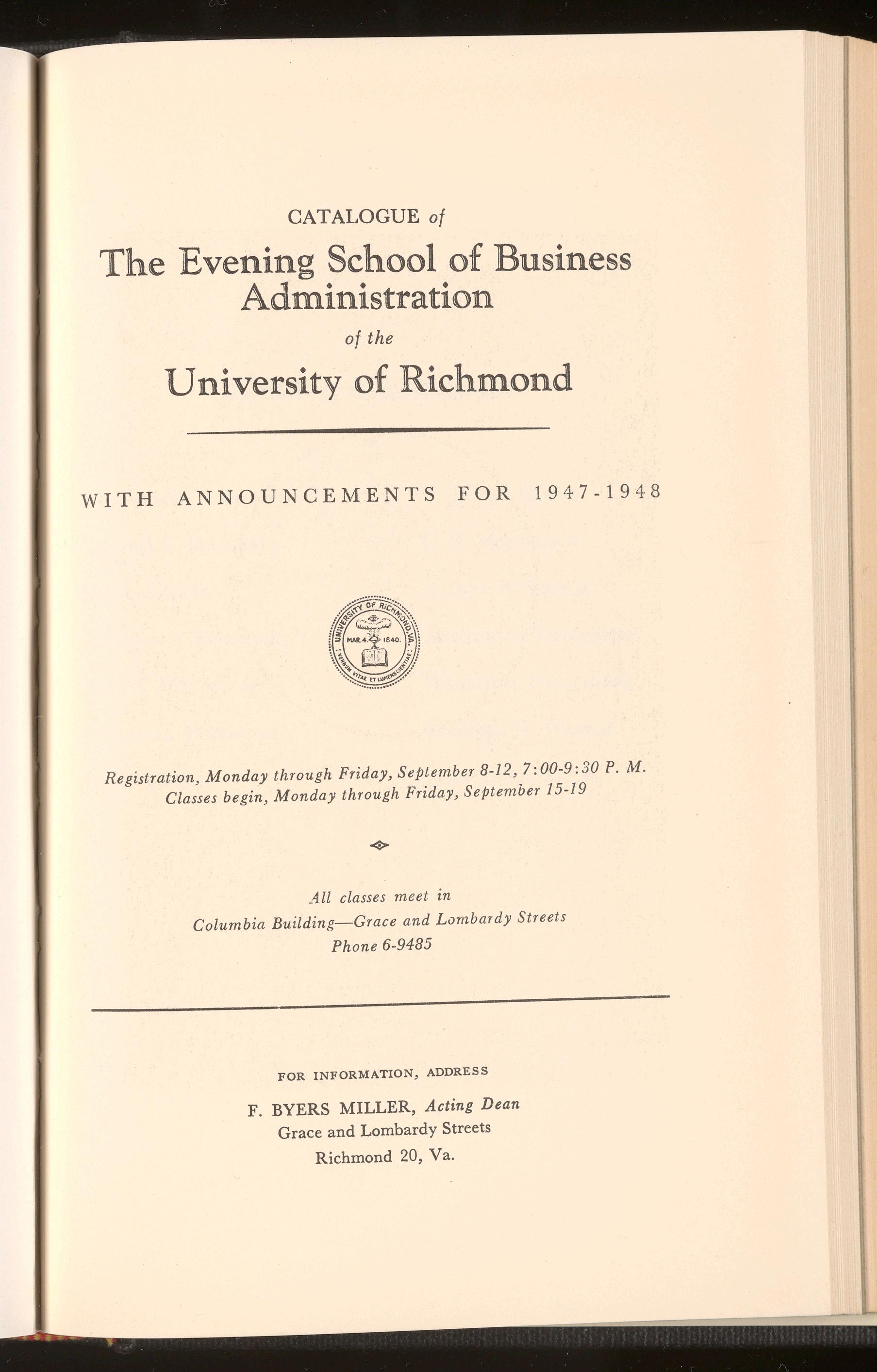






Registration, Monday through Friday, September 8-12, 7:00-9:30 P. M.
Classes begin, Monday through Friday, September 15-19
All classes meet in Columbia Building-Grace and Lombardy Streets Phone 6-9485 FOR INFORMATION, ADDRESS
F. BYERS MILLER, Acting Dean Grace and Lombardy Streets
Richmond 20, Va.

T. COLEMAN ANDREWS
THOMAS C. BousHALL
NORMAN CALL
DOUGLAS s. FREEMAN
J ACK G. HOLTZCLAW
J AMBLER JOHNSTON
HUGH LEACH
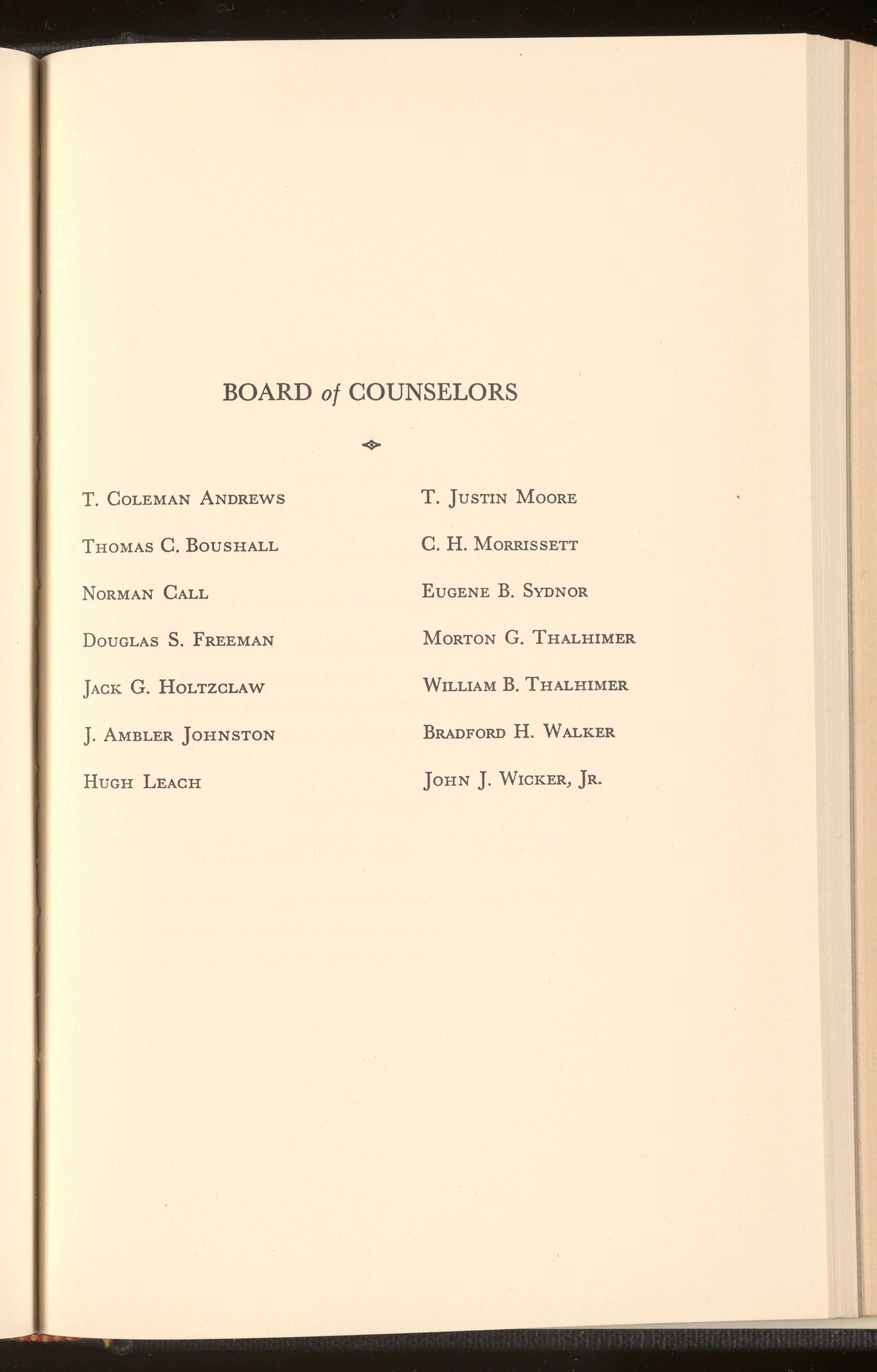
T. JUSTIN MOORE
C. H. MoRRISSETT
EUGENE B. SYDNOR
MORTON G. THALHIMER
WILLIAM B. THALHIMER
BRADFORD H wALKER
JOHN J. WICKER, JR.

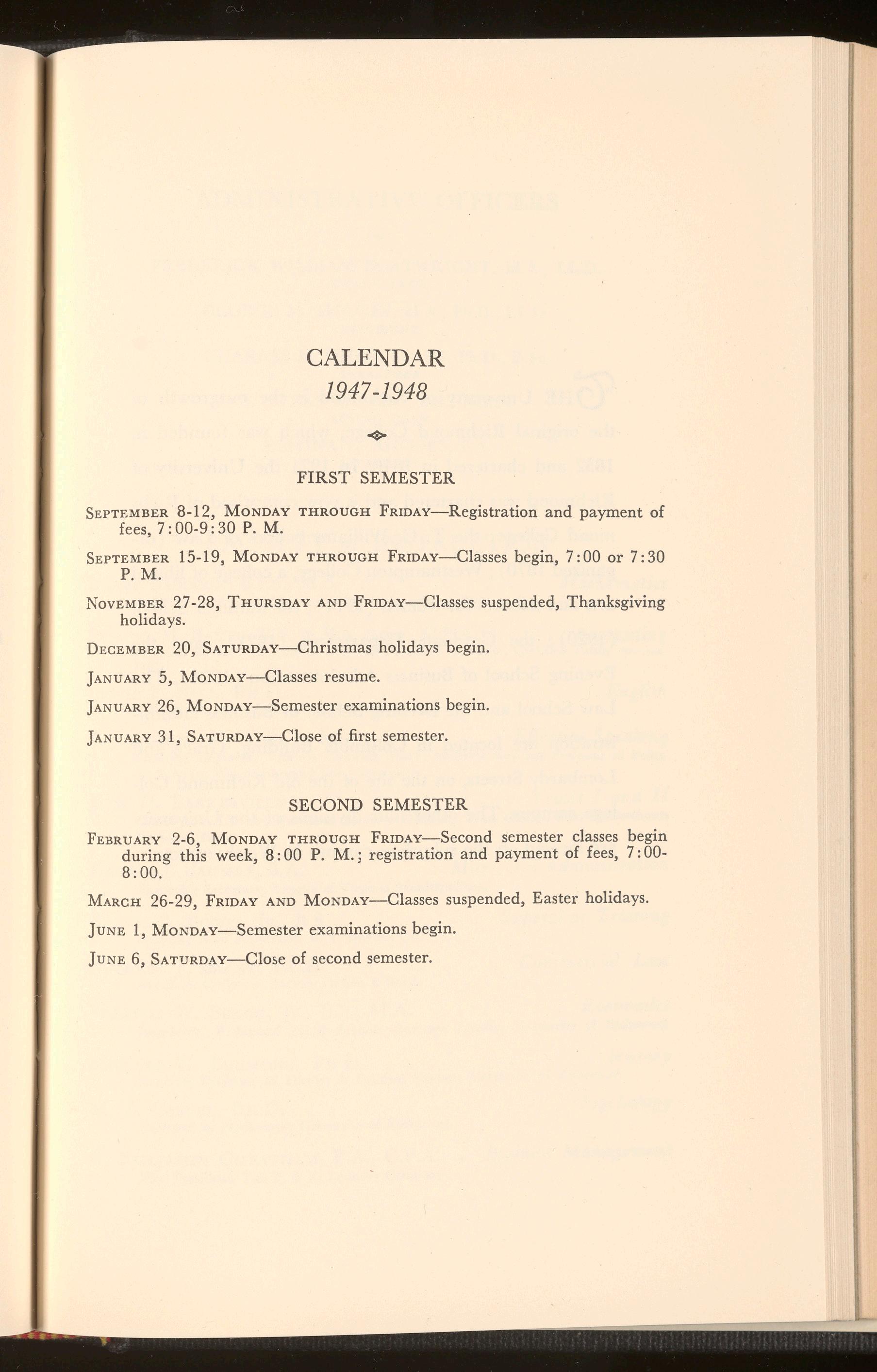
SEPTEMBER8-12, MONDAY THROUGH FRIDAY-Registration and payment of fees, 7: 00-9: 30 P. M.
SEPTEMBER 15-19, MoNDAY THROUGH FRIDAY-Classes begin, 7: 00 or 7: 30 P.M.
NovEMBER 27-28, THURSDAY AND FRIDAY-Classes suspended, Thanksgiving holidays.
DECEMBER 20, SATURDAY-Christmas holidays begin.
JANUARY5, MONDAY-Classes resume.
JANUARY26, MONDAY-Semester examinations begin.
JANUARY31, SATURDAY-Close of first semester.
FEBRUARY 2-6, MONDAY THROUGH FRIDAY-Second semester classes begin during this week, 8: 00 P. M.; registration and payment of fees, 7: 008: 00.
MARCH 26-29, FRIDAY AND MONDAY-Classes suspended, Easter holidays.
JUNE 1, lvfoNDAY-Scmester examinations begin.
JUNE 6, SATURDAY-Close of second semester.

~HE University of Richmond is the outgrowth of the original Richmond College, which was founded in 1832 and chartered in 1840. In 1921 the University of Richmond was chartered and is now comprised of Richmond College; the T. C. Williams School of Law ( organized 1870); Westhampton College, a college of liberal arts and sciences for women (1914); the Summer School ( 1920); the Graduate Department ( 1921); and the Evening School of Business Administration ( 1924). The Law School and the Evening School of Business Administration are located in Columbia Building, Grace and Lombardy Streets, on the site of the old Richmond College campus. The other four divisions of the University are located on the suburban campus in Westhampton.
FREDERICK WILLIAM BOATWRIGHT, M.A., LL.D. CHANCELLOR
GEORGE M. MODLIN, M.A., Ph.D., LL.D. PRESIDENT
CHARLES H. WHEELER, III, Ph.D., D.Sc. TREASURER
F. BYERS MILLER, B.S., M.B.A. ACTING DEAN
ELMINA C. RHODES, B.A. SECRETARY
LEROYBABcocK, B.Eo., M.S. Mathematics
Assistant Professor of Mathematics, University of Richmond.
SAMUELH. BAKER,B.S. in Bus. Adm., C.P.A. . . • Accountino Member of the firm, Baker, Brydon, Rennolds & Whitt, Certified Public AccoUI'i'tants.
LEWISF. BALL, PH.D.
Assistant Professor of English, University of Richmond. English
F. J. BARNES,II, A. B., A. M. Effective Speaking Planning Engineer, Virginia Planning Board; formerly Assistant Professor of Political Science, Washington and Lee University.
JACK H. BASKERVILLE . . . . Trusts I and II Graduate A.I.B. and Graduate School of Banking. Trust Officer, First & Merchants National Bank.
HAROLDI. BAUMES,B.A. Municipal Administration
Executive Secretary, League of Virginia Municipalities.
RALPH E. BOGGS,JR., B.S. . . Spinning Area Supervisor, E. I. DuPont Co.
ANDREWJ. BRENT, LL.B. . Associate, Christian, Barton, Parker, & Boyd.

Supervisor Training
Commercial Law
WI W B J B S M A Economics
LLIAM . ROCK, R., . ., . • · • · • Instructor, Richmond Public Schools-Summer Faculty, University of Richmond.
MILLARDK. BusHONG, PH.D. . . . . . . History Associate Professor of History & Political Science, University -of Richmond.
M. E. CARVER,PH.D. . . . . . Professor of Psychology, University of Richmond. Psychology
R. BENJAMINCHEATHAM,B.A., C.P.A. Business Management Vice President, The T. & E. Laundry Company.
A. M. CLEMENT, B.S. in Bus. Adm., C.P.A. Tax Accountant and Statistician, Virginia Electric & Power Co.
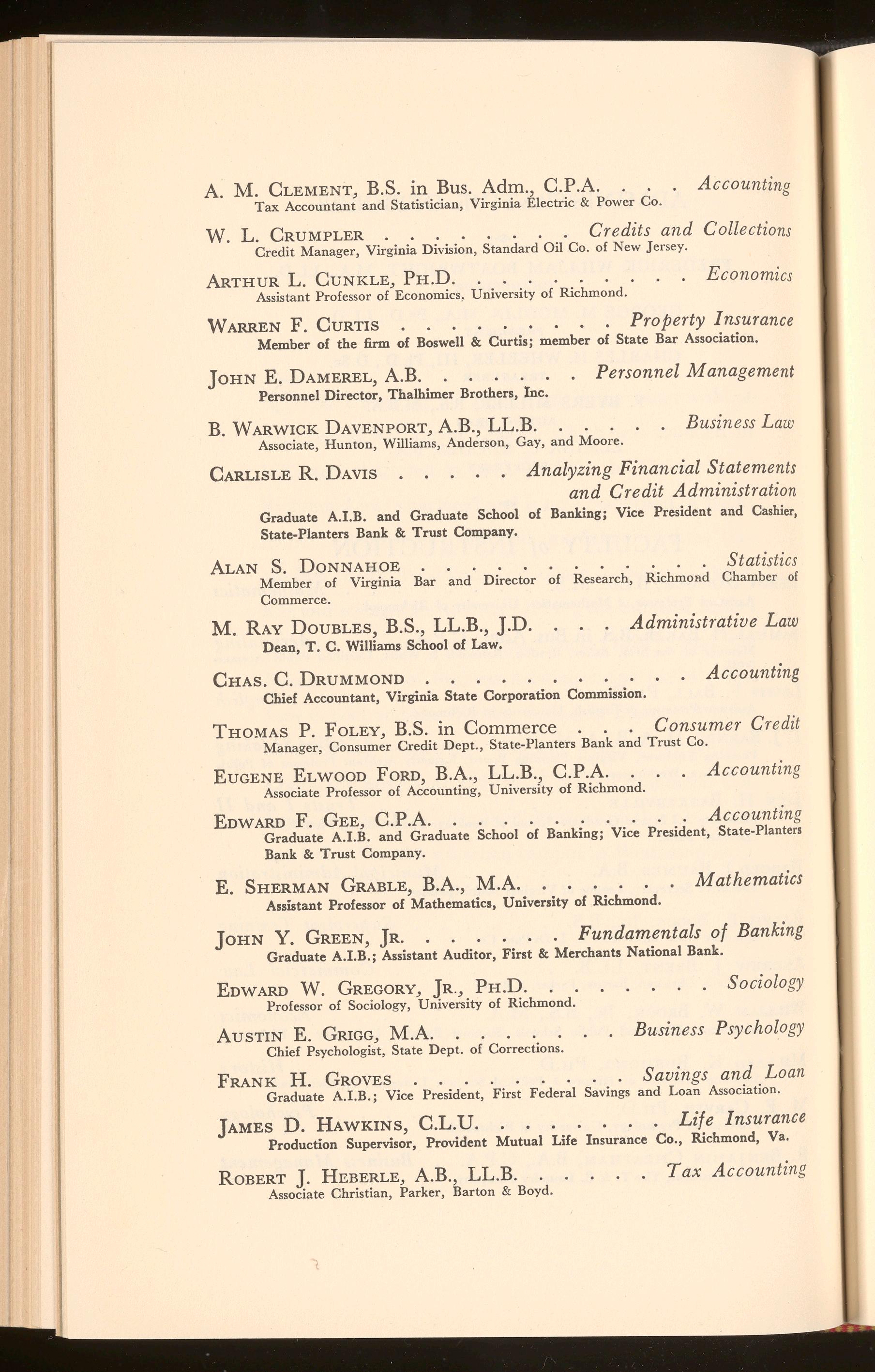
Accounting
W. L. CRUMPLER . . . . Credits and Collections Credit Manager, Virginia Division, Standard Oil Co. of New Jersey.
ARTHUR L. CUNKLE, PH.D.
Economics Assistant Professor of Economics, University of Richmond.
WARREN F. CURTIS
Property Insurance Member of the firm of Boswell & Curtis; member of State Bar Association.
JOHN E. DAMEREL, A.B.
Personnel Management Personnel Director, Thalhimer Brothers, Inc.
B. WARWICK DAVENPORT,A.B., LL.B. Associate, Hunton, Williams, Anderson, Gay, and Moore.
CARLISLE R. DAVIS
Business Law
Analyzing Financial Statements and Credit Administration
Graduate A.I.B. and Graduate School of Banking; Vice President and Cashier, State-Planters Bank & Trust Company.
ALAN S. DoNNAHOE Statistics Member of Virginia Bar and Director of Research, Richmond Chamber of Commerce.
M. RAY DOUBLES, B.S., LL.B., J.D.
Administrative Law Dean, T. C. Williams School of Law.
CHAS. C. DRUMMOND
Accounting Chief Accountant, Virginia State Corporation Commission.
THOMAS P. FOLEY, B.S. in Commerce Consumer Credit Manager, Consumer Credit Dept., State-Planters Bank and Trust Co.
EuGENE ELWOOD FoRD, B.A., LL.B., C.P.A. Accounting Associate Professor of Accounting, University of Richmond.
EDWARD F. GEE, C.P.A. . . . . Accounting Graduate A.I.B. and Graduate School of Banking; Vice President, State-Planters Bank & Trust Company.
E. SHERMAN GRABLE, B.A., M.A. Mathematics Assistant Professor of Mathematics, University of Richmond.
JoHN Y. GREEN, JR. Fundamentals of Banking Graduate A.I.B.; Assistant Auditor, First & Merchants National Bank.
EDWARD w. GREGORY, JR., PH.D. Professor of Sociology, University of Richmond.
AUSTIN E. GRIGG, M.A. Chief Psychologist, State Dept. of Corrections. Sociology
FRANK H. GROVES
Business Psychology
Savings and Loan
Graduate A.I.B.; Vice President, First Federal Savings and Loan Association.
JAMES D. HAWKINS, C.L.U. Life Insurance Production Supervisor, Provident Mutual Life Insurance Co., Richmond, Va.
ROBERT J. HEBERLE, A.B., LL.B. Tax Accounting Associate Christian, Parker, Barton & Boyd.
NATHANIELH. HENRY, PH.D. . . .
Assistant Professor of English, University of Richmond.
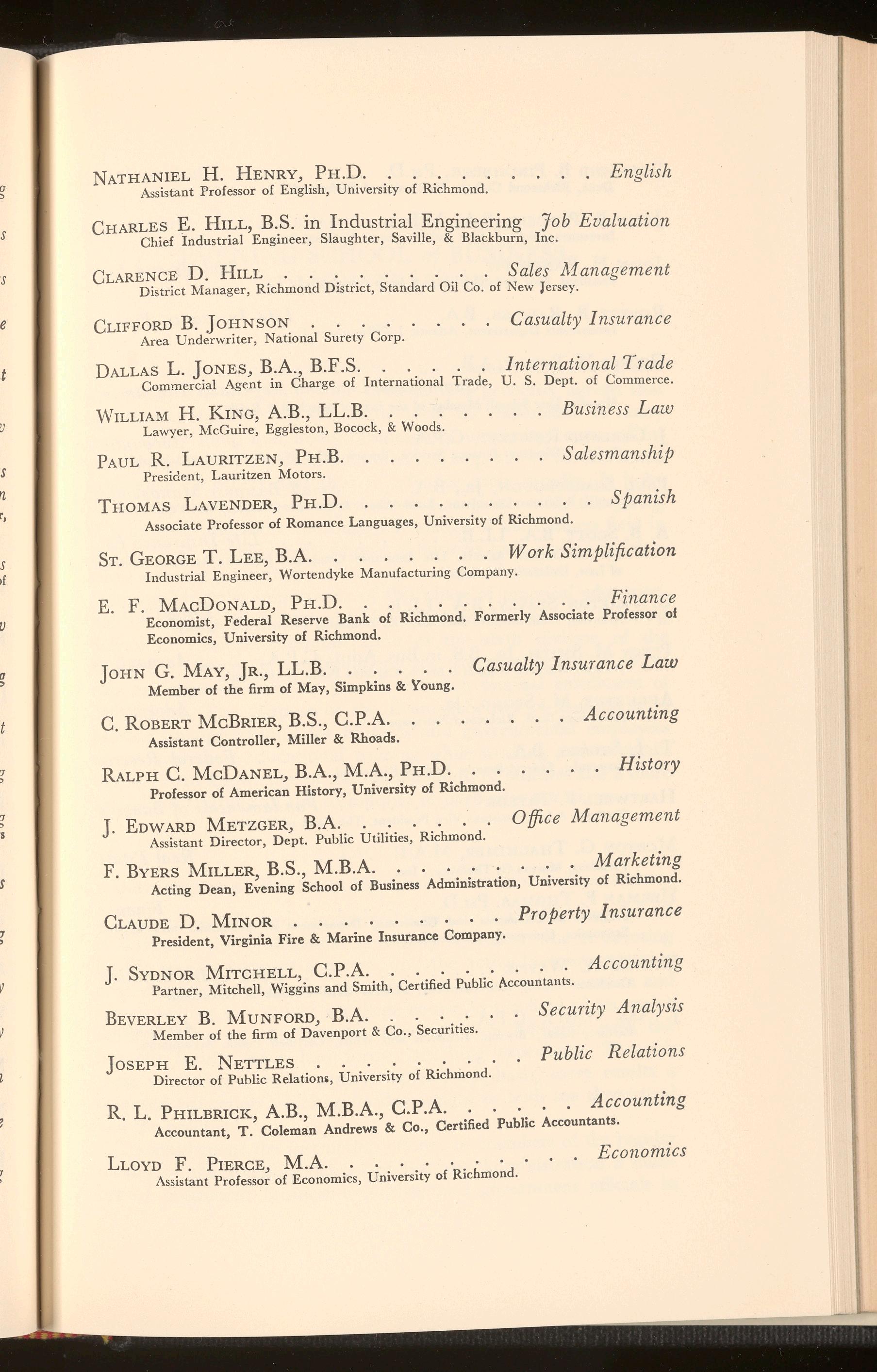
English
CHARLESE. HILL, B.S. in Industrial Engineering ]ob Evaluation
Chief Industrial Engineer, Slaughter, Saville, & Blackburn, Inc
CLARENCED. HILL . . . . . Sales A1anagement
District Manager, Richmond District, Standard Oil Co. of New Jersey.
CLIFFORDB. JOHNSON
Area Unde rwriter, National Surety Corp.
Casualty Insurance
DALLASL. JoNES, B.A., B.F.S. . International Trade Commercial Agent in Charge of International Trade, U S. Dept. of Commerce.
WILLIAMH. KING, A.B., LL.B. . . . Lawy er, McGuire, Eggleston, Bocock, & Woods.
PAUL R. LAURITZEN,PH.B.
President, Lauritzen Motors.
THOMAS LAVENDER,PH.D.
Business Law
Salesmanship
Spanish
Associate Professor of Romance Languages, University of Richmond.
ST. GEORGET. LEE, B.A.
Work Simplification
Industrial En gineer, Wortendyke Manufacturing Company.
E. F. MAcDoNALD, PH.D. . Finance Economist, Federal Reserve Bank of Richmond. Formerly Associate Professor of Economics, University of Richmond.
JoHN G. MAY, JR., LL.B. Casualty Insurance Law
Member of the firm of May, Simpkins & Young.
C. RoBERTMcBruER, B.S., C.P.A. Assistant Controller, Miller & Rhoads.
RALPHC. McDANEL, B.A., M.A., PH.D.
Accounting
History Professor of American History, University of Richmond.
J. EDWARDMETZGER,B.A. . Office Management
Assistant Director, Dept. Public Utilities, Richmond.
F. BYERSMILLER,B.S., M.B.A.
Marketing
Acting Dean, Evening School of Business Administration, University of Richmond.
CLAUDED. MINOR Property Insurance President, Virginia Fire & Marine Insurance Company.
J. SYDNORMITCHELL, C.P.A. . . . . . Accounting Partner, Mitchell, Wiggins and Smith, Certified Public Accountants.
BEVERLEYB. MUNFORD, B.A. . Security Analysis Member of the firm of Davenport & Co., Securities
Public R elations
JOSEPH E. NETTLES . . Director of Puhlic Relatiom, University of Richmond.
R. L. PHILBRICK,A.B., M.B.A., C.P.A.
Accounting Accountant, T. Coleman Andrews & Co., Certified Public Accountants.
LLOYDF. PIERCE, M.A. . . . . .
Assistant Professor of Economics, University of Richmond. Economics

RAYMOND B. PINCHBECK, PH.D. . . • Business Ethics Dean, Richmond College, University of Richmond.
JoHN B. PURCELL, B.A., M.B.A. . . . Investments Investment Division, First and Merchants National Bank.
JoHN H. RANDOLPH . . . . . . . Savings and Loan President, First Federal Savings & Loan Association.
ROBERT B. RAWLES, B.A. . . . Life Insurance Finance Investments Department, Atlantic Life Insurance Co.
GEORGE w.REILLY, A.B.
Commercial Law and Negotiable Instruments
Harvard Law School; Member of the firm of Mitchell & Reilly.
J. GARLAND ROWLETT, C.P.A. Accounting Assistant Director, Finance Service, Branch Office No. 4, Veterans Ad1ninistration.
PAUL SCARBOROUGH, JR.,B.A. Small Business Management Public Relations Consultant, Lord-Abbett & Company, Inc., New York City.
A. B. ScoTT, B.A., LL.B. Life Insurance Law General Counsel, Atlantic Life Insurance Company; formerly Assistant Professor of Law, University of Virginia.
C. TRAFTON SEAVEY, B.A., LL.B. . . . . . . Property Law Attorney, Administrative Director, Old Dominion Investigating Agency.
PERCY M. SMITH, JR., B.S. in Bus. Adm., C.P.A. Accounting Partner, Mitchell, Wiggins & Smith, Certified Public Accountants.
AUGUSTUS M. SPONG, JR. . Advertising Advertising Staff, Richmond Newspapers, Inc.
T. I. STORRS, B.A. Federal Reserve Economist, Federal Reserve Bank of Richmond.
HARTWELL F. TAYLOR Fundamentals of Banking Graduate A.LB., Assistant Vice President, The Bank of Virginia.
MORTON G. THALHIMER, M.A.I. Real Estate President, Morton G. Thalhimer, Inc.
HERMAN P. THOMAS, PH.D. Finance Professor of Economics and Chairman, Department of Economics and Applied Economics, University of Richmond.
EDw ARD A. WAYNE Bank Administration Graduate A.I.B.; Vice President, Federal Reserve Bank of Richmond.
J. AsA WHITT, C.P.A. Accounting Partner, Baker, Brydon, Rennolds and Whitt, Certified Public Accountants.
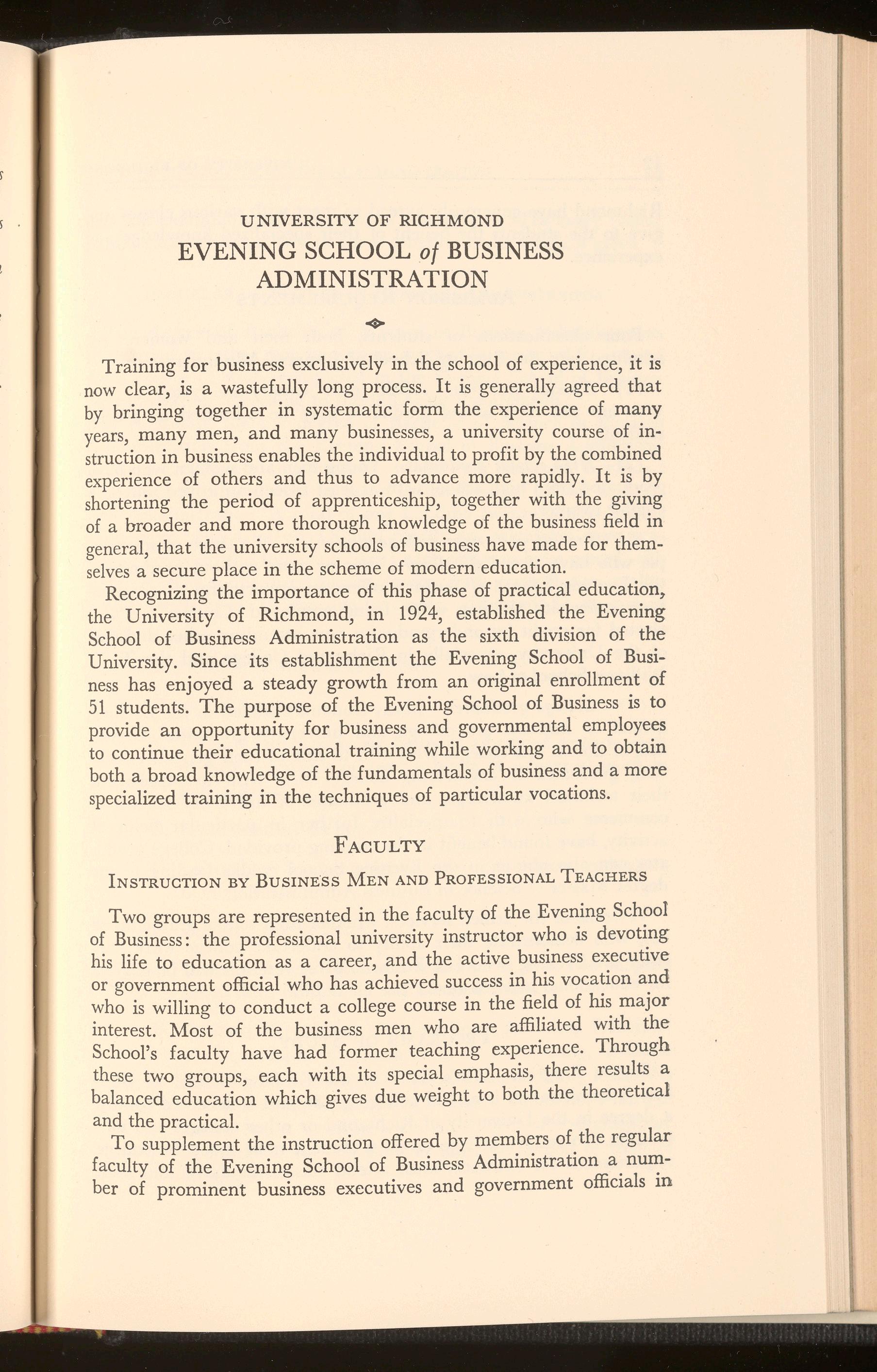
Training for business exclusively in the school of experience, it is now clear, is a wastefully long process. It is generally agreed that by bringing together in systematic form the experience of many years, many men, and many businesses, a university course of instruction in business enables the individual to profit by the combined experience of others and thus to advance more rapidly. It is by shortening the period of apprenticeship, together with the giving of a broader and more thorough knowledge of the business field in general, that the university schools of business have made for themselves a secure place in the scheme of modern education .
Recognizing the importance of this phase of practical education, the University of Richmond, in 1924, established the Evening School of Business Administration as the sixth division of the University. Since its establishment the Evening School of Business has enjoyed a steady growth from an original enrollment of 51 students. The purpose of the Evening School of Business is to provide an opportunity for business and governmental employees to continue their educational training while working and to obtain both a broad knowledge of the fundamentals of business and a more specialized training in the techniques of particular vocations.
INSTRUCTION BY BUSINESS MEN AND PROFESSIONAL TEACHERS
Two groups are represented in the faculty of the Evening Schoo! of Business: the professional university instructor who is devoting his life to education as a career, and the active business executive or government official who has achieved success in his vocation and who is willing to conduct a college course in the field of his major interest. Most of the business men who are affiliated with the School's faculty have had former teaching experience. Through these two groups, each with its special emphasis, there results a balanced education which gives due weight to both the theoretical and the practical.
To supplement the instruction offered by members of the regular faculty of the Evening School of Business Administration a number of prominent business executives and government officials in
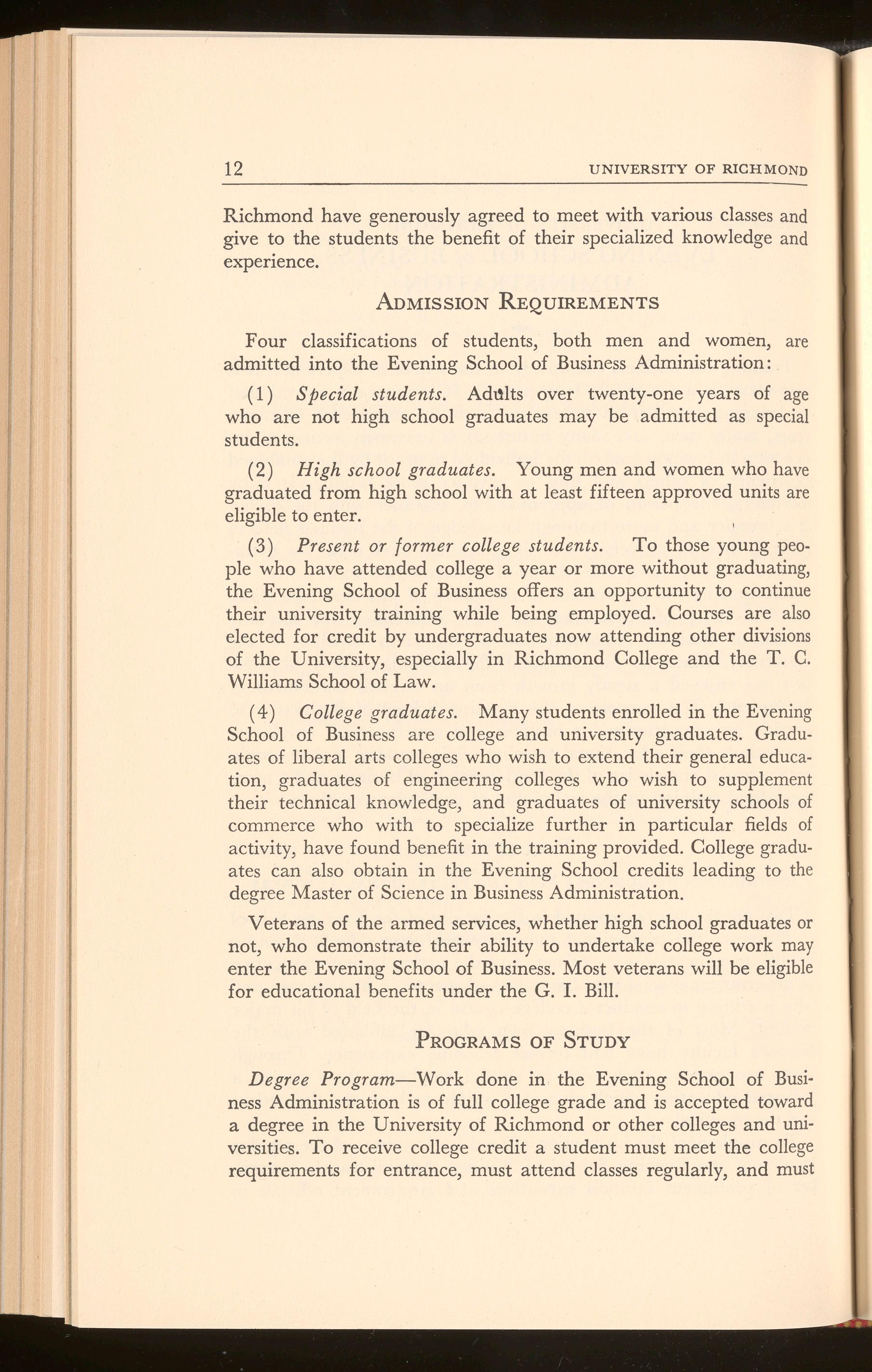
Richmond have generously agreed to meet with various classes and give to the students the benefit of their specialized knowledge and experience.
Four classifications of students, both men and women, are admitted into the Evening School of Business Administration:
( 1) Special students. Adrtlts over twenty-one years of age who are not high school graduates may be admitted as special students.
(2) High school graduates. Young men and women who have graduated from high school with at least fifteen approved units are eligible to enter.
(3) Present or former college students. To those young people who have attended college a year or more without graduating, the Evening School of Business offers an opportunity to continue their university training while being employed. Courses are also elected for credit by undergraduates now attending other divisions of the University, especially in Richmond College and the T. C Williams School of Law.
(4) College graduates. Many students enrolled in the Evening School of Busin ess are college and university graduates. Graduates of liberal arts colleges who wish to extend their general education, graduates of engineering colleges who wish to supplem ent their technical knowledge, and graduates of university schools of commerce who with to specialize further in particular fields of activity , have found benefit in the training provided. College graduates can also obtain in the Evening School credits leading to th e degree Master of Science in Business Administration.
Veterans of the armed services, whether high school graduates or not, who demonstrate their ability to undertake college work may enter the Evening School of Business. Most veterans will be eligible for educational benefits under the G. I. Bill.
Degree Program-Work done in the Evening School of Business Administration is of full college grade and is accepted toward a degree in the University of Richmond or other colleges and universities. To receive college credit a student must meet the college requirements for entrance, must attend classes regularly, and must

pass the examinations at the end of the semester. For every course passed each semester, two or three semester-hours credit is given.
The degree of Bachelor of Science in Business Administration is awarded to either men or women by the University of Richmond for a course of study completed in the Evening School of Business Administration according to the following requirements: A candidate for the degree of Bachelor of Science in Business Administration from the Evening School of Business Administration must complete one hundred twenty-four semester hours, at least sixty of which must be taken in the Evening School of Business Administration. A total of one hundred twenty quality credits must have been attained. Quality credits are calculated from academic hours on the following basis: each semester hour passed with grade A shall count three quality credits; with grade B, two quality credits; with grade C, one quality credit; with grade D, no quality credit.
The distribution of work is as follows:
A. Foreign Languages: six hours of advanced work in each of two languages or twelve hours of advanced work in one language.
B. Mathematics: six hours.
C. Laboratory Science: eight hours, or its subject equivalent, in one science.
D. English: twelve hours.
E. Social Sciences: eighteen hours in at least two subjects other than economics and business subjects. ·
F. Business Economics: Fifty-six hours including Principles of Economics, Fundamentals of Accounting, Business Statistics, Money and Banking, Business Law, Principles of Marketing, Corporation Finance, Industrial Management, and a thesis in a chosen subject of concentration. A crrade of no less than C must be earned in each of ::, these courses.
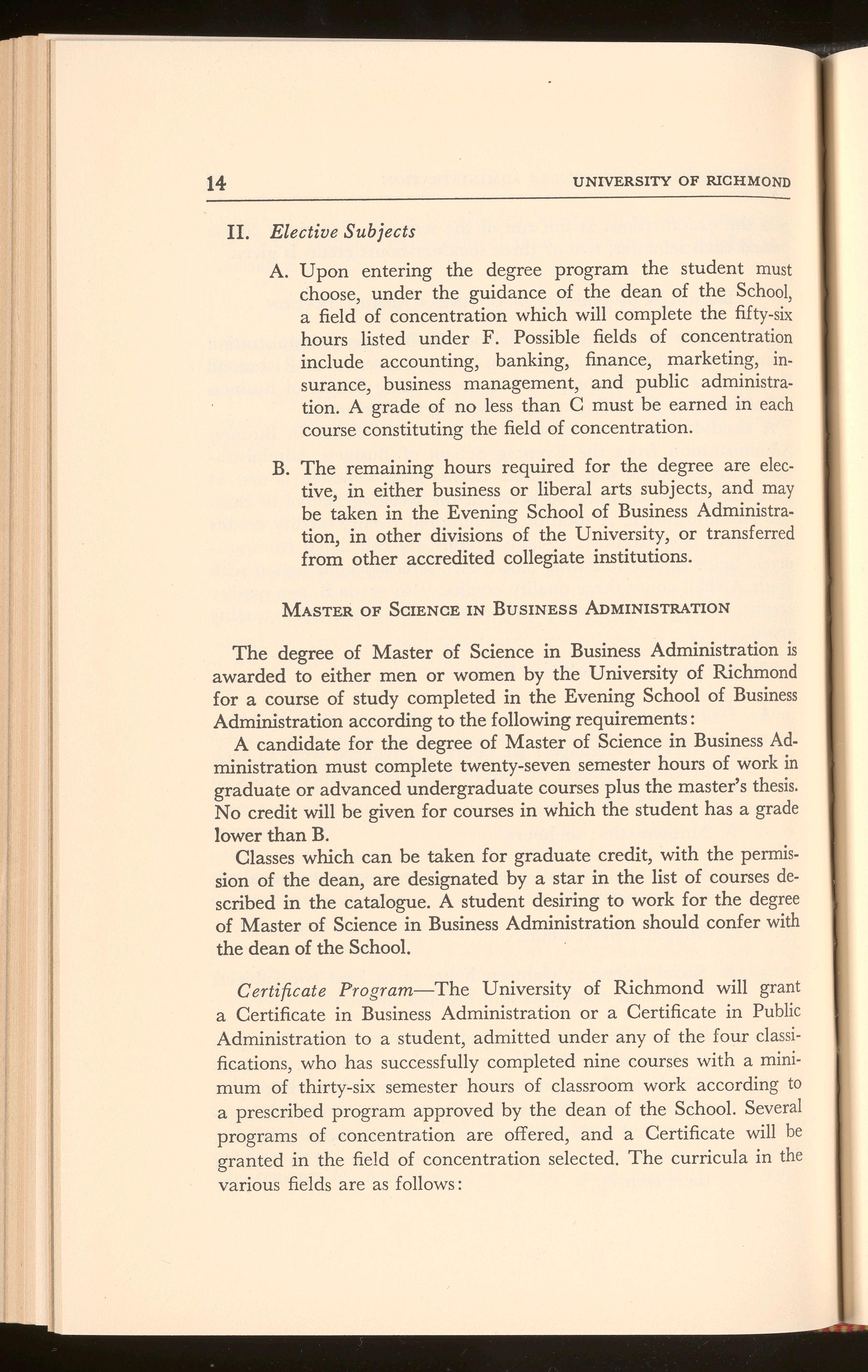
A. Upon entering the degree program the student must choose, under the guidance of the dean of the School, a field of concentration which will complete the fifty-six hours listed under F. Possible fields of concentration include accounting, banking, finance, marketing, insurance, business management, and public administration. A grade of no less than C must be earned in each course constituting the field of concentration.
B. The remaining hours required for the degree are elective, in either business or liberal arts subjects, and may be taken in the Evening School of Business Administration, in other divisions of the University, or transferred from other accredited collegiate institutions.
The degree of Master of Science in Business Administration is awarded to either men or women by the University of Richmond for a course of study completed in the Evening School of Business Administration according to the following requirements: A candidate for the degree of Master of Science in Business Administration must complete twenty-seven semester hours of work in graduate or advanced undergraduate courses plus the master's thesis. No credit will be given for courses in which the student has a grade lower than B.
Classes which can be taken for graduate credit, with the permission of the dean, are designated by a star in the list of courses described in the catalogue. A student desiring to work for the degree of Master of Science in Business Administration should confer with the dean of the School.
Certificate Program-The University of Richmond will grant a Certificate in Business Administration or a Certificate in Public Administration to a student, admitted under any of the four classifications, who has successfully completed nine courses with a minimum of thirty-six semester hours of classroom work according to a prescribed program approved by the dean of the School. Several programs of concentration are offered, and a Certificate will be granted in the field of concentration selected. The curricula in the various fields are as follows:
CERTIFICATE IN BUSINESS ADMINISTRATION Accounting
First year: Second year:
Third year: Fourth year:
First year:
Second year: Third year:
First year: Second year:
Third year:

First year: Second year:
Third year:
Accounting I, Business English, Business Law. Accounting II, Corporation Finance, Accounting VII.
Accounting III, Cost Accounting VI. Tax Accounting IV, Auditing V.
Banking
Fundamentals of Banking, Money and Banking, Commercial Law, Negotiable Instruments, Economics I.
Accounting IB, Economics II.
Four electives to complete 12 semester hours.
Finance
Accounting IB, Business English, Economics I. Money and Banking, Business Law, Business Statistics.
Corporation Finance, Investments, Business Mathematics.
Insurance
Business English, Economics I, C.L.U. A and B or a course in Property Insurance.
Business Statistics, Business Law, C.L.U. C and D or a course in Property Insurance.
Corporation Finance, Investments, C.L.U. E or a course in Property Insurance.
Marketing
First year: Second year: Third year:
First year:
Second year:
Third year:
Business English, Salesmanship, Accounting I.
Marketing, Economics I, Sales Management. Advertising, Business Law, Market Research.
Business Management
Economics I, Business Law, Business Psychology.
Accounting I or IB, Business Management, Money and Banking.
Office Management, Business Statistics, Personnel Management.

First year: Accounting I, Credits and Collections, Principles of Economics.
Second year: Business Psychology, Commercial Law, Business Management, Effective Speaking.
Third year: Analyzing Financial Statements, Business Letter Writing, Money and Banking, Personnel Management.
First year: Principles of Real Estate, Business English, Business Law.
Second year: Property Management, Real Estate Brokerage, Accounting I.
Third year: Property Law, Real Estate Appraisal, Sale smanship, Principles of Insurance.
First year: Principles of Public Administration, Virginia Government and National Government, Business English. .
Second year: Public Financial Administration, Governmental Accounting VII, Economics, Electives to complete 12 semester hours.
Third year: Public Reporting, Administrative Law, Electives to complete 12 semester hours.
A general curriculum in Business Administration may be composed of Business English, Business Law, Economics I, Accounting I or IB, and five electives to complete a minimum of thirty-six semester hours. Electives in any program may be chosen from other courses in the catalogue, subject to the approval of the dean. Although a specific number of years is indicated for a Certificate , the required work may be completed in a different sequence and in more or less time, depending upon the abilities and circumstanc es of the student.
Individual-Course Program-Many persons desire to enroll in individual courses for vocational or cultural value without regard to college credits or a certificate curriculum. Unless special training or prerequisite courses are necessary, all courses announced in this catalogue may be elected on an individual basis by students admitted under any of the four classifications.

A student following any of the four programs of study may elect one or more classes, according to his or her wishes and ability. Although it is possible to carry as many as five classes each semester, such a schedule would load a student to capacity and is recommended only to the most earnest and capable students.
The Evening School of Business has been established to provide the types of business training of college caliber required by those persons in Richmond and vicinity unable to devote their full time to study. In seeking to achieve this end the School has obtained the advice of civic and business leaders of the community and has cooperated with local business organizations and governmental agencies in offering educational opportunities required by members of the various groups. The present curriculum of the School, in addition to courses for general business training, provides specialized programs of study for prospective students of law, for students of accountancy, for bank employees, governmental employees, insurance men, merchants, realtors, and others.
Study-Credit earned by regular students in classes in the Evening School of Business Administration is accepted in fulfillment of requirements for entrance as a student in the Law School. A minimum of sixty semester hours of credit, completed with an average grade of "C", is required for admission to the Law School, and a student may satisfy this requirement most quickly in the Evening School by carrying five classes a week for two years. Pre-law students should confer with the dean to arrange an approved schedule of classes.
The laws of the State of Virginia require that applicants for admission to the bar shall have had (a) two years of college work (sixty semester hours) or its equivalent, and (b) two years of law study in an accredited law school, or its equivalent. Law School classes are conducted in the morning.
Training for Governmental Employees-The Evening School of Business Administration has established a program of courses that will provide an opportunity for the employees of federal, state and municipal agencies to obtain additional education in the fields of their employment and thus prepare themselves for further professional advancement. The courses are taught by qualified experts in the various fields, and the subjects will be

presented in a thoroughly practical, realistic manner. The program is designed, on the one hand, to provide an understanding of the fundamental principles and techniques of public administration and, on the other hand, to afford specialized training in specific fields which will increase the efficiency of the employee in his position. Such in-service training is being increasingly recognized by governmental agencies throughout the country as of inestimable value in raising the standards of public employment.
These courses in public administration constitute a portion of a broader program of in-service training courses for governmental employees offered jointly by the University of Richmond and the College of William and Mary.
Under a program adopted by the State Board of Education, the Superintendent of Public Instruction has certified these courses in public administration. According to this program, public inservice training courses which meet certain specified requirements are approved, and at the end of the year certificates are awarded by the Board of Education to all federal, state, municipal, and county employees who have successfully completed any of the certified courses. A separate certificate will be awarded to a student for each course completed.
American Institute of Banking-The Evening School of Business Administration conducts for the Richmond Chapter a curriculum of courses leading to the three certificates awarded by the Institute. These courses carry college credit and are open to all other students in the Evening School as well as members of the local A.LB. Chapter. Any of these courses taken by students who later become bank employees can then be credited toward the A.LB. certificates. Information concerning the A.LB. program can be obtained from the dean.
Training for C. P. A. Examinations-The accounting courses offered in the Evening School of Business, if successfully passed by a regular student, are accepted in fulfillment of the educational -requirements of candidates taking the annual Virginia examinations for the certificate of Certified Public Accountant. The Business Law course also prepares candidates for the law division of the examination, and a special C. P. A. Review course, to be taken after the other courses are completed, is offered for students preparing for the examinations.
The laws of the State of Virginia require, among other things, that candidates for the certificate of Certified Public Accountant (a) shall be high school graduates, or the equivalent, (b) shall have had two years of acceptable practical experience ( or the equiv-
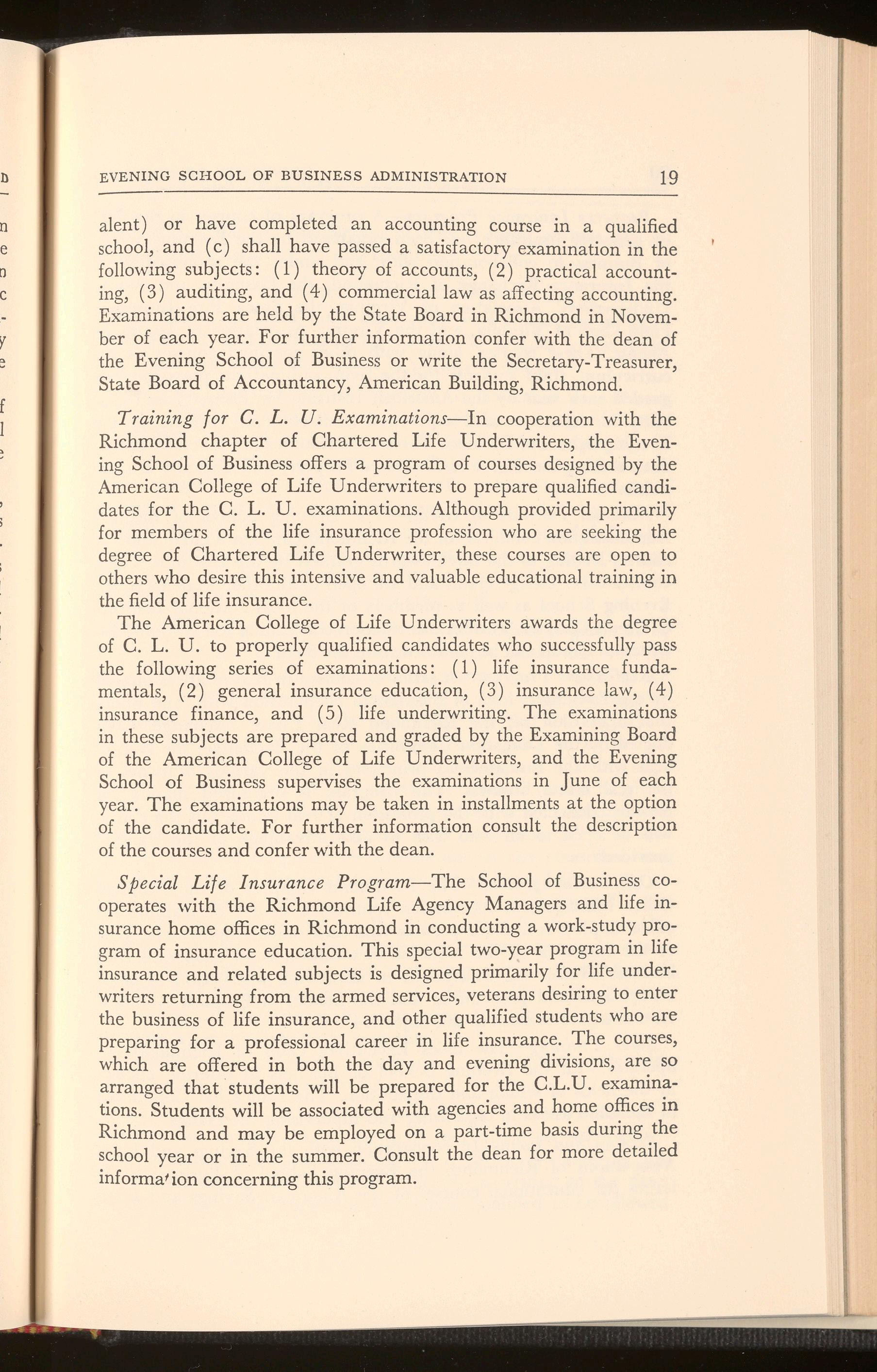
alent) or have completed an accounting course in a qualified school, and ( c) shall have passed a satisfactory examination in the following subjects: ( 1) theory of accounts, ( 2) practical accounting, ( 3) auditing, and (4) commercial law as affecting accounting. Examinations are held by the State Board in Richmond in November of each year. For further information confer with the dean of the Evening School of Business or write the Secretary-Treasurer, State Board of Accountancy, American Building, Richmond.
Training for C. L. U. Examinations-In cooperation with the Richmond chapter of Chartered Life Underwriters, the Evening School of Business offers a program of courses designed by the American College of Life Underwriters to prepare qualified candidates for the C. L. U. examinations. Although provided primarily for members of the life insurance profession who are seeking the degree of Chartered Life Underwriter, these courses are open to others who desire this intensive and valuable educational training in the field of life insurance.
The American College of Life Underwriters awards the degree of C. L. U. to properly qualified candidates who successfully pass the following series of examinations: ( 1) life insurance fundamentals, (2) general insurance education, (3) insurance law, (4) insurance finance, and ( 5) life underwriting. The examinations in these subjects are prepared and graded by the Examining Board of the American College of Life Underwriters, and the Evening School of Business supervises the examinations in June of each year. The examinations may be taken in installments at the option of the candidate. For further information consult the description of the courses and confer with the dean.
Special Life Insurance Program-The School of Business cooperates with the Richmond Life Agency Managers and life insurance home offices in Richmond in conducting a work-study program of insurance education. This special two-year program in life insurance and related subjects is designed primarily for life underwriters returning from the armed services, veterans desiring to enter the business of life insurance, and other qualified students who are preparing for a professional career in life insurance. The courses, which are offered in both the day and evening divisions, are so arranged that students will be prepared for the C.L.U. examinations. Students will be associated with agencies and home offices in Richmond and may be employed on a part-time basis during the school year or in the summer. Consult the dean for more detailed informa 1 ion concerning this program.
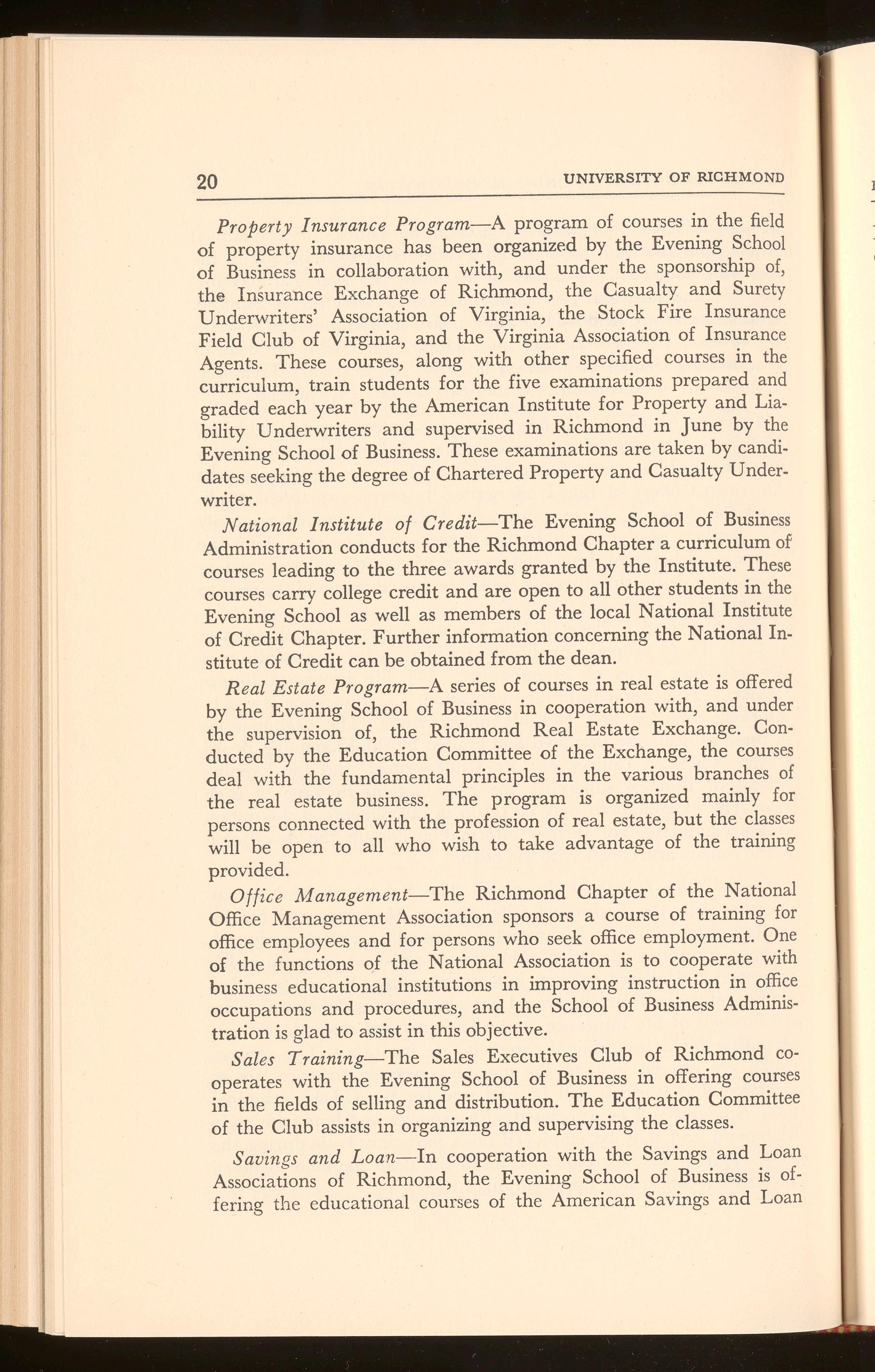
Property Insurance Program-A program of courses in the field of property insurance has been organized by the Evening School of Business in collaboration with, and under the sponsorship of, the Insurance Exchange of Richmond, the Casualty and Surety Underwriters' Association of Virginia, the Stock Fire Insurance Field Club of Virginia, and the Virginia Association of Insurance Agents. These courses, along with other specified courses in the curriculum, train students for the five examinations prepared and graded each year by the American Institute for Property and Liability Underwriters and supervised in Richmond in June by the Evening School of Business. These examinations are taken by candidates seeking the degree of Chartered Property and Casualty Underwriter.
National Institute of Credit-The Evening School of Business Administration conducts for the Richmond Chapter a curriculum of courses leading to the three awards granted by the Institute. These courses carry college credit and are open to all other students in the Evening School as well as members of the local National Institute of Credit Chapter. Further information concerning the National Institute of Credit can be obtained from the dean.
Real Estate Program-A series of courses in real estate is offered by the Evening School of Business in cooperation with, and under the supervision of, the Richmond Real Estate Exchange. Conducted by the Education Committee of the Exchange, the courses deal with the fundamental principles in the various branches of the real estate business. The program is organized mainly for persons connected with the profession of real estate, but the classes will be open to all who wish to take advantage of the training provided.
Office Management-The Richmond Chapter of the National Office Management Association sponsors a course of training for office employees and for persons who seek office employment. One of the functions of the National Association is to cooperate with business educational institutions in improving instruction in office occupations and procedures, and the School of Business Administration is glad to assist in this objective.
Sales Training-The Sales Executives Club of Richmond cooperates with the Evening School of Business in offering courses in the fields of selling and distribution. The Education Committee of the Club assists in organizing and supervising the classes.
Savings and Loan-In cooperation with the Savings and Loan Associations of Richmond, the Evening School of Business is offering the educational courses of the American Savings and Loan

Institute. Satisfactory completion of these courses entitles the mdividual to the awards from the Institute.
Class Hours-Classes meet once each week, beginning at 7: 00 or 7: 30 P. M. and continuing for 100 or 150 minutes, unless stipulated otherwise in the description of particular courses.
Grading-The standing of students is indicated as follows: A (95-100%) excellent work; B (88-94%) very good work; C (80-87%) fair or average work; D (75-79%) just passing; E (65-74 % ) unsatisfactory work, incurring a condition which may be removed through a re-ex:=imination; F (below 65%) a failure, without the right to a re-examination; I, incomplete because of excused absence from final examination or because of failure to submit required work during the semester; N, no credit because of excessive or unexcused absences. Students who drop a class without notifying the office will receive a grade of F.
Removal of Conditions-A student who receives a grade of E, thereby incurring a condition in a semester's work, may remove the condition and obtain credit for the course ( 1) by repeating the course successfully the following year, ( 2) by taking the regular examination in the course the following year and making a sufficiently high mark to raise the original term grade to D, or (3) by taking a special re-examination and making a sufficiently high mark to raise his grade to D. Special re-examinations will be given on specified dates in March and September, upon authorization of the dean and upon the payment of a fee of one dollar. A student is permitted only one re-examination on any condition, and if he is unsuccessful the condition is converted into a failure.
A student who receives a grade of I may obtain credit for the course ( 1) by taking the regular examination in the course the following year (2) by taking a special re-examination to be given on specified dates in March and September, upon authorization of the dean and without the payment of a fee, or ( 3) in the instance of incompleted class work, by submitting the required work immediately after the close of the semester.
A student who receives a grade of F or N must repeat the course successfully to obtain credit.
Absences-No credit can be given for a course if, during a semester, the student has more than four absences, whether excused or unexcused and including those caused by entering the course late, unless the instructor indicates in writing to the dean that he believes the student is sufficiently qualified to be allowed

credit for the course. Unexcused absences should result in an appropriate lowering of the student's grade, to be determined by the instructor. The grounds for excusing absences are ( 1) illness, (2) a personal obligation recognized as valid by the instructor, and ( 3) religious holidays.
Honors and Scholarships-Five scholarships will be awarded in June, 1947, by the Board of Trustees of the University of Richmond to those students with the best scholastic record in the following five classes: Accounting I, Business English, Business Law, Economics I, and Effective Speaking. These scholarships will be awarded on the basis of academic records, determined by the dean with the advice of the faculty. Each scholarship will entitle the recipient to free tuition in any one - course taken in the Evening School of Business during the session of 1948-49.
The T. Coleman Andrews & Company prize of twenty-five dollars, established by the company whose name it bears, will be awarded to the student in any of the advanced classes in accounting who is deemed by the dean and the faculty to be best equipped by character, personality, intellectual capacity, and broad educational training to succeed in the profession of accountancy.
Each year the Life Agency Managers of Richmond award a prize to the student in the Evening School who attains the highest scholastic standing in the life insurance classes.
The Sales Executives Club of Richmond awards a prize to the student who attains the highest standing in the salesmanship class.
The Richmond Chapter of the National Office Management Association awards a prize to the student receiving the highest grade in the office management class.
The member of the American Institue of Banking who receives the highest grade in each A.LB. class will be awarded first honors in the course, provided his grade is above 87%.
Library-Students in the Evening School of Business Administration are given access to the library of this division of the University of Richmond and to the library facilities of other divisions of the University. A large reading room and a specialized library dealing with economic subjects and current business affairs are maintained especially for the use of students of the Evening School of Business. Students are encouraged to broaden the scope of their training by the use of current periodical and pamphlet material made available in the School library.
A special collection of books in accounting and finance, known as the Accountants' Library of Richmond, is maintained in the Evening School by the Richmond Society of Public Accountants. The

books in the collection are available to all accountants and students of accounting in the city.
The Richmond Chapter of the National Office Management Association has also established in the Evening School a collection of books, pamphlets, and research materials in the field of office management, available to all who may be interested.
Vocational Counseling and Placement of Students-To help students find the vocation for which they are best suited, members of the staff of the University of Richmond will conduct vocational aptitude tests which may be taken by students registered in the Evening School of Business. The results of these scientific tests, combined with individual discussions with students, will be used as the basis for giving students who desire advice all possible assistance in determining the field of business they may wish to enter and for which they may be fitted.
Although no promise is made by the School of Business to secure positions for its students, an effort is made to find places for those who inform the School authorities of their desire to obtain new positions and who have made a good record in the School. Gratifying success has attended the efforts to aid capable students in making connections with business firms.
Student Activities-Students of the Evening School of Business Administration are students of the University of Richmond. The traditions of the other colleges of the University are well known in the city. Tradition is also present in the spirit of the personnel of this college, and it is the policy of the administration and faculty to foster any proper organizations and activities that the students should undertake.
Location-The Evening School of Business Administration is located in Columbia Building at the corner of West Grace Street and North Lombardy Street.
The tuition is $7.50 per semester hour. The fee for a two-hour course is $15.00 and for a three-hour course is $22.50 per semester These fees are payable each semester in advance, and students are expected to settle their accounts at the time of registration.
The tuition for the C.P.A. Coach Class which begins August 18, 1947 is $40.00.
Students are matriculated for a full semester. In case of withdrawal, for whatever cause, no refund of fees or any part of fees is made.
A veteran should have his Certificate of Eligibility and Entitlement when he registers. If he does not have this certificate, he is requested to bring his discharge papers and Notice of Separation from the Service to the Evening School of Business Administration at the time of registration.
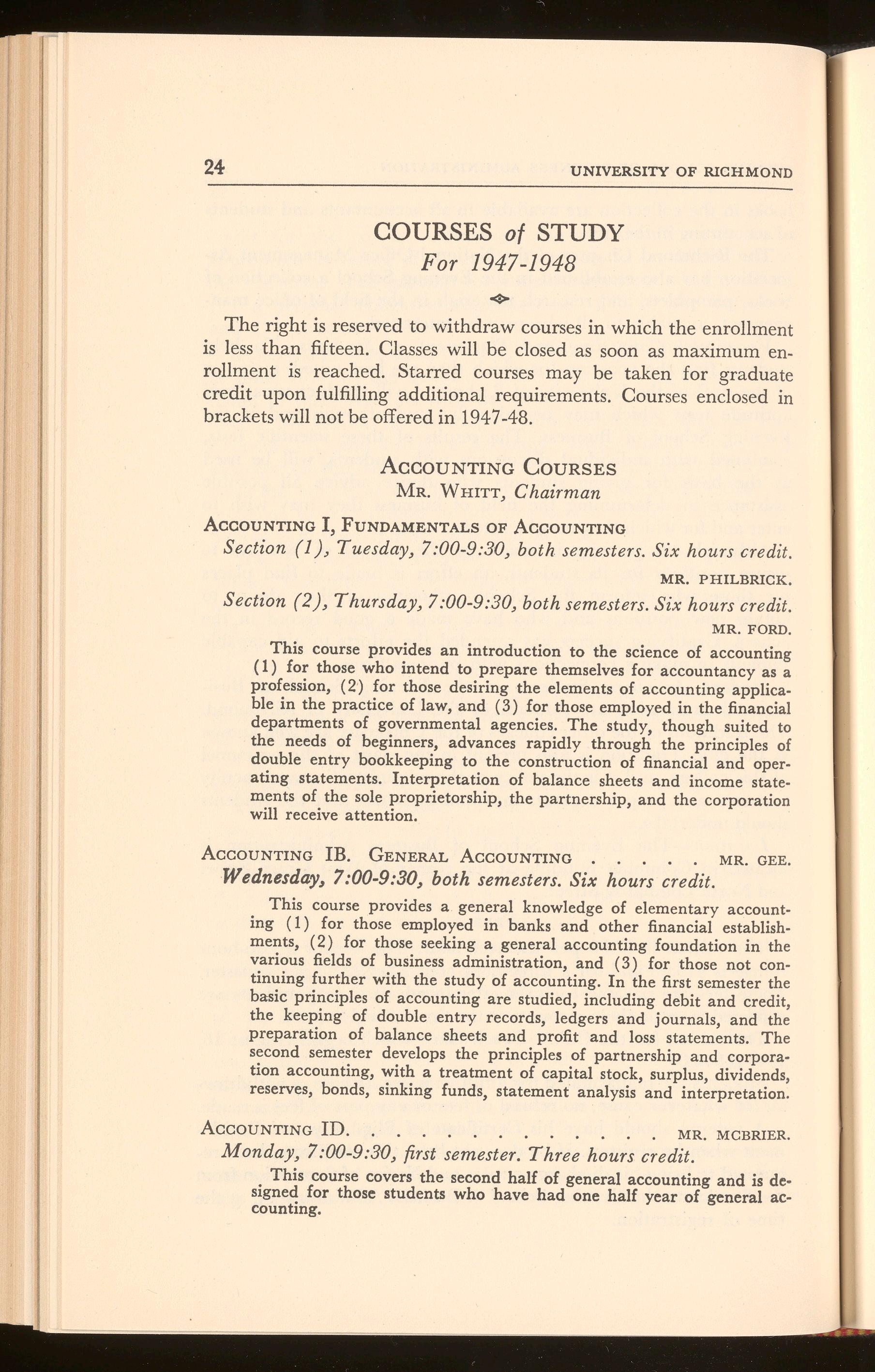
UNIVERSITY OF RICHMOND
For 1947-1948
The right is reserved to withdraw courses in which the enrollment is less than fifteen. Classes will be closed as soon as maximum enrollment is reached. Starred courses may be taken for graduate credit upon fulfilling additional requirements. Courses enclosed in brackets will not be offered in 1947-48.
MR. WHITT, Chairman
AccouNTING I, FUNDAMENTALS OF AccouNTING
Section ( 1), Tuesday, 7 :00-9:30, both semesters. Six hours credit.
MR. PHILBRICK.
Section (2), Thursday, 7:00-9:30, both semesters. Six hours credit.
MR. FORD.
This course provides an introduction to the science of accounting ( 1) for those who intend to prepare themselves for accountancy as a profession, (2) for those desiring the elements of accounting applica- ble in the practice of law, and ( 3) for those employed in the financial departments of governmental agencies. The study, though suited to the needs of beginners, advances rapidly through the principles of double entry bookkeeping to the construction of financial and operating statements. Interpretation of balance sheets and income state- ments of the sole proprietorship, the partnership, and the corporation will receive attention.
AccouNTING IB. GENERAL AccouNTING
MR. GEE. Wednesday, 7:00-9:30, both semesters. Six hours credit.
This course provides a general knowledge of elementary account- ing ( 1) for those employed in banks and other financial establish- ments, (2) for those seeking a general accounting foundation in the various fields of business administration, and ( 3) for those not con- tinuing further with the study of accounting. In the first semester the basic principles of accounting are studied, including debit and credit, the keeping of double entry records, ledgers and journals, and the preparation of balance sheets and profit and loss statements. The second semester develops the principles of partnership and corpora• tion accounting, with a treatment of capital stock, surplus, dividends, reserves, bonds, sinking funds, statement analysis and interpretation.
AccouNTING ID.
MR. MCBRIER. Monday, 7:00-9:30, first semester. Three hours credit.
This course covers the second half of general accounting and is designed for those students who have had one half year of general ac- counting.
AccouNTING II. INTERMEDIATE AccouNTING • . MR WHITT. Monday, 7:00-9:30, both semesters. Six hours credit.
To enter this course a student must have completed an introd11ctory course in the science of accounting. The study of accounting for !he corporate f?rm of organiz~tion, begun in elementary accounting, is contmued with the accountmg procedure applicable to the manufacturing type of_business. !he voucher system and the self-balancing factory ledger will be studied. Balance sheets and income statements will be made comparative; the statement of application of funds and the statement showing the causes of variation in net profit as between years will be introduced.
AccouNTING IIC. INTERMEDIATE
MR. CLEMENT. Wednesday, 7 :00-9:30, first semester. Three hours credit.
This course covers the second half of intermediate accounting and is designed for those students who have completed the first half of the course.
* AccouNTING III. ADVANCED AccouNTING
MR ROWLETT. Tuesday, 7 :00-9:30, both semesters. Six hours credit.
This course is intended primarily to meet the requirements of students who expect to enter the accounting profession. To enroll for this course students must have completed Fundamentals of Accounting and Intermediate Accounting. This course covers many of the major subjects of higher accounting, with special emphasis given to partnership and estate accounting, to consolidations and mergers, and to the rendition of consolidated balance sheets and consolidated profit and loss statements; several meetings will be devoted to budgetary and municipal accounting.
* AccouNTING IV . TAX AccouNTING
Friday, 7; 00-9; 30, first semester. Three hours credit.
MR. HEBERLE.
The student is provided with a complete copy of the entire law now in effect and with thirty chapters of accurate, understandable explanations. Of these, twenty-seven chapters are devoted to income taxes, and the remaining chapters deal with social security, estate, gift, excise, and miscellaneous taxes. A reprint of the latest Treasury Department Regulations identifies those taxes affected by subsequent legislation and, wherever necessary, includes explanations. Carefully planned reading assignments are provided, covering law, regulations, and explanations.
*AccouNTING V. AUDITING
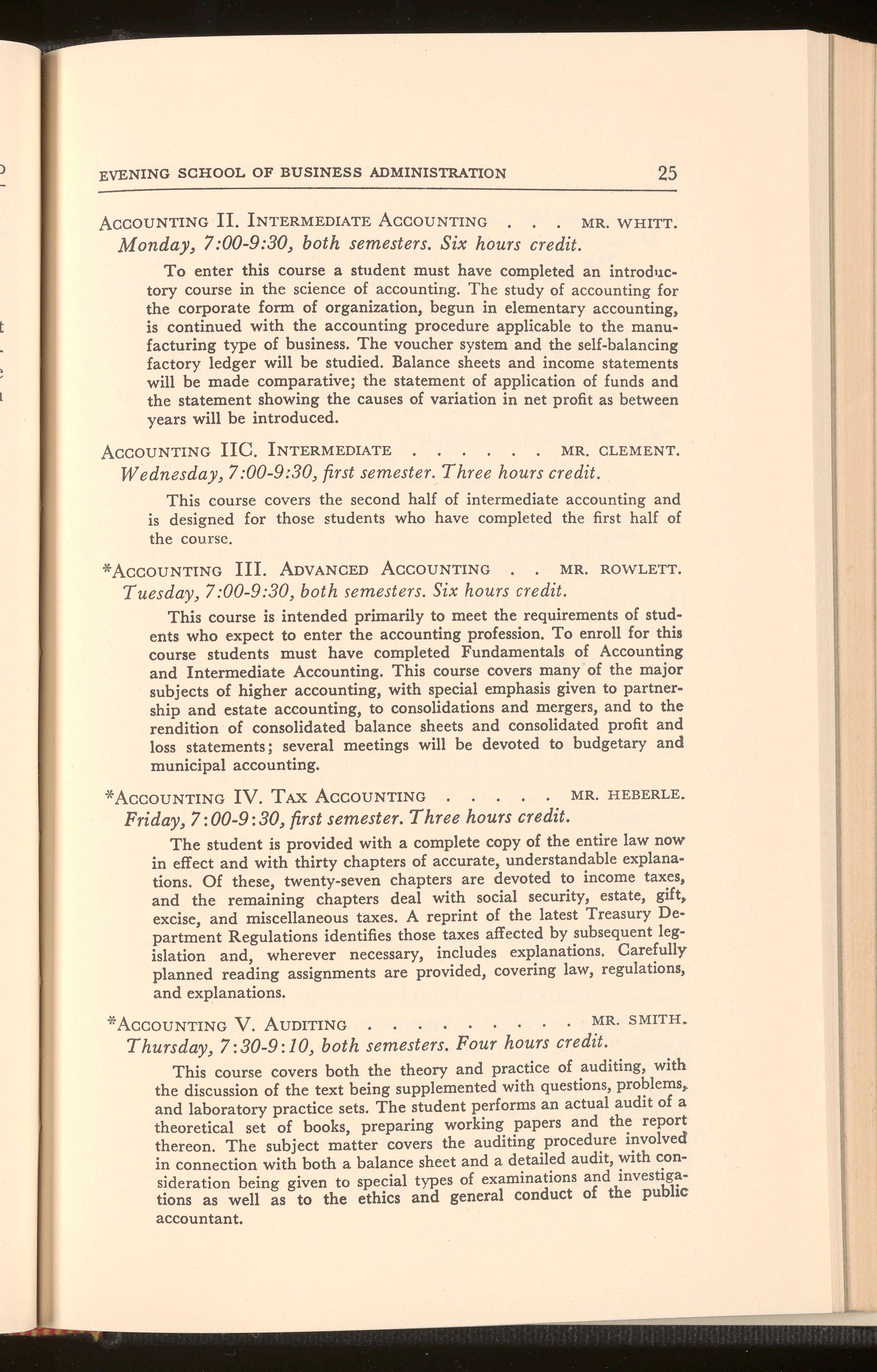
MR SMITH.
Thursday, 7: 30-9: 10, both semesters. Four hours credit.
This course covers both the theory and practice of auditing, with the discussion of the text being supplemented with questions, problems, and laboratory practice sets. The student performs an actual audit of a theoretical set of books, preparing working papers and the report thereon. The subject matter covers the auditing procedure involved in connection with both a balance sheet and a detailed audit, with consideration being given to special types of examinations and investig~tions as well as to the ethics and general conduct of the public
UNIVERSITY OF RICHMOND
-X·AccouNTING VI. CosT AccouNTING MR. DRUMMOND. Monday, 7:00-9:30, both semesters. Six hours credit.
This course will cover methods of accounting for the various elements of production, distribution, and financial cost, with especial emphasis on the use of cost information in the administration and control of the business enterprise. Through the medium of lectures, the study of a text, and the solution of problems, the student is given a thorough knowledge of cost accounting principles and their application to manufacturing, wholesale, and retail establishments.
'-<-AccouNTING VII, GovERNMENTAL AND FuND AccouNTING MR. MITCHELL.
Friday, 7 :00-9:30, first semester. Three hours credit.
This course will cover the basic principl es of governmental accounting as they apply to local, state and the Federal government. It will also cover the basic principles of accounting as applied to private institutions such as universities and colleges. The course is designed to assist students in preparing for the C.P.A. examinations as well as to assist those individuals already employed in the various financial dP,partments and bureaus of the government.
[AccouNTING VIII. SYSTEMS)
[CoNTEMPORARY AccouNTING]
C.P.A. REVIEW
Friday, 7 :00-9:30, second semester. No college credit.
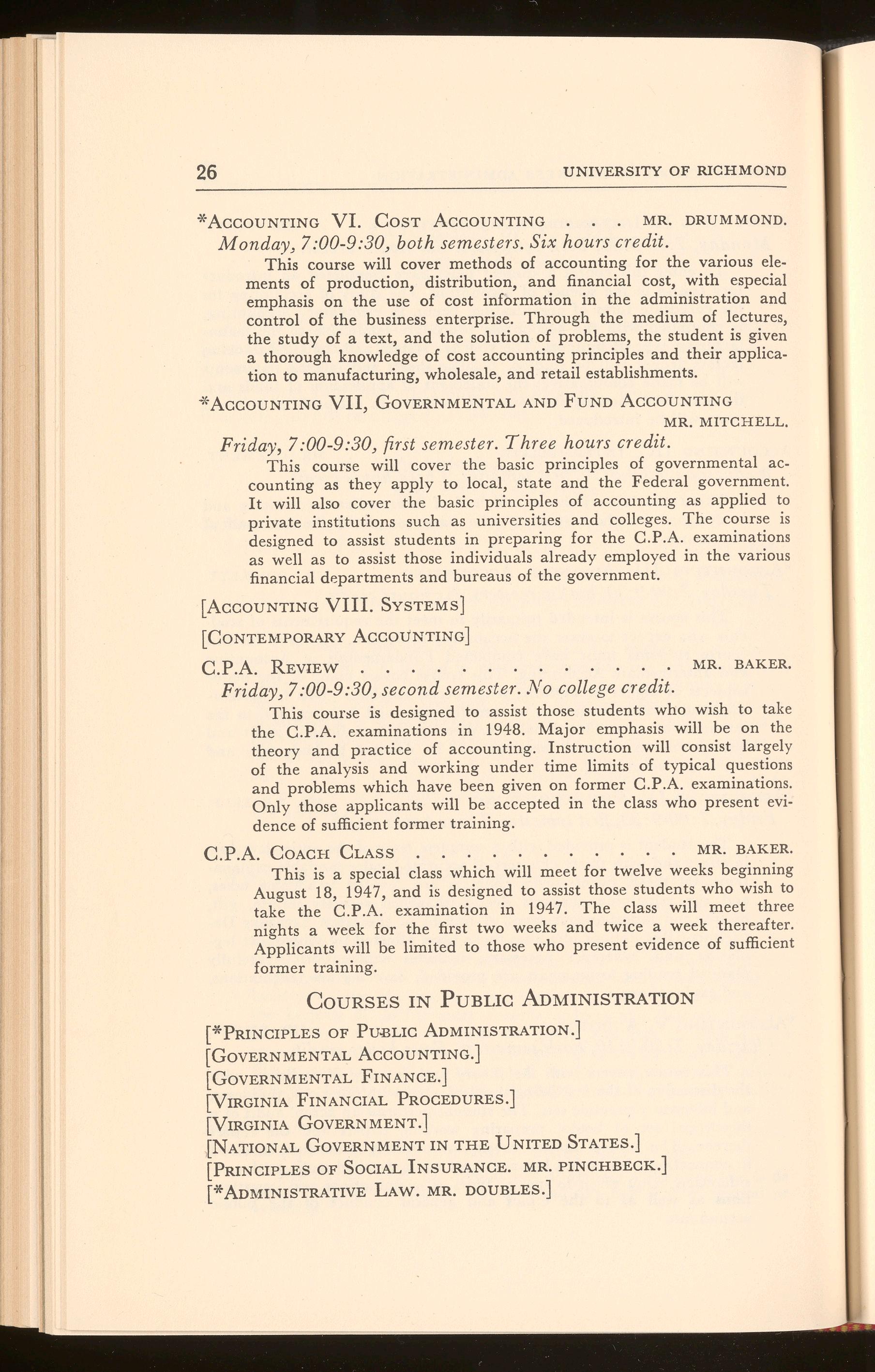
MR. BAKER.
This course is designed to assist those students who wish to take the C.P.A. examinations in 1948 Major emphasis will be on the theory and practice of accounting. Instruction will consist largely of the analysis and working under time limits of typical questions and problems which have been given on former C P.A examinations. Only those applicants will be acc epted in the class who present evidence of sufficient former training
MR. BAKER
C . P.A. COACH CLASS
Thi, is a special class which will meet for twelve weeks beginning August 18, 1947, and is designed to assist those students who wish to take the C.P.A. examination in 1947. The class will meet thre e nights a week for the first two weeks and twice a week thereafter . Applicants will be limited to those who present evidence of sufficient former training.
[*PRINCIPLES OF PU-BLIC ADMINISTRATION.]
[GOVERNMENTAL ACCOUNTING.]
[GOVERNMENTAL FINANCE.]
[VIRGINIA FINANCIAL PROCEDURES.]
[VIRGINIA GOVERNMENT.]
[NATIONAL GOVERNMENT IN THE UNITED STATES.]
[PRINCIPLES OF SOCIAL INSURANCE. MR. PINCHBECK.]
[*ADMINISTRATIVE LAW. MR. DOUBLES.]
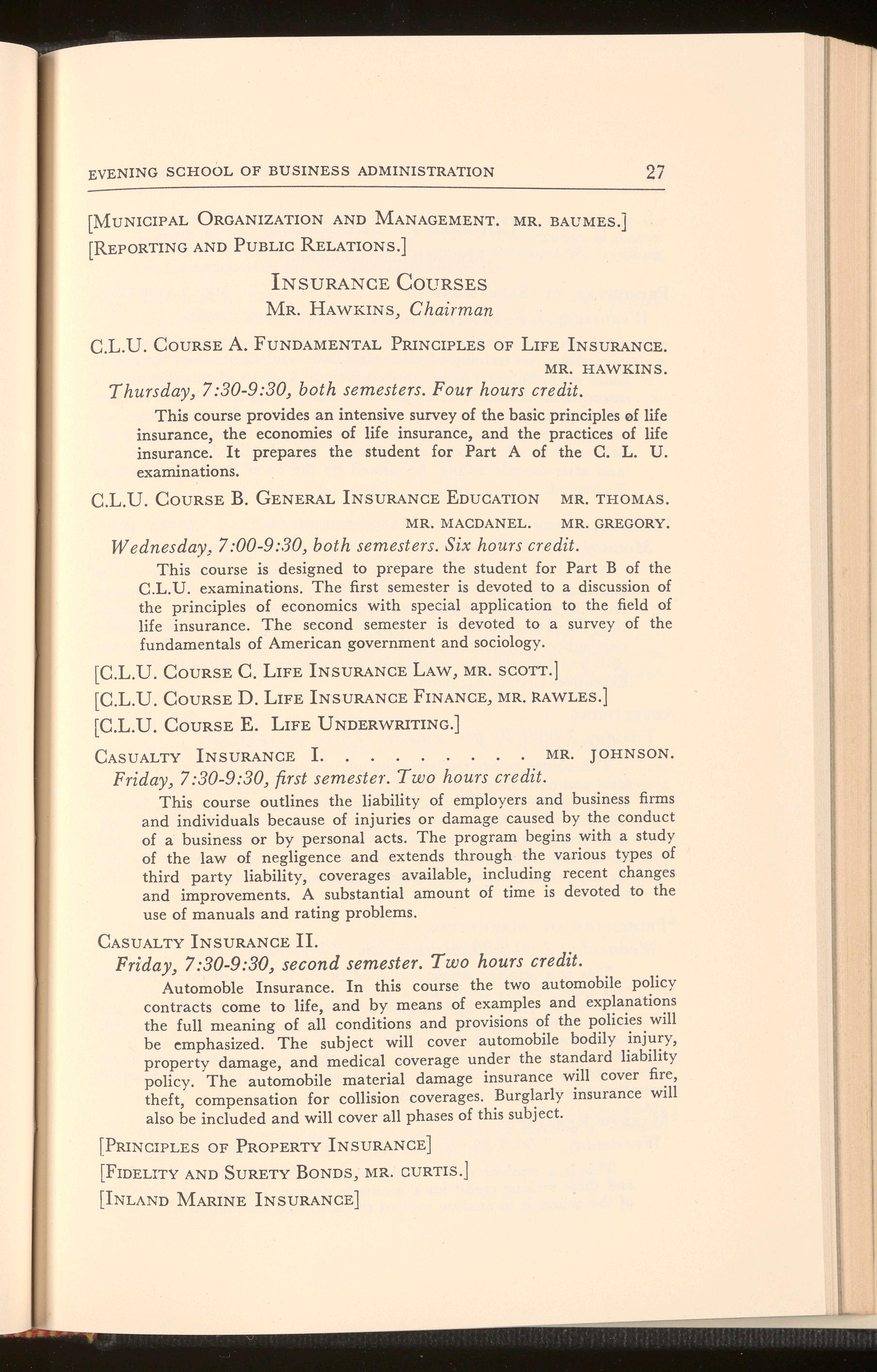
EVENING SCHOOL OF BUSINESS ADMINISTRATION
[MUNICIPAL ORGANIZATION AND MANAGEMENT. MR. BAUMES.] [REPORTING AND PUBLIC RELATIONS.]
MR. HAWKINS, Chairman
C.L.U. COURSE A. FUNDAMENTAL PRINCIPLES OF LIFE INSURANCE. MR. HAWKINS.
Thursday, 7:30-9:30, both semesters. Four hours credit.
This course provides an intensive survey of the basic principles 0f life insurance, the economies of life insurance, and the practices of life insurance. It prepares the student for Part A of the C. L. U. examinations.
C.L.U. COURSE B. GENERAL INSURANCE EDUCATION MR. THOMAS. MR. MACDANEL. MR. GREGORY.
Wednesday, 7:00-9:30, both semesters. Six hours credit.
This course is designed to prepare the student for Part B of the C.L.U. examinations. The first semester is devoted to a discussion of the principles of economics with special application to the field of life insurance. The second semester is devoted to a survey of the fundamentals of American government and sociology.
[C.L.U. COURSE C. LIFE INSURANCE LAW, MR. SCOTT.]
[C.L.U. COURSED. LIFE INSURANCE FINANCE, MR. RAWLES.]
[C.L.U. COURSE E. LIFE UNDERWRITING.]
CASUALTY INSURANCE l. MR. JOHNSON.
Friday, 7:30-9:30, first semester. Two hours credit.
This course outlines the liability of employers and business firms and individuals because of injuries or damage caused by the conduct of a business or by personal acts. The program begins with a study of the law of negligence and extends through the various types of third party liability, coverages available, including recent changes and improvements. A substantial amount of time is devoted to the use of manuals and rating problems.
CASUALTY INSURANCE II. Friday, 7:30-9:30, second semester. Two hours credit.
Automoble Insurance. In this course the two automobile policy contracts come to life, and by means of examples and explanations the full meaning of all conditions and provisions of the policies will be emphasized. The subject will cover automobile bodily injury, property damage, and medical coverage under the sta1:dard liability policy. The automobile material damage insurance will cover fire, theft, compensation for collision coverages. Burglarly insurance will also be included and will cover all phases of this subject.
[PRINCIPLES OF PROPERTY INSURANCE]
[FIDELITY AND SURETY BONDS, MR. CURTIS.]
[INLAND MARINE INSURANCE]
UNIVERSITY OF RICHMOND
MR. MILLER, Chairman
PRINCIPLES OF SALESMANSHIP
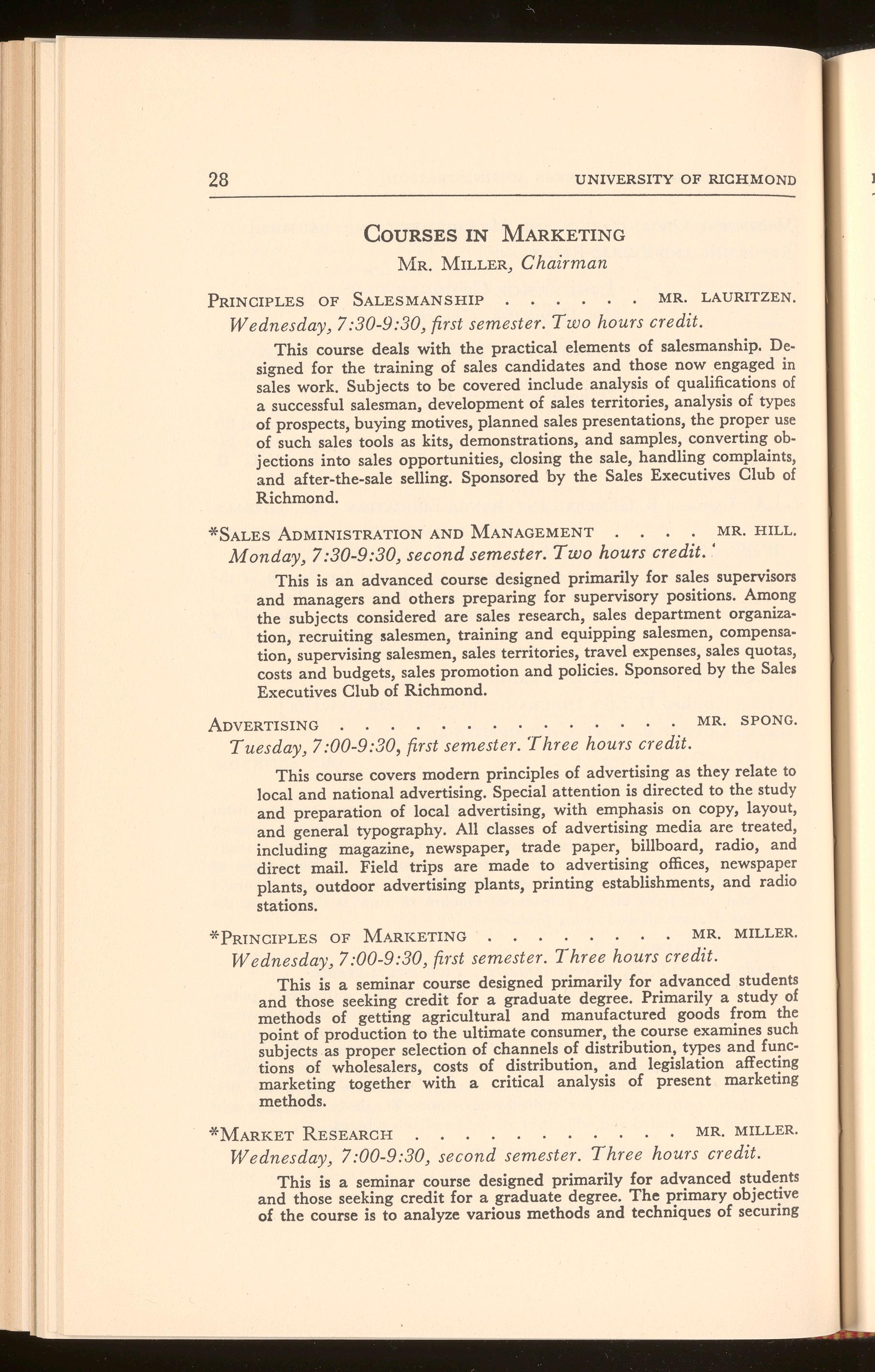
MR. LAURITZEN.
Wednesday, 7:30-9:30, first semester. Two hours credit.
This course deals with the practical elements of salesmanship. Designed for the training of sales candidates and those now engaged in sales work. Subjects to be covered include analysis of qualifications of a successful salesman, development of sales territories, analysis of types of prospects, buying motives, planned sales presentations, the proper use of such sales tools as kits, demonstrations, and samples, converting objections into sales opportunities, closing the sale, handling complaints, and after-the-sale selling. Sponsored by the Sales Executives Club of Richmond.
*SALES ADMINISTRATION AND MANAGEMENT
MR. HILL. Monday, 7:30-9:30, second semester. Two hours credit.'
This is an advanced course designed primarily for sales supervisors and managers and others preparing for supervisory positions. Among the subjects considered are sales research, sales department organization, recruiting salesmen, training and equipping salesmen, compensation, supervising salesmen, sales territories, travel expenses, sales quotas, costs and budgets, sales promotion and policies. Sponsored by the Sale, Executives Club of Richmond.
ADVERTISING
MR. SPONG. Tuesday, 7 :00-9:30, first semester. Three hours credit.
This course covers modern principles of advertising as they relate to local and national advertising. Special attention is directed to the study and preparation of local advertising, with emphasis on copy, layout, and general typography. All classes of advertising media are treated, including magazine, newspaper, trade paper, billboard, radio, and direct mail. Field trips are made to advertising offices, newspaper plants, outdoor advertising plants, printing establishments, and radio stations.
*PRINCIPLES OF MARKETING
MR. MILLER Wednesday, 7:00-9:30, first semester. Three hours credit.
This is a seminar course designed primarily for advanced students and those seeking credit for a graduate degree. Primarily a study of methods of getting agricultural and manufactured goods from the point of production to the ultimate consumer, the course examines such subjects as proper selection of channels of distribution, types and functions of wholesalers, costs of distribution, and legislation affecting marketing together with a critical analysis of present marketing methods.
*MARKET RESEARCH
MR. MILLER . Wednesday, 7 :00-9:30, second semester. Three hours credit.
This is a seminar course designed primarily for advanced students and those seeking credit for a graduate degree. The primary objective of the course is to analyze various methods and techniques of securing
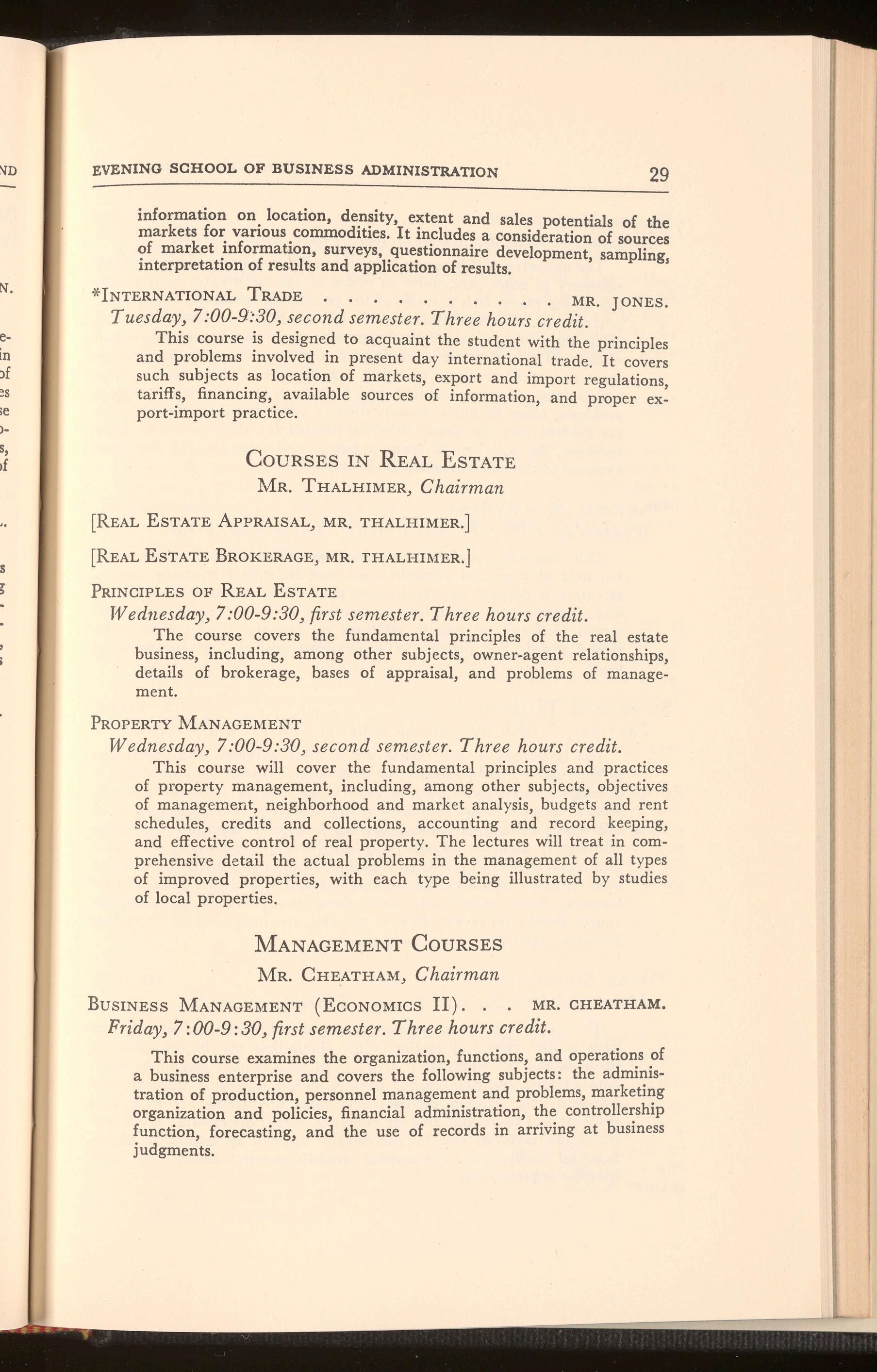
information on_ location, de;11~ity,e~tent and sales potentials of the markets fo~ various _commodities. It m~lude~ a consideration of sources ?f market _mformation, surveys, _que_stionnaire development, sampling, mterpretation of results and application of results.
*INTERNATIONAL TRADE • • • • • . . • • • MR. JONES. Tuesday, 7:00-9:30, second semester. Three hours credit.
This course !s designe_d to acquaint the student with the principles and problems mvolved m present day international trade. It covers sue~ subjects _as locat~on of markets, export and import regulations, tanff~, financmg,_ available sources of information, and proper export-import practice.
MR. THALHIMER, Chairman
[REAL ESTATE APPRAISAL, MR. THALHIMER.]
[REAL ESTATE BROKERAGE, MR. THALHIMER.j
PRINCIPLES OF REAL ESTATE
Wednesday, 7 :00-9:30, first semester. Three hours credit. The course covers the fundamental principles of the real estate business, including, among other subjects, owner-agent relationships, details of brokerage, bases of appraisal, and problems of management.
PROPERTY MANAGEMENT
Wednesday, 7:00-9:30, second semester. Three hours credit.
This course will cover the fundamental principles and practices of property management, including, among other subjects, objectives of management, neighborhood and market analysis, budgets and rent schedules, credits and collections, accounting and record keeping, and effective control of real property. The lectures will treat in comprehensive detail the actual problems in the management of all types of improved properties, with each type being illustrated by studies of local properties.
MR. CHEATHAM, Chairman
BUSINESS MANAGEMENT (ECONOMICS II). . MR. CHEATHAM.
Friday, 7 :00-9: 30, first semester. Three hours credit.
This course examines the organization, functions, and operations of a business enterprise and covers the following subjects: the administration of production, personnel management and problems, marketi~g organization and policies, financial administration, the controllersh1p function forecasting and the use of records in arriving at business judgmeZ:ts. '
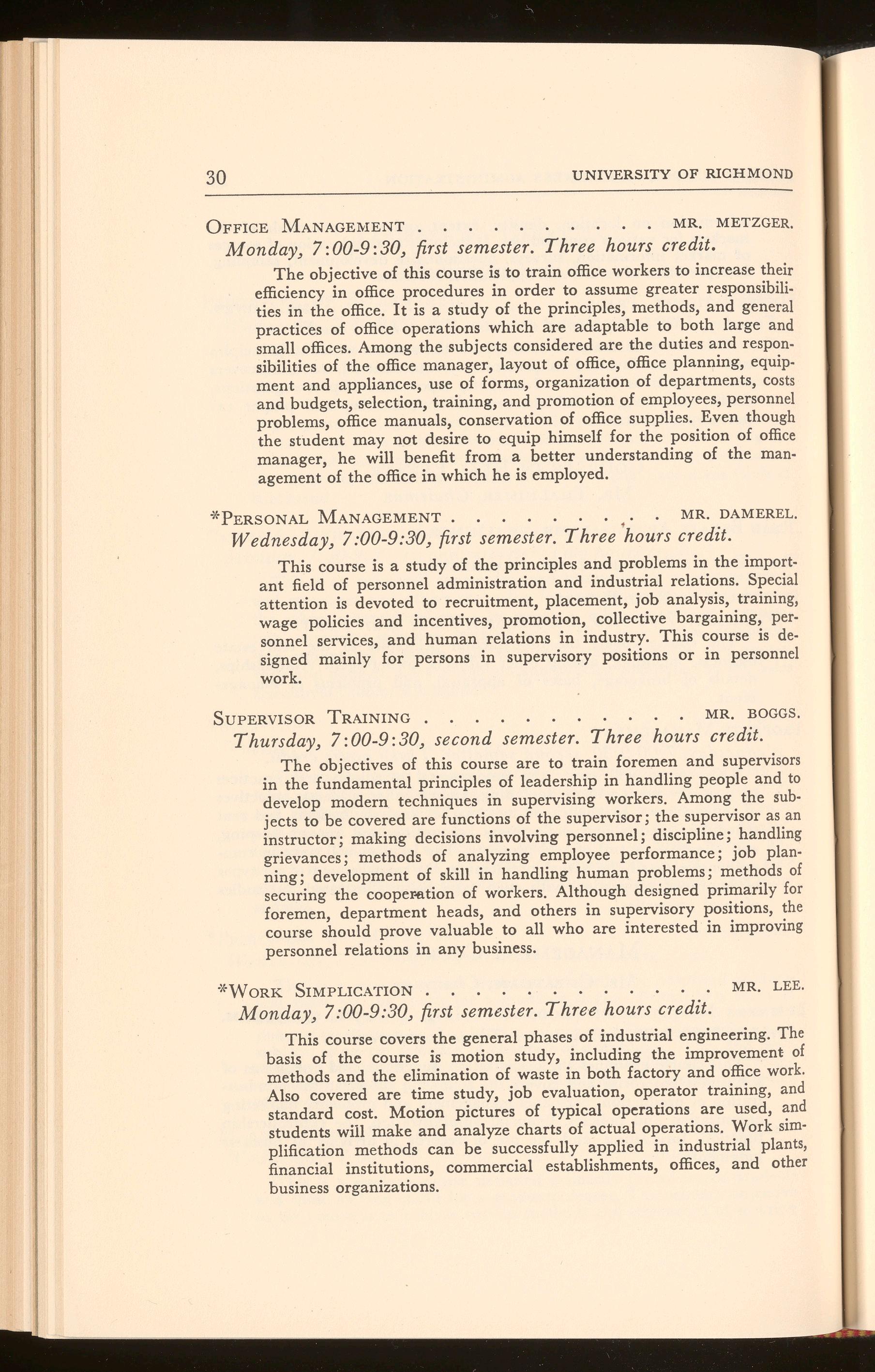
UNIVERSITY OF RICHMOND
OFFICE MANAGEMENT . MR. METZGER. Monday, 7:00-9:30, first semester. Three hours credit.
The objective of this course is to train office workers to increase their efficiency in office procedures in order to assume greater responsibilities in the office. It is a study of the principles, methods, and general practices of office operations which are adaptable to both large and small offices. Among the subjects considered are the duties and responsibilities of the office manager, layout of office, office planning, equipment and appliances, use of forms, organization of departments, costs and budgets, selection, training, and promotion of employees, personnel problems, office manuals, conservation of office supplies. Even though the student may not desire to equip himself for the position of office manager, he will benefit from a better understanding of the management of the office in which he is employed.
*PERSONAL MANAGEMENT •
. • MR. DAMEREL. Wednesday, 7:00-9:30, first semester. Three 'hours credit.
This course is a study of the principles and problems in the important field of personnel administration and industrial relations. Special attention is devoted to recruitment, placement, job analysis, training, wage policies and incentives, promotion, collective bargaining, personnel services, and human relations in industry. This course is designed mainly for persons in supervisory positions or in personnel work.
SUPERVISOR TRAINING • MR. BOGGS. Thursday, 7:00-9:30, second semester. Three hours credit.
The objectives of this course are to train foremen and supervisors in the fundamental principles of leadership in handling people and to develop modern techniques in supervising workers. Among the subjects to be covered are functions of the supervisor; the supervisor as an instructor; making decisions involving personnel; discipline; handling grievances; methods of analyzing employee performance; job planning; development of skill in handling human problems; methods of securing the cooper-tition of workers. Although designed primarily for foremen, department heads, and others in supervisory positions, the course should prove valuable to all who are interested in improving personnel relations in any business.
"'"WORK SIMPLICATION • MR. LEE. Monday, 7:00-9:30, first semester. Three hours credit.
This course covers the general phases of industrial engineering. The basis of the course is motion study, including the improvement of methods and the elimination of waste in both factory and office work. Also covered are time study, job evaluation, operator training, and standard cost. Motion pictures of typical operations are used, and students will make and analyze charts of actual operations. Work sim• plification methods can be successfully applied in industrial plants, financial institutions, commercial establishments, offices, and other business organizations.
*JOB EVALUATION • . • . MR. HILL.
Thursday, 7:00-9:30, first semester. Three hours credit.
This course will cover the various problems involved in job evaluation. Emphasis will be placed upon the needs and purposes of job evaluation, proper procedures for evaluating jobs in relation to manpower requirements, the rating of jobs and a determination of the types of factors to be considered. Practical experience will be given in the evaluation of specific jobs.
SMALL BUSINESS MANAGEMENT
MR. SCARBOROUGH. Tuesday, 7:00-9:30, second semester. Three hours credit.
This course is designed to assist persons who wish to start a business by analyzing the various problems involved in the operations of a small busines. Emphasis will be placed upon type of organization, determination of need for the business, kind of business to start, location, buying, record keeping, merchandising, selection of personnel, legal obligations, and over-all management.
*INDUSTRIAL MANAGEMENT
Friday, 7:00-9:30, first semester. Three hours credit.
This is an introductory course which covers the various phases of management concerned with productions. It includes a discussion of such subjects as organization, plant location, materials handling, production control in intermittent and continuous manufacturing, stores product and process planning, quality control, time and motion study, personnel relations, purchasing and budgetary control.
*ADVANCED TIME STUDY

MR. LEE.
Monday, 7:00-9:30, second semester. Three hours credit. This course will cover the determination of time standards through time study and through methods-time measurement. The course will be primarily a laboratory course with students making time studies and methods-time analyses of actual shop jobs. The student must provide his own stop watch, preferably a watch with the dial divided into .01 minutes. Prerequisite, Work Simplification or its equivalent.
MR. THOMAS, Chairman
FUNDAMENTALS OF BANKING [Arn]
Section (1 ), Monday, 7:00-9:30, each semester. Three hours credit.
MR. GREEN.
Section (2), Friday, 7:00-9:30, first semester. Three hours credit.
MR. TAYLOR.
This course is a study of the practical, day-to-day operations of a bank, department by department. It explains the complex system by which it is possible to receive deposits, make loans, clear checks, ~nd perform safely and speedily the many functions of modern bankmg without excesssive cost.
UNIVERSITY OF RICHMOND
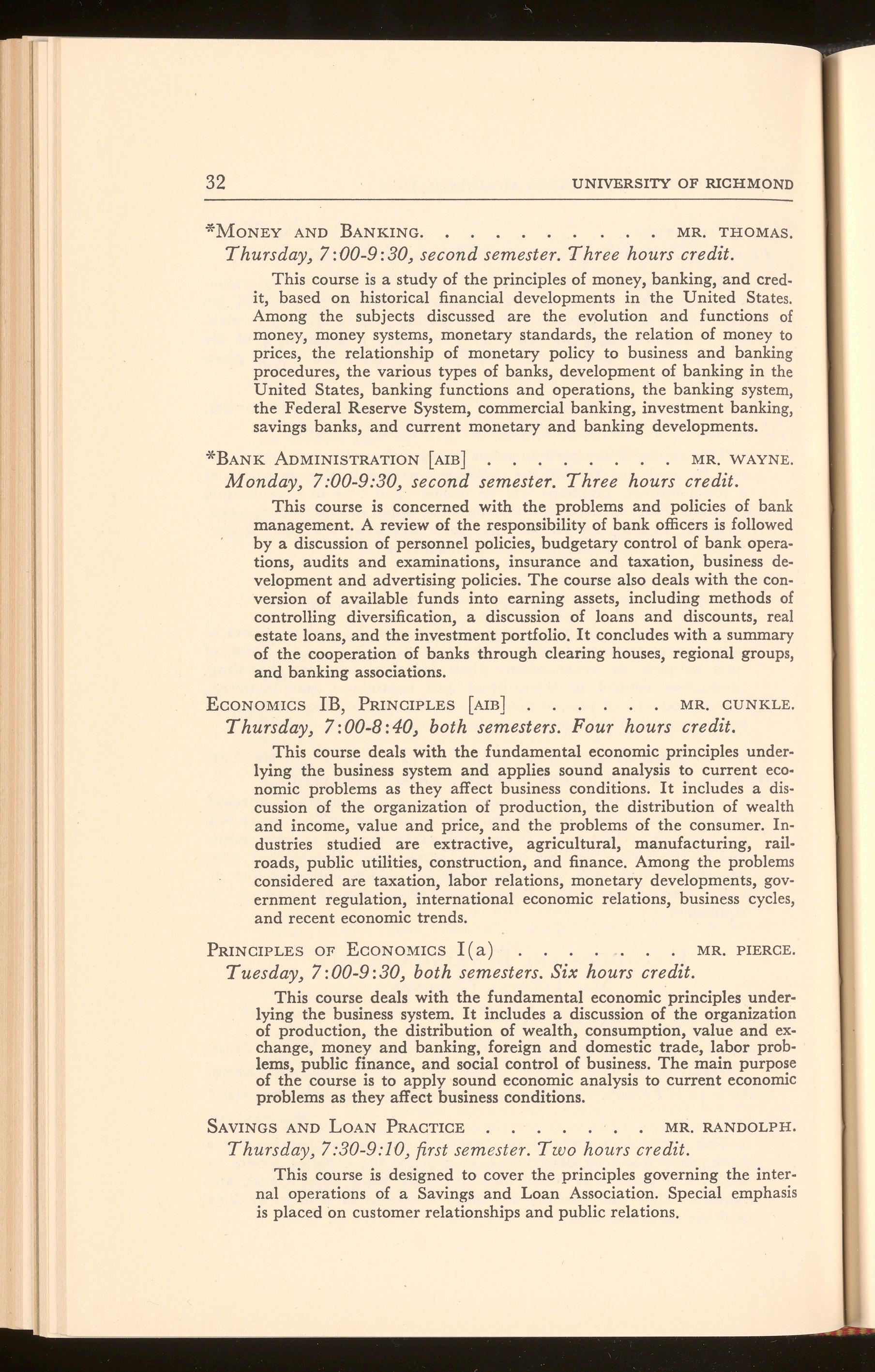
*MONEY AND BANKING
MR. THOMAS. Thursday, 7:00-9:30, second semester. Three hours credit
This course is a study of the principles of money, banking, and credit, based on historical financial developments in the United State s. Among the subjects discussed are the evolution and functions of money, money systems, monetary standards, the relation of money to prices, the relationship of monetary policy to business and banking procedures, the various types of banks, development of banking in the United States, banking functions and operations, the banking system , the Federal Reserve System, commercial banking, investment banking , savings banks, and current monetary and banking developments
*BANK ADMINISTRATION [AIB]
MR. WAYN E. Monday, 7:00-9:30, second semester. Three hours credit.
This course is concerned with the problems and policies of ban k management. A review of the responsibility of bank officers is followed by a discussion of personnel policies, budgetary control of bank operations, audits and examinations, insurance and taxation, business development and advertising policies. The course also deals with the conversion of available funds into earning assets, including methods of controlling diversification, a discussion of loans and discounts, real estate loans, and the investment portfolio. It concludes with a summary of the cooperation of banks through clearing houses, regional groups, and banking associations.
ECONOMICS IB, PRINCIPLES [AIB]
MR , CUNKL E. Thursday, 7:00-8:40, both semesters. Four hours credit.
This course deals with the fundamental economic principles unde rlying the business system and applies sound analysis to current economic problems as they affect business conditions . It includes a di scussion of the organization of production, the distribution of wealt h and income, value and price, and the problems of the consumer Industries studied are extractive, agricultural, manufacturing, railroads, public utilities, construction, and finance . Among the problem s considered are taxation, labor relations, monetary developments, government regulation, international economic relations, business cycl es, and recent economic trends
PRINCIPLES OF ECONOMICS J (a)
MR. PIERC E. Tuesday, 7 :00-9:30, both semesters. Six hours credit.
This course deals with the fundamental economic principles underlying the business system. It includes a discussion of the organization of production, the distribution of wealth, consumption, value and exchange, money and banking, foreign and domestic trade, labor problems, public finance, and social control of business. The main purpos e of the course is to apply sound economic analysis to current economic problems as they affect business conditions.
SAVINGS AND LOAN PRACTICE
MR. RANDOLPH, Thursday, 7 :30-9:10 , first sem ester. Two hours credit.
This course is designed to cover the principles governing the int ernal operations of a Savings and Loan Association . Special emphasi s is placed on customer relationships and public relations.
FEDERAL RESERVE PRINCIPLES • . MR. STORRS. T uesda) 1 7:00-9:30, second semester. Three hours credit.
This course will cover the development of the Federal Reserve System, its operations and its contributions to our economic life. Special emphasis will be placed upon the int erpretation of the Federal Reserve Statement. Students should have completed a course in Money and Banking before taking this course.
MR. DAVIS, Chairman
*CORPORATION FINANCE
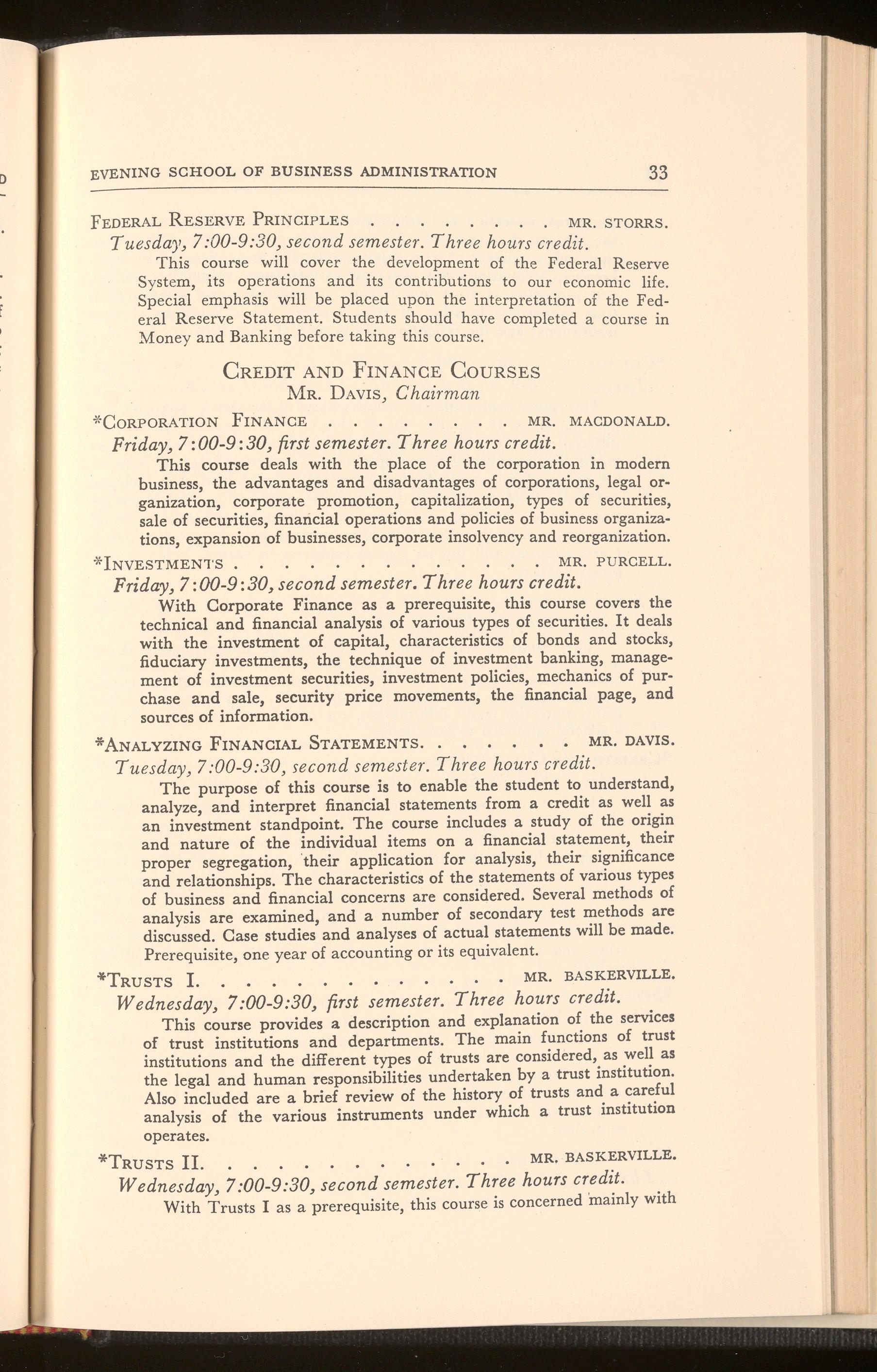
MR. MACDONALD.
Friday, 7:00-9:30, first semester. Three hours credit.
This course deals with the place of the corporation in modern business, the advantages and disadvantages of corporations, legal organization, corporate promotion, capitalization, types of securities, sale of securities, financial operations and policies of business organizations, expansion of businesses, corporate insolvency and reorganization.
·*INVESTMENTS • MR. PURCELL.
Friday, 7 :00-9 :30, second semester. Three hours credit.
With Corporate Finance as a prerequisite, this course covers the technical and financial analysis of various types of securities. It deals with the investment of capital, characteristics of bonds and stocks, fiduciary investments, the technique of investment banking, management of investment securities, investment policies, mechanics of purchase and sale, security price movements, the financial page, and sources of information.
*ANALYZING FINANCIAL STATEMENTS. .
MR. DAVIS.
Tuesday, 7 :00-9:30, second semester. Three hours credit.
The purpose of this course is to enable the student to understand, analyze, and interpret financial statements from a credit as well as an investment standpoint. The course includes a study of the origin and nature of the individual items on a financial statement, their proper segregation, 'their application for analysis, their significance and relationships. The characteristics of the statements of various types of business and financial concerns are considered. Several methods of analysis are examined, and a number of secondary test methods are discussed. Case studies and analyses of actual statements will be made. Prerequisite, one year of accounting or its equivalent.
*TRUSTS l, MR. BASKERVILLE, Wednesday, 7 :00-9:30, first semester. Three hours credit.
This course provides a description and explanation of the services of trust institutions and departments. The main functions of trust institutions and the different types of trusts are considered, as well as the legal and human responsibilities undertaken by a trust institution. Also included are a brief review of the history of trusts and a careful analysis of the various instruments under which a trust institution operates.
*TRUSTS II.
MR. BASKERVILLE, Wednesday, 7 :00-9:30, second semester. Three hours credit.
With Trusts I as a prerequisite, this course is concerned 'mainly with

UNIVERSITY OF RICHMOND
the actual operation and administration of a trust institution. Among the subjects discussed are: the acquisition of trust powers; organization and equipment of trust departments; the principles of trust bookkeeping, accounting, and checking performance; principles, policies, and procedure of trust investments; management and safeguards of trust properties; taxation of trust estates; public relations of trust institutions; and the economic significance of trust institutions.
*CONSUMER CREDIT [Arn]
MR. FOLEY. Tuesday, 7:00-9:30, first semester. Three hours credit.
This course deals with the various phases of instalment financing and personal loans. It examines the development of consumer lending, the different types of lending agencies, and the various kinds of consumer credit. The establishment and operation of a personal loan department are discussed, and methods of cost control are explained. Also included are methods of conducting the interview, application, and investigation, and the procedures followed in collections and solicitation of new business. Bank policies regarding consumer credit are considered. Guest lecturers will discuss special problems in various fields of consumer finance.
·X·CREDIT ADMINISTRATION [Arn]
MR. DAVIS. Tuesday, 7 :00-9:30, first semester. Three hours credit.
The purpose of this course is to develop an understanding of the procedures and problems involved in effective credit management. Consideration is given to various phases of the general credit structure. Among the topics treated are forms of credit, term loans, real estate loans, sources of credit information, analysis of credit applications, and a general approach to loan policy.
-i<·CREDITS AND COLLECTIONS .
MR. CRUMPLER. Tuesday, 7:00-9:30, first semester. Three hours credit.
This is a basic course for those who desire a working knowledge of credits and collections principles and functions. Consideration is given to the nature and function of credit; regulations and restrictions governing credit; relation of economic conditions to credit risks; bank and mercantile credit methods; types of credit instruments; government regulations of retail and installment credit; terms of sale and credit grants; sources of credit information and the analysis of credit risks; interpretation of credit reports; collection procedures and systems; and a brief introduction to assignments, extensions, and adjustments.
*SECURITY ANALYSIS
MR. MUNFORD. Thursday, 7:00-9:30, first semester. Three hours credit.
This course is designed to acquaint the student with the principles and procedures to be followed in analyzing securities to determine their investment qualifications. It will cover various types of bonds, preferred and common stocks. Various ratios of value in security analysis will be discussed. Prerequisite, one year of accounting or its equivalent.
*SECURITY MARKETS
Thursday, 7:00-9:30, second semester. Three hours credit.
This course is designed to familiarize the student with the methods
and procedures whereby corporate and government securities are marketed. It will include an analysis of the operations of the New York and other stock exchanges as well as the over-the-counter market. The place of the broker, the dealer, and others in the market will be discussed.
MR. REILLY, Chairman

BUSINESS LAW
A1onday, 7:00-9:30, both semesters. Six hours ,redit.
MR. KING.
This course is concerned chiefly with the study of the law of contracts, negotiable instruments, sales, agency, and business organizations as these subjects generally are deemed to be of greatest value to thos; who are preparing themselves for successful participation in business.
COMMERCIAL LAW.
Tuesday, 7:00-9:30, first semester. Three hours credit.
MR. REILLY.
Friday, 7:00-9:30, second semester. Three hours credit.
The objective of this course is to study the fundamental principles of law from the standpoint of banking and commerce. Among the subjects covered are contracts, agency, partnerships, corporations, transfer of stock, personal property, sales, real property, estates, trusts, carriers, and warehousemen.
NEGOTIABLE INSTRUMENTS.
MR. REILLY.
Tuesday, 7:00-9:30, second semester. Three hours credit.
A continuation of Commercial Law, this course covers the form and interpretation of negotiable paper, the rights of a holder in due course, negotiation, liability of parties, acceptances, presentment, notice, protest, and discharge.
THE LAW OF REAL AND PERSONAL PROPERTY
Friday, 7:00-9:30, second semester. Three hours credit.
MR. SEAVY.
Methods of acquiring property-deeds, wills, inheritance, statute of limitations gifts, etc.; estates created-fee simple, life, term of years, etc ; co-tenancy-joint, in common, co-parcenary, and entirety; liens-common law, mechanics, judgment, etc.; incorporeal interests in land-profit and easements; licenses ; landlord and tenant; building restrictions; examination of title.
This course is of special importance to those whose work concerns real estate-the realtor, the broker, the insuranc agent, the manage~ of an estate. Every business man, however, should have a knowledge of the law of property
[INSURANCE LAW. MR MAY.]
MR CARVER, Chairman
·*BUSINESS PSYCHOLOGY • •
MR. GRIGG.
Wednesday, 7:00-9:30, first semester. Three hours credit ._ .
This course deals with the applications of psychology m busm_ess and industry. Study is made of historical development of applied
UNIVERSITY OF RICHMOND
psychology, methodology of psychological research, and of established findings which are applicable to industry and business, such as individual differences, training, control of fatigue and efficiency, the psychological principles of advertising, the use of public opinion surveys in consumer research, accident proneness, dynamics of mob psychology as applied to strikes, labor unrest and fashion fads.
·:f PERSONNEL PSYCHOLOGY •
MR. CARVER. Wednesday, 7:00-9:30, second semester. Three hours credit.
This course is a detailed and intensive study of the psychological problems of personnel management. Particular attention is given to the use of psychological tests and ratings in employment, merit rating, incentives, emotional factors in the workers, and morale. The primary emphasis is upon measurement techniques and prediction.
EFFECTIVE SPEAKING.
MR. BARNES. Monday, 7:00-9:30, first semester. Three hours credit.
The objectives of this course are to develop poise and self-confidence in speaking to groups or in personal contacts, to teach the correct use and control of the voice, to give training in speech organization and preparation, and to impart the techniques of speech delivery. Each student is given abundant opportunity to get actual practice in speaking, with the benefit of constructive comment. Men and women are taught to express themselves vigorously and persuasively in public address and in the daily conduct of business, professional, and social affairs.
PUBLIC RELATIONS
MR. NETTLES . Monday, 7:00-9:30, second semester. Three hours credit.
This is a survey course designed to acquaint students with the basic principles and procedures involved in a good public relations program. Particular emphasis is placed upon such media as newspapers, radio, and house organs with time devoted to proper preparation of publicity releases for these media.
BUSINESS STATISTICS
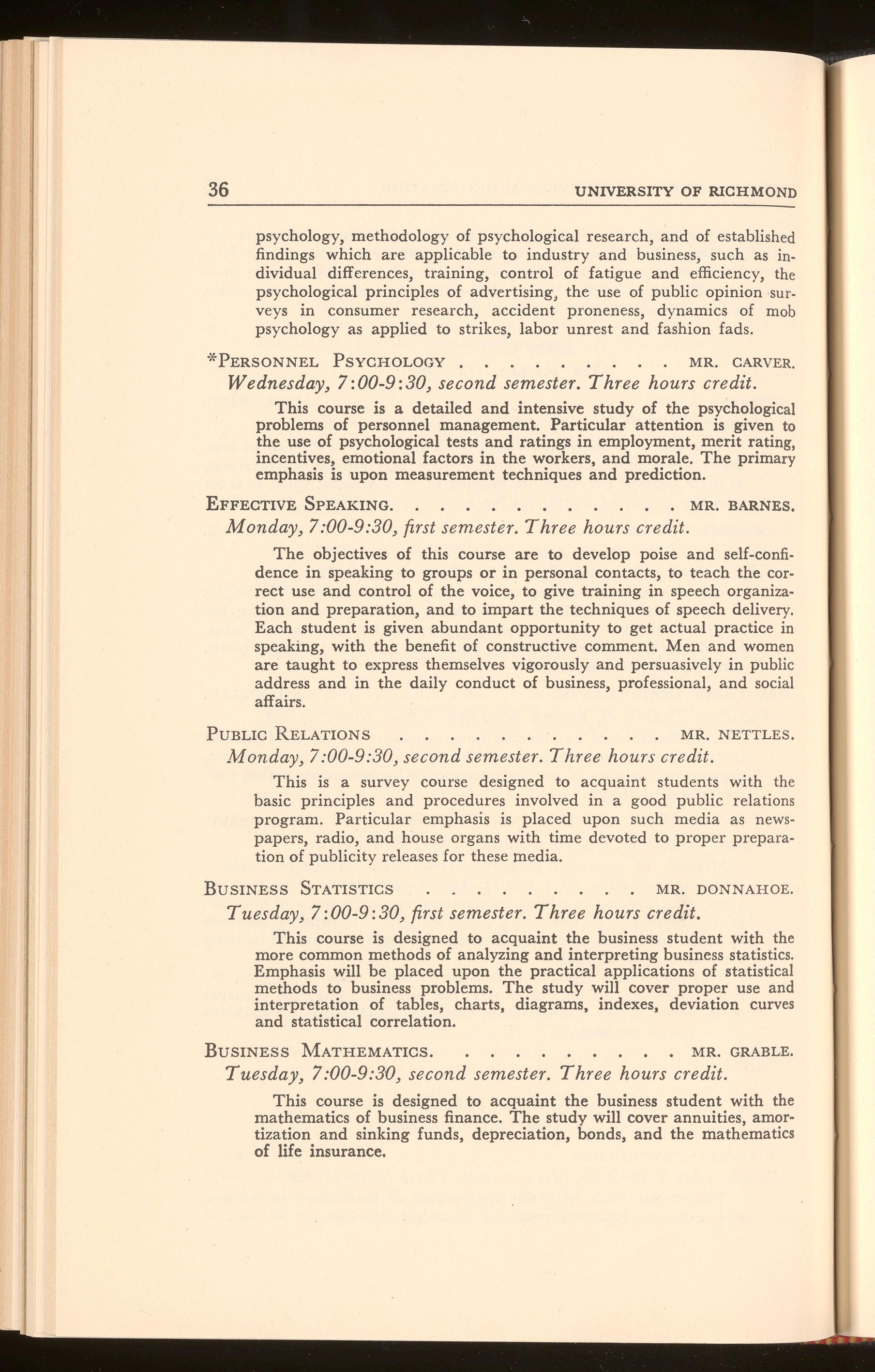
MR. DONNAHOE
Tuesday, 7:00-9:30, first semester. Three hours credit.
This course is designed to acquaint the business student with the more common methods of analyzing and interpreting business statistics . Emphasis will be placed upon the practical applications of statistical methods to business problems. The study will cover proper use and interpretation of tables, charts, diagrams, indexes, deviation curves and statistical correlation.
BUSINESS MATHEMATICS.
MR. GRABLE Tuesday, 7 :00-9: 30, second semester. Three hours credit.
This course is designed to acquaint the business student with the mathematics of business finance. The study will cover annuities, amortization and sinking funds, depreciation, bonds, and the mathematics of life insurance.
ENGLISH 101, BusINEss ENGLISH
Section (1), Tuesday, 7:00-9:30, first semester. Three hours credit.
MR. BALL.
Section (2), Thursday, 7:00-9:30, first semester. Three hours credit.
MR. HENRY.
The objective of this course is to give the student a command of correct and forceful English in order to enable him to express himself easily and precisely. A careful study is made of the fundamental prin- ciples of English grammar a~d composition. Emphasis is placed upon sentence structure, punctuation, vocabulary, and the organization of written work.
ENGLISH 102, BUSINESS LETTER WRITING
Section (]), Tuesday, 7:00-9:30, second semester. Three hours credit.
MR. BALL.
Section (2), Thursday, 7:00-9:30, second semester. Three hours credit.
MR. HENRY.
The objective of this course is to develop skill in writing good busi- ness letters and reports. The purpose will be to achieve the clearness, accuracy, and conciseness characteristic of effective expression and essential to the business man or woman.
SPANISH 201-2, COMMERCIAL

MR. LAVENDER.
Wednesday, 7:00-9:30, both semesters. Six hours credit.
This course is to familiarize the student with common business terms. Emphasis will be placed on commercial correspondence, grammar review and composition. Prerequisite, Spanish 101-2.
MATHEMATICS 101, ALGEBRA.
MR. GRABLE, Friday, 7: 00-9: 30, first semester. Three hours credit.
This course will cover the fundamental operations, linear equations, variation, graphs, simultaneous linear equations, determinants, quad- ratic equations, simultaneous quadratic equations, inequalities, binom- ial theorem, progressions and theory of equations.
MATHEMATICS 102, TRIGONOMETRY
MR. BABCOCK. Friday, 7:00-9:30, second semester. Three hours credit.
Additional work in algebra will be given in this course and will cover permutations and combinations, probability, simple and com- pound interest and annuities. The course will also cover trigonometric functions, right triangles, identities, logarithms and oblique triangles.
HISTORY 107-108, SURVEY OF EUROPEAN CIVILIZATION
MR. BUSHONG.
Thursday, 7:00-9:30, both semesters. Six hours credit.
A general course in European history from about 5000 B.C. to the present. Special emphasis will be placed upon the early Egyptian, Assyrian, Greek, and Roman Empires, the Middle Ages, the Renais- · sance the Reformation and the rise and development of the modern states' of Europe. '

UNIVERSITY
MONDAY
Accounting ID (2nd half fund.)
Accounting II, Intermediate .........
Accounting VI, Cost ..................... .
Advanced Time Study ................... .
Bank Administration ..................... .
Banking Fundamentals ................... .
Business Law ................................... .
Effective Speaking ......................... .
Office Management ....................... .
Public Relations ............................. .
Sales Management .........................
Work Simplification .......................
TUESDAY
Accounting I, Section ( 1 ) ............. .
Accounting III, Advanced ............. .
Advertising ..................................... .
English 101, Business English Section ( 1) ................................... .
English 102, Business Letter Writing Section ( 1) ....................... .
Commercial Law ............................. .
Consumer Credit ...........................
Credit Administration ................... .
Credits and Collections ................. .
Federal Reserve ............................. .
Financial Statements ..................... .
International Trade ....................... .
Negotiable Instruments ................. .
Principles of Economics I (a) ....... .
Small Business Management
WEDNESDAY
Accounting IB, General ...............
Accounting IIC .............................
Business Psychology ....................... .
General Insurance Education, CLU-B ..................................... .
Market Research ........................... .
Personal Management ................... .
Personal Psychology ....................... .
Principles of Marketing ................. .
Property Management ................... .
Real Estate Principles ................... .
Salesmanship ................................... .
Spanish 201-2, Commercial ........... .
Trusts I and II
THURSDAY
Accounting I, Section (2) ............. .
Accounting V, Auditing ................. .
Business Mathematics ..................... .
Hours Semesters
7:00-9:30 7:00-9:30 7:00-9:30 7:00-9:30 7:00•9:30 7:00-9:30 7:00-9:30 7:00-9:30 7:00-9:30 7:00-9:30 7:30-9:30 7:00-9:30
7:00-9:30 7:00-9:30 7:00-9:30 7:00-9:30
7:00-9:30 7:00-9:30 7:00-9:30 7:00-9:30 7:00-9:30 7:00-9:30 7:00-9:30 7:00-9:30 7:00-9:30 7:00-9:30 7:00-9:30
7:00':.9:30 7:00-9:30 7:00-9:30 7:00-9:30 7:00-9:30 7:00-9:30 7:00-9:30 7:00-9:30
101, Business English, Section (2)
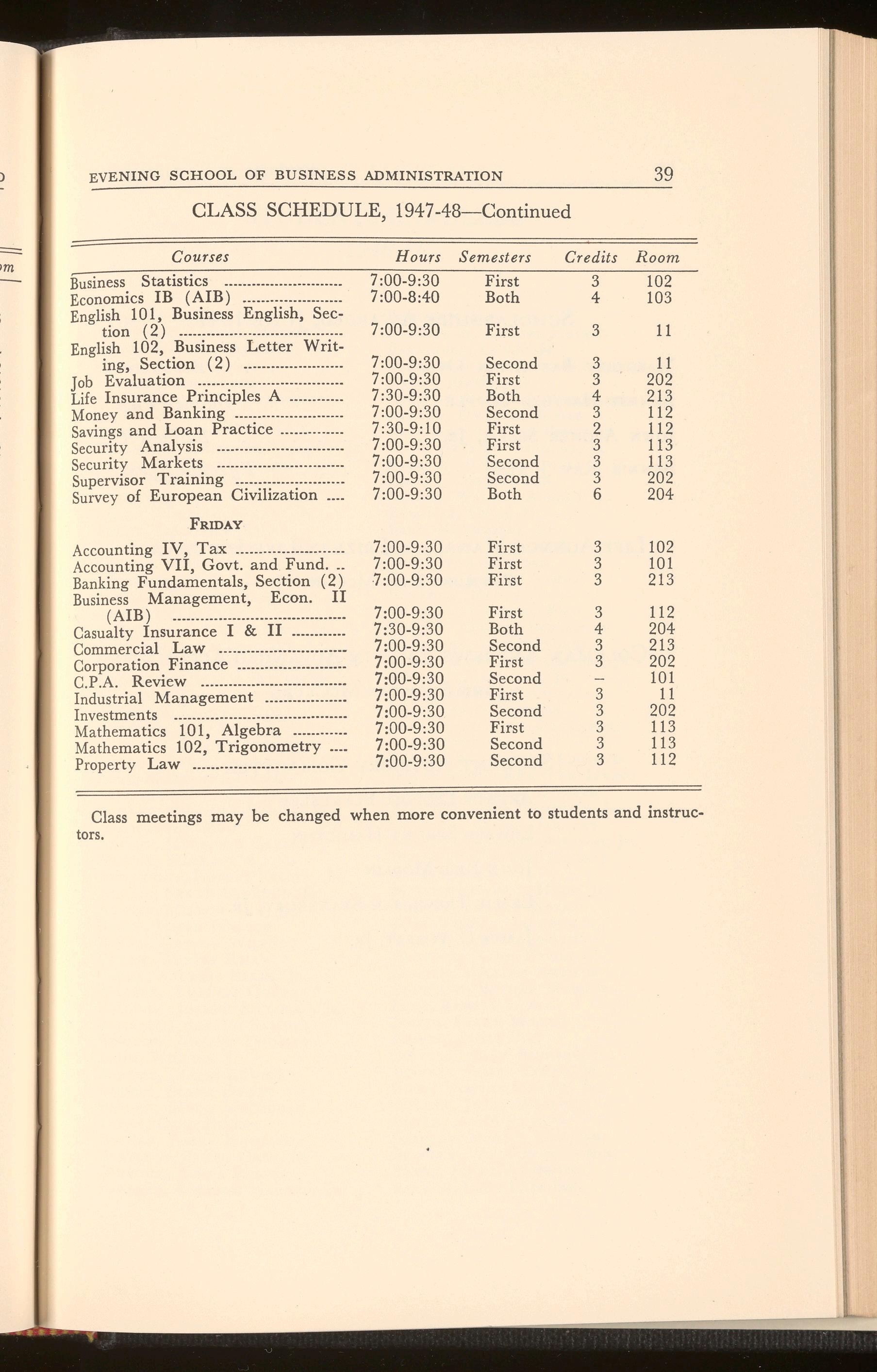
Class meetings may be changed when more convenient to students and instructors.
UNIVERSITY OF RICHMOND

SCHOLARSHIPS AWARDED, JUNE 1947
MARGARET BAUGHMAN OVERBY
ERNEST HAFFORD COPPLE
JoHN ARCHER SELPH, JR.
BENNIE RAY JONES
Accounting I
Business English
Business Law
Effective Speakin g
LIFE AGENCY MANAGERS PRIZE IN LIFE INSURANCE
RAYMOND EARL McCANN, JR.
T. COLEMAN ANDREWS PRIZE IN ADVANCED ACCOUNTING
JoHN SNOWDEN McCu .:RE
STUDENT ADVISORY COMMITTEE
ARTHUR LEOPOLD BLAKESLEE
EDWARD SPRUNT HAMILTON
JonN REID MoDLIN
LESLIE TREVILLIAN STANSBURY, JR.
JAMES C. WHEAT, JR.

ABAR, KENNETH JOHN
ABERNATHY, JAMES HUGH
ABRAHAMS, ]ACK ARTHUR
ADAMS, JAMES DAVIS
ADAMS, JOHN HENRY
ADAMS, RAYMOND ARLINGTON
ADAMS, RUBYE w.
ADAMS, THOMAS TUNSTALL, JR.
ADELSTEIN, KENNETH MARCUS, JR.
AILSTOCK, JESSE LOYALL
ALEXANDER, CHARLES R.
ALEXANDER, JOHN FRANKLIN
ALLEN, WILLIAM ERNEST, JR.
ALLEY, DOROTHY ALLEN
ALLEY, HENRY GODFREY, JR.
ALSTON, VIRGINIA
ALVERSON, HARRY LYNWOOD, JR.
AMBLER, GORDON BARBOUR
AMICK, H. CIREMBA
AMMONS, MAURICE ALLEN, JR.
AMRHEIN, JOHN LEONARD
AMRHEIN, JOSEPH ALEXANDER, JR.
ANDERSON, HELEN ELIZABETH
ANDREWS, ERVIN ARTHUR
ANDREWS, MAE McivoR
ANDREWS, IDA BRUCIA
ANDREWS, ROBERT HUNTER
ANTRIM, JOHN, JR. AREY, MARSHALL KEITH
ARMSTRONG, ]AMES, JR. ARNALL, CHARLES IRVING, JR. ASHWORTH, CLEO ASTLEY, MEREDITH CABELL
ATKINS, HERBERT A., JR.
AUGUSTINE, ROBERT BROWN, JR.
AUSTIN, FRANK BROADUS, JR.
AUSTIN, MILTON VAN, JR. BAGBY, JAMES WALTER
BAILEY, GEORGE WILFRED
BAILEY, RUFFIN RHAN
BAKER, ANDREW ELLIS, JR. BALDWIN, FRANCIS COUPER
BALDWIN, JosEPid SILLIMAN, JR. BAMBACUS, JOSEPH SAMUEIBANISCH, JOSEPH THOMAS
BANK, WILLIAM J.
BAPTIST, MARIE LOUISE
BARDEN, FRANK EDWIN
BARDEN, MYRA McNrcKLE BARNS, CARL HURT
BARNES, JAMES HAMILTON
BARTLETT, BRYAN ORIN, JR.
BARWICK, JAMES RALPH
BASSETT, WILLIAM HAROLD, JR.
BAUGHAN, LEE
BAUGHMAN, SAMUEL DANIEL BAYSINGER, CLYDE M. BEAL, MAHLON BROCKENBROUGH BEARD, JOSEPH, JR.
BEASLEY, CLIFFORD MARCELLUS
BEATON, CHARLES EDGAR
BEAVERS, CLIFFORD BEVERLY BECK, ARTHUR CHARLES, JR.
BECK, EUGENE MITCHELL
BEDELL, Lours WooD
BEIRNE, WALTER ROBERT
BELCHER, CECIL F.
BELL, KATHERINE E.
BELL, MARY MARGARET
BELL, WILLIAM FORD
BENDALL, ]AMES GRAHAM
BENEDEK, HENRY
BENTLEY, CHARLES EMIL
BERGER, AUGUST FREDERICK
BERKNESS, IRVING RUSSELL
BEYKE, AUGUSTINE GEORGE, JR.
BISHOP, HENRY LEE, JR.
BLACK, HENRY WITTLER
BLACK, JOHN PATRICK
BLACKWELL, JOHN DAVENPORT
BLAKE, PRESTON, JR.
BLAKESLEE, ARTHUR LEOPOLD
BLANKINSHIP, KENNETH IRVING
BLANKS, WILLIAM HUNTER
BLANTON, BOYD HAMPTON, JR. BLANTON, CLYDE HERBERT
BLANTON, THOMAS WILLIAM, JR. BLOXSOM, WELTON ELLIOTT
BLUE, LYNN A.
BLUETHGEN, PAUL HUGO, JR. BLYTHE, ROBERT EDWARD
BOAZ, THOMAS JACKSON
BoELT, CLEMJ;}NS EWALD
BoGUEss, NAsH EDWIN
BOLEYN, WILLIAM ARTHUR
BONIFANT, BERNER MONROE
Boos, ROBERT JAMES
BOOTH, FRANK MILLET
BOWEN, JACOB VAN
BOWERS, ADAM ROSWELL
BOWERS, JAMES BAKER, JR.
BOYD, VERNON HECHT, JR.
BOYKIN, JUNIS WESLEY
BOYLE, DAVID JOSEPH
BRADLEY, MARVIN NEWMAN
BRADLEY, WILLIAM WINSTON
BRADY, JAMES KENNETH
BRANCH, CARY LEJEUNE
UNIVERSITY OF RICHMOND
Students Enrolled in the Evening School of Business Administration, 1946-47
BRAUER, ELOISE HUGHES
BRAUER, PAULINE K.
BRAULT, ADELARD LIONEL
BRIDGEMAN, JOHN WRIGHT
BRIGGS, CLAYTON FRANCIS
BRITTLE, EDITH LEE
BRITTLE, KENT HEATH
BRITTON, EVERETT WELLFORD
BRITTON, WILLIAM GLENWOOD
BROADWELL, WAVERLY RANDOLPH
BROCKENBROUGH, ALLEN
BROCKENBROUGH, BENJAMIN W., JR.
BRONSTON, MELVIN
BROOKS, ALLEN OCTERLONY
BROOKS, EDWIN BEVERLY, JR.
BROOKS, JAMES HARVEY
BROOKS, JEAN VAN
BRooKs, LESTER McGUIRE
BROWER, HUGH D., JR.
BROWN, DOUGLAS OWEN, JR.
BROWN, JOHN MAYO
BRUNER, EMMETT CARROLL
BUCHANAN, CHARLES CLIFTON
BUCHANAN, CLARENCE ANTHONY
BUCHANAN, THOMAS FAUCETTE
BucHER, RoY EDWARD
BUFORD, CHARLES WALTHALL, jR.
BUNCH, FRANCIS MARION
BURGESS, GEORGE HERBERT
BURGESS, MELVIN DWIGHT
BURKHOLDER, CARY WILSON
BURNETT, MELVIN W.
BURNS, VIRGINIA
BUSHNELL, NATHAN, III
BUTTERWORTH, EVELYN SYDNOR
BUTTERWORTH, LOUIS POWELL
BUTLER,JOSEPH CLARENCE
BYRNE, LoUis PAUL
BYRNE, MARY LOUISE
CAIN, ROBERT HooD
CALL, JO E BRYANT, JR. CALLEAR, EDWARD LIONEL
CAMPBELL, MARGARET ANN
CAMPBELL, ROBERT KENNETH
CANADA, RANDOLPH PATRICK
CANDLER, RANDOLPH PHILIP CARDOZA, MARVIN EDWARD
CARLSON, ROBERT MELVIN
CARROLL, WILLIAM PATRICK
CARSON, JOSEPH PRESTON, JR.
CARTER, JAMES NORTON
CARY, MILES FAIRFAX
CASEN, WALTER WALKER
CASH, LAWRENCE MoLos
CASH, WILLIAM JEFFERSON, JR.
CASHELL, MARGARET THUERER
CAUDLE, ROBERT KEITH
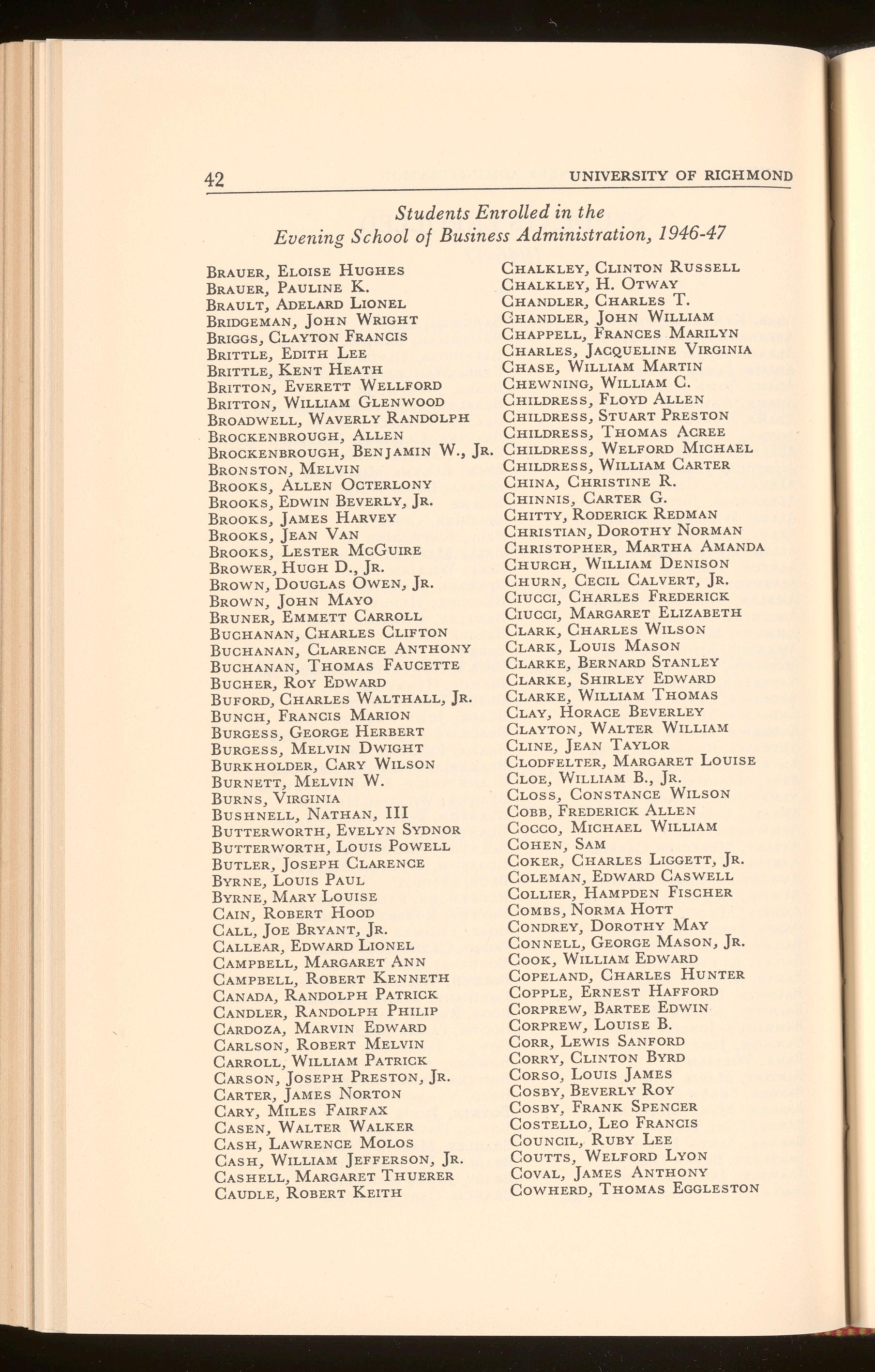
CHALKLEY, CLINTON RUSSELL
CHALKLEY, H. OTWAY
CHANDLER, CHARLES T. CHANDLER, JOHN WILLIAM CHAPPELL, FRANCES MARILYN
CHARLES, JACQUELINE VIRGINIA
CHASE, WILLIAM MARTIN
CHEWNING, WILLIAM C.
CHILDRESS, FLOYD ALLEN
CHILDRESS, STUART PRESTON
CHILDRESS, THOMAS ACREE
CHILDRESS, WELFORD MICHAEL CHILDRESS, WILLIAM CARTER
CHINA, CHRISTINE R. CHINNIS, CARTER G.
CHITTY, RODERICK REDMAN
CHRISTIAN, DOROTHY NORMAN
CHRISTOPHER, MARTHA AMANDA
CHURCH, WILLIAM DENISON
CHURN, CECIL CALVERT, JR. CIUCCI, CHARLES FREDERICK
CIUCCI, MARGARET ELIZABETH
CLARK, CHARLES WILSON
CLARK, LoUis MASON
CLARKE, BERNARD STANLEY
CLARKE, SHIRLEY EDWARD
CLARKE, WILLIAM THOMAS
CLAY, HORACE BEVERLEY
CLAYTON, WALTER WILLIAM
CLINE, JEAN TAYLOR
CLODFELTER, MARGARET LOUISE
CLOE, WILLIAM B., JR.
CLOSS, CONSTANCE WILSON
COBB, FREDERICK ALLEN
Cocco, MICHAEL W'1LLIAM
COHEN, SAM
COKER, CHARLES LIGGETT, JR.
COLEMAN, EDWARD CASWELL
COLLIER, HAMPDEN FISCHER
COMBS, NORMA HOTT
CONDREY, DOROTHY MAY
CONNELL, GEORGE MASON, JR.
CooK, WILLIAM EDWARD
COPELAND, CHARLES HUNTER
COPPLE, ERNEST HAFFORD
CORPREW, BARTEE EDWIN
CORPREW, LOUISE B.
CORR, LEWIS SANFORD
CORRY, CLINTON BYRD
CoRso, Louis JAMES
CosBY, BEVERLY RoY
COSBY, FRANK SPENCER
COSTELLO, LEO FRANCIS
COUNCIL, RUBY LEE
COUTTS, WELFORD LYON
COVAL, JAMES ANTHONY
COWHERD, THOMAS EGGLESTON
Students Enrolled in the Evening School of Business Administration, 1946-47
Cox, JAMES BERTRAND
CRAFT, SARAH LOUISE
CRAFT, WILLARD HENDERSON
CREEGER, ALLEN DAVID
CROCKER, JOEL BENNETT
CROCKETT, WINIFRED EILEEN
CROSIER, RosCOE HAMILTON, JR. CROSS, EARNEST RICHARD
CROUCH, JOHN CAMPBELL
CROWDER, CHARLENE OWEN
CROWDER, SHELBON WOODROW CRUMP, BERNARD WINSTON, JR. GRYMES, JOHNNY MARION
CUMBIA, WILFORD GARNER
CUNNINGHAM, WILLIAM CLEMENT
CURLEY, ANN KATHARINE
CURRY, LUCIEN RALSTON
CURTIS, BERNARD RANDOLPH
CURTIS, CLARENCE EDWARD, JR.
DAGENHART, JAMES CARR
DALTON, HARRY A.
DALTON, HENRY ADDISON
DANCE, WILLIAM BRYAN, JR, DANE, FRANCIS GAVIN
DANIEL, DAVID THOMAS
DARBY, ALBERT DARIUS, JR, DAVENPORT, JONAS BUCK
DAVID, JOHN, JR.
DAVIES, ARTHUR LANDON, JR. DAVIS, ALTON TALBOTT
DAVIS, CHARLES HERBERT
DAVIS, JOHN WILLIAM
DAVIS, LINWOOD EARL, JR. DAVIS, R. HAMPTON
DAVIS, WILLIAM RICHARD
DAWSON, MORRIS ALLIE
DAWSON, ROBERT LEE, JR. DEEKENS, ARTHUR VAN KEMPEN
DEEKENS, JOHN FULLER
DENNEY, JOHN WADE
DERRICKSON, JACK FLETCHER
DESKINS, EDNA FRANCES
DEW, JOHN FRANKLYN
DICKERSON, MARGARET LOUISE
DILLARD, JOHN EDWARD
DILORENZO, ANTHONY
DOGGETT, DONALD UPSHUR, JR. DOLAN, PAUL JEROME
DOLBY, CLARENCE RUNYAN, JR. DONAHUE, JOHN COLEMAN
DORSEY, CHARLES HOWARD, JR.
DORSEY, WILLIAM EDSON
DOUGLAS, PERCY LEE
DRUMHELLER, ELBERT OAKLEY
DUESBERRY, HARRY COLEMAN, JR.
DUGGAN, JAMES THOMAS
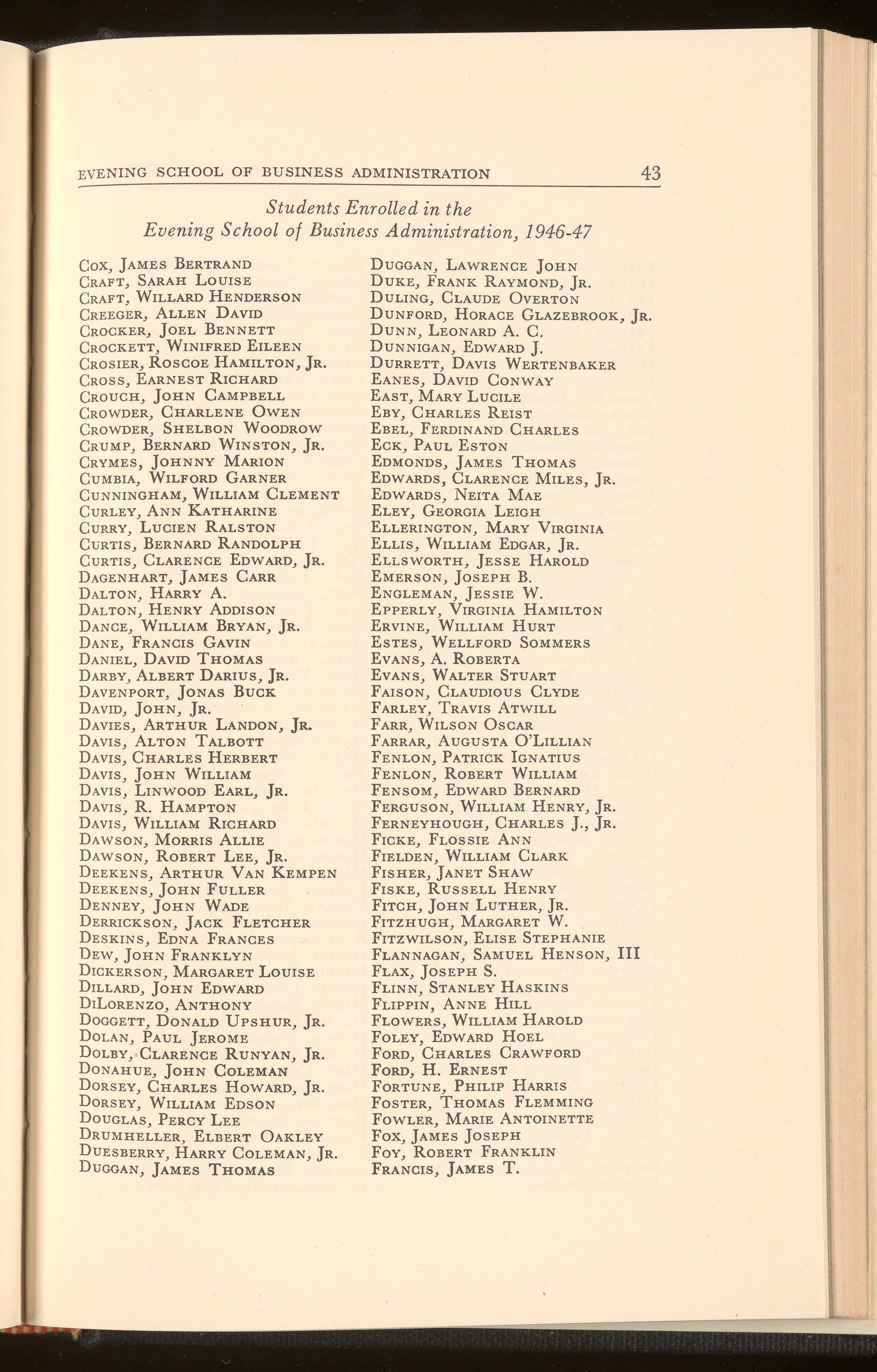
DUGGAN, LAWRENCE JOHN
DUKE, FRANK RAYMOND, JR.
DULING, CLAUDE OVERTON
DUNFORD, HORACE GLAZEBROOK, JR.
DUNN, LEONARD A. C.
DUNNIGAN, EDWARD J.
DURRETT, DAVIS WERTENBAKER
EANES, DAVID CONWAY
EAST, lvIARY LUCILE
EBY, CHARLES REIST
EBEL, FERDINAND CHARLES
EcK, PAUL EsTON
EDMONDS, JAMES THOMAS
EDWARDS, CLARENCE MILES, JR.
EDWARDS, NEITA MAE
ELEY, GEORGIA LEIGH
ELLERINGTON, MARY VIRGINIA
ELLIS, WILLIAM EDGAR, JR.
ELLSWORTH, JESSE HAROLD
EMERSON, JOSEPH B.
ENGLEMAN, JESSIE W.
EPPERLY, VIRGINIA HAMILTON
ERVINE, WILLIAM HURT
ESTES, WELLFORD SOMMERS
EVANS, A. ROBERTA
EVANS, WALTER STUART
FAISON, CLAUDIOUS CLYDE
FARLEY, TRAVIS ATWILL
FARR, WILSON OscAR
FARRAR, AUGUSTA O'LILLIAN
FENLON, PATRICK IGNATIUS
FENLON, ROBERT WILLIAM
FENSOM, EDWARD BERNARD
FERGUSON, WILLIAM HENRY, JR. FERNEYHOUGH, CHARLES J., JR.
FICKE, FLOSSIE ANN
FIELDEN, WILLIAM CLARK
FISHER, JANET SHAW
FISKE, RUSSELL HENRY
FITCH, JOHN LUTHER, JR.
FITZHUGH, MARGARET W.
FITZWILSON, ELISE STEPHANIE
FLANNAGAN, SAMUEL HENSON, III
FLAX, JOSEPH S.
FLINN, STANLEY HASKINS
FLIPPIN, ANNE HILL
FLOWERS, WILLIAM HAROLD
FOLEY, EDWARD HOEL
FORD, CHARLES CRAWFORD
FORD, H. ERNEST
FORTUNE, PHILIP HARRIS
FOSTER, THOMAS FLEMMING
FOWLER, MARIE ANTOINETTE
Fox, JAMES JosEPH
FoY, ROBERT FRANKLIN
FRANCIS, JAMES T.
UNIVERSITY OF RICHMOND
Students Enrolled in the Evening School of Business Administration, 1946-47
FRANCISCO, OSWALD CLAYTON
FRANKLIN, BURTON
FRAYSER, WILLIAM E. w.
FREI, FREDERIC
FRENCH, MYRTLE H.
FREUND, MARTHA PORTER
FRITH, FRANK LEWIS
FRY, JOHN G., JR.
GADBERRY, EDWIN, JR.
GAINES, FREDERICK HENRY
GALE, RICHARD MAC
GAMBILL, CHARLES JosEPH, JR.
GARBER, CHARLES BURNER
GARBER, FRED HENRY
GARD, ROBERT MAXWELL
GARRETT, KARL FREDERICK
GARRETT, MILLARD LINWOOD
GARRETT, STACY F., JR.
GARRIGAN, EDWIN PATRICK
GARRISON, KATHLEEN ANN
GARY, ERNEST DuTO:Y
GARY, LEON HAROLD
GARY, ROBERT ARMISTEAD, III
GASSER, GEORGE BERSHOLD, JR.
GATEWOOD, FRANK EDWARD, JR.
GEMMILL, WALTER NELSON
GERMELMAN, ERNEST GRANTLAND
GILL, HARVEY s.. JR.
GILLETTE, WALTER B.
GILLIAM, WILLIAM PRICE, JR.
GILMORE, JOHN SPENCER
GILLS, CONSTANCE BROWN
GILLS, DAVID WALLACE
GINSBERG,BERNARD
GLAZEBROOK, JOSEPH OGDEN, JR.
GLENN, MARJORIE SUZANNE
GODFREY, THOMAS BEVERLY
GOLDSTEIN. REUBEN
GooDMAN, ·RumN
GOODRICH, CECIL HARTWELL
GOODRICH, JAMES L.
GOODWIN, JOHN MIDDLETON
GORDON, GERALD SEYMOUR
GORDON, WILLIAM TALBOTT
GosHERT, HowARD WILLIAM, JR.
GOSMAN, SYDNEY A.
GOTTWALD, FLOYD DEWEY, JR.
GouLDIN, LUCILLE
GRAHAM, BERT WILSON
GRAHAM, EUGENE MATHEWS
GRAHAM, PATRICIA B.
GRANT, GEORGE w.
GRANT, RICHARD ARTHUR
GREEN, ARNOLD THOMAS
GREENE, CHARLES WHITE
GRIFFIN, JOSEPH HOWERTON
GRIFFIN, OLIVIA
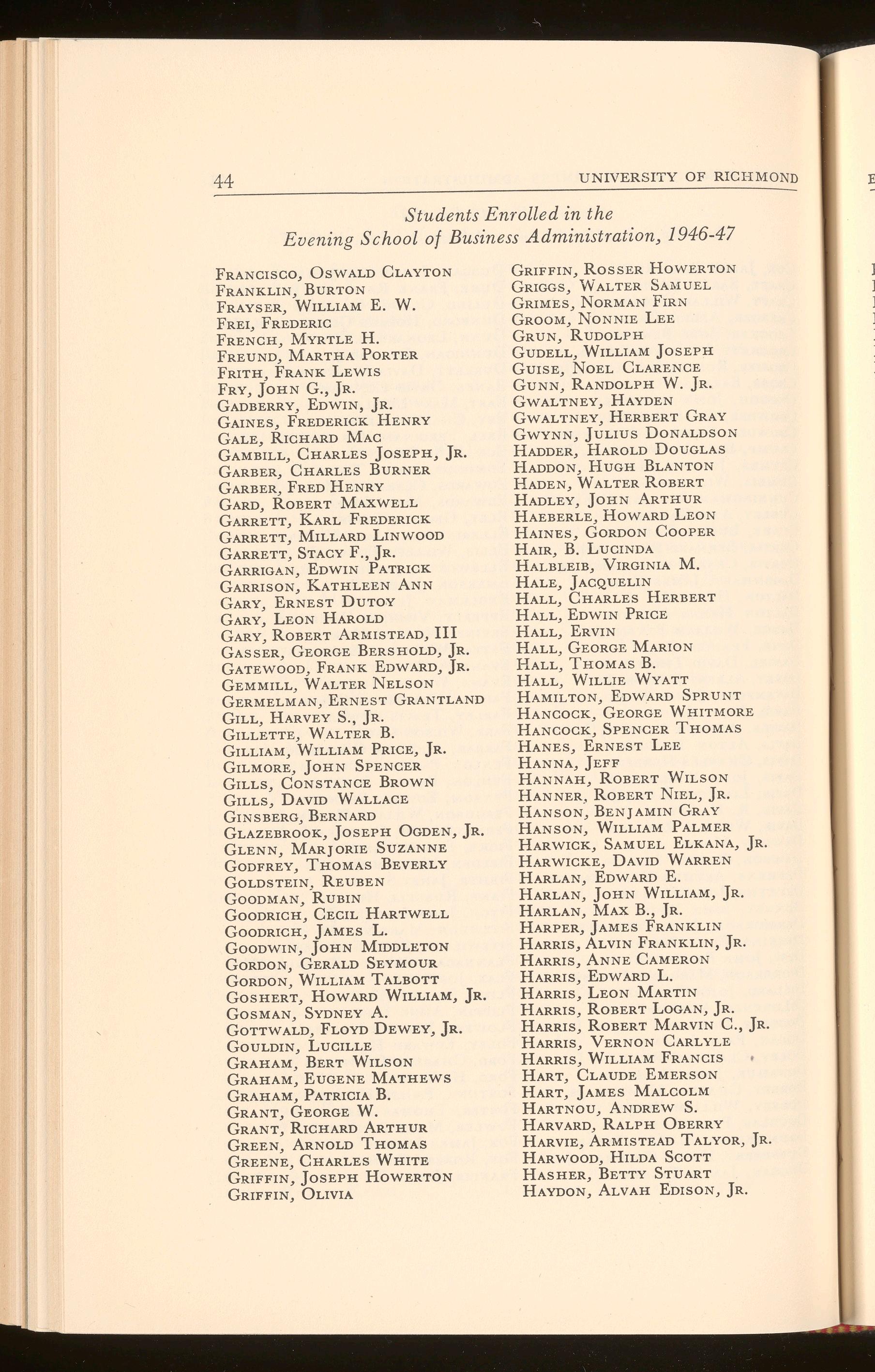
GRIFFIN, ROSSER HOWERTON
GRIGGS, WALTER SAMUEL
GRIMES, NORMAN FIRN
GROOM, NoNNIE LEE
GRUN, RUDOLPH
GUDELL, WILLIAM JOSEPH
GUISE, NOEL CLARENCE
GUNN, RANDOLPH W. JR.
GWALTNEY, HAYDEN
GWALTNEY, HERBERT GRAY
GWYNN, JULIUS DONALDSON
HADDER, HAROLD DouGLAS
HADDON, HUGH BLANTON
HADEN, WALTER ROBERT
HADLEY, JOHN ARTHUR
HAEBERLE, HOWARD LEON
HAINES, GORDON COOPER
HAIR, B. LUCINDA
HALBLEIB, VIRGINIA M.
HALE, JACQUELIN
HALL, CHARLES HERBERT
HALL, EDWIN PRICE
HALL, ERVIN
HALL, GEORGE MARION
HALL, THOMAS B.
HALL, WILLIE WYATT
HAMILTON, EDWARD SPRUNT
HANCOCK, GEORGE WHITMORE
HANCOCK, SPENCER THOMAS
HANES, ERNEST LEE
HANNA, JEFF
HANNAH, ROBERT WILSON
HANNER_, ROBERT NIEL, JR.
HANSON, BENJAMIN GRAY
HANSON, WILLIAM PALMER
HARWICK, SAMUEL ELKANA, JR.
HARWICKE, DAVID WARREN
HARLAN, EDWARD E.
HARLAN, JoHN WILLIAM, JR.
HARLAN, MAX B., JR.
HARPER, JAMES FRANKLIN
HARRIS, ALVIN FRANKLIN, JR. HARRIS, ANNE CAMERON
HARRIS, EDWARD L.
HARRIS, LEON MARTIN
HARRIS, ROBERT LOGAN, JR.
HARRIS, ROBERT MARVIN C., JR. HARRIS, VERNON CARLYLE
HARRIS, WILLIAM FRANCIS
HART, CLAUDE EMERSON
HART, JAMES MALCOLM
HARTNOU, ANDREW S.
HARVARD, RALPH OBERRY
HARVIE, ARMISTEAD TALYOR, JR.
HARWOOD, HILDA SCOTT
HASHER, BETTY STUART
HAYDON, ALVAH EDISON, JR.
Students Enrolled in the Evening School of Business Administration, 1946-47
HAYES, MASON 'RUSSELL
HAYNIE, DORIS EARLE
HAZELWOOD, CHARLES WAVERLY
HAZELWOOD, NORMAN HOUSTON
HEATH, L. EDWIN
HEENAN, ESTELLE HICKS
HELFLIN, AUBREY NEWBILL
HELMICK, MELVIN KENNETH
HELTZEL, ROBERT EDGAR
HEMBY, WILLIAM HENRY, JR.
HENSHAW, WILLIAM JOHN HENDERSON, DANIEL BROSIUS, JR.
HENDERSON, JOSEPH SMITH
HENDRICKS, FLOYD EDWARD
HENDRICKS, ROBERT THOMAS
HENDRICKS, WILLIAM SHELTON
HENLEY, HAZEL VIRGINIA
HENLEY, WILLIAM RAYMOND
HENNEMAN, WILBUR CLYDE
HENSHAW, WILLIAM JOHN
HERNDON, BRODIE STRACHAN
HERNDON, WILLIAM FRANKLIN
HERVEY, D. RANKIN
HEYWOOD, VIRGINIA
HIGHTOWER, MAIZIE LEWIS
HILL, FLORENCE GILL
HILL, JOEL EDMOND
HILL, VIRGINIA LEE
HINNANT, WILLIAM MACON
HINSHELWOOD, DONALD HAIG
HOBSON, RICHARD MILTON
HOEN, HUDSON PHILIP, JR.
HOFHEIMER, NORMA JANET HOFSTETTER, ANNE LEE
HoGAN, JOHN CARROLL
HOLMES, PRESTON TURNER
HOLT, CHARLIE HOWARD
HooD, JESSE ANDERSON, JR. HORN, GEORGE WILBUR
HORNE, GEORGE LANDON HORNICK, JOHN WILLIAM HORSLEY, WINNIE LILLY
HOSKINS, STUART W.
HOTT, GEORGE ELWOOD
HOUCHINS, BERNARD ROGER
HOUSTON, ARTHUR OWEN
HOWARD, NORMAN REVILO HOWARD, DEAHL WALSH HOWERTON, RICHARD McGHEE
HUCKSTEP, LEWIS RUSSELL
HODGINS, WILLIAM DOUGLAS
HUFFMAN, FLEMING DINGUS
HUGHES, FRANK LUCKETT
HUGHES, PHYLLIS IRENE
HULL, CHARLES M.
HUMPHREY, HARRY BRANDT, JR.
HUNEYCUTT, JAMES WILSON

HUNNICUTT, EMILY JEANNE
HUNTER, CHARLES ~IDNEY
HUNTER, JAMES ANDERSON
HYDE, FRANK TAYLOR
IMEL, CHARLES H.
IMOBERSTEG, HARLAN DALE, JR.
INGRAM, HERMAN L.
IRBY, EDWARD CRAWLEY
IRBY, SAMUEL ANTHONY
ISAACS, CHARLES ALLEN, JR.
JACK, WILLIAM W.
JACOBS, ALEXANDER SAMUEL
JAMES, ROWELL ADAMS
JEFFERSON, LLOYD U.
JEFFREY, RICHARD PERIS, JR. JENKINS, WILBUR LEE, JR. JENNINGS, CLARENCE FOSTER JENNINGS, GEORGE BOOKER JENNINGS, PERCY WRAY
JERNIGAN, JOHN ALBERT
JETER, MARY CHAFFIN
JEWETT, JERIMIAH ]ON ATHAN
JOHNSON, JAMES NATHANIEL, JR.
JOHNSON, NELLIE LAVINIA
JOHNSON, Roy ALFRED
JOHNSON, THOMAS NELSON P. JR.
JOHNSON, WILLIAM BIZZELL
JOHNSTON, COLEMAN, JR. JOHNSTON, ROBERT DANIEL
JONES, ARTHUR EDWARD
JONES, BENNIE RAY
JONES, BERNARD LEAKE, JR.
JONES, BERTRAM ALFRED
JONES, CECIL FRANKLIN
JONES, CLAIBORNE WALLACE
JONES, EMILY EDWARDS
JONES, FRANCIS PALMES
]ONES, LINWOOD GARLAND
]ONES, MARION WILLIAMSON
JONES, MEADE ADDISON
]ONES, RALPH GORDON
JONES, ROBERT BRINKLEY
JONES, ROBERT LEE
JONES, ROBERT TAFT
JONES, RossIE WRIGHT, JR.
JONES, STEPHEN ASHLEY
JORDON, SARAH COSTIGAN
JOSLYN, OTIS EDWARD
JOYCE, CHARLES LEON
JUSTIS, JOSEPH FRANKLIN
KACENA, CHARLES MARTIN
KALLAM, BERTHA MAE
KANE, ROBERT JOHN
KAUFMAN, ALEXANDER
KEELING, JOHN RosHIER
KEETON, :MYRA OLIVIA
KELLEY, RussELL OssIE
Students Enrolled in the Evening School of Business Administration, 1946-47
KEILHACKER, AGNES VERONICA
KELLAM, CHARLES FRANK
KELLER, BRICE HARRELL
KENT , CHARLES WILLIAMSON
KESSLER, RICHARD CALVIN
KETCHAM, VICTOR HERBERT, JR.
KIDD, ETHEL LEE
KILLINGER, STANLEY THOMAS
KIMBROUGH, ALLAN MORE, JR.
KING, CHARLES NEWTON
KING, ELLIS DURWARD
KING, FRANCES TYLER
K1NNEY, CURTIS CoNDIT
KIRTLEY, ROBERT DOUGLAS
KIRTLAND, CHARLES CONWAY
KIRTLAND, GRAYSON MONROE
K1TTENPLAN, SHIRLEY HELEN
K1TTENPLAN, EVELYN RosE
KLEIN, EDWARD MILTON
KusE, GEORGE E., JR.
KNIGHT, DORIS G.
KNIPPLE, HAROLD REXFORD
KNOTTS, MILDRED GRACE
KOBE, WALTER J.
KOENIG, EDWARD BASIL
KOLBE, JUNIUS ANDERSON
KoRNBLAU, SAM
KRAUSSE , PHILIP BERNARD
KRIETE, THOMAS LATIMER
KURTZ, EDWARD Lours
LAFOON, HAROLD SHERWOOD
LAFOON, HUBBARD STERLING
LAIRD, DOUGLAS W.
LANCASTER , ROBERT BOLLING
LANDERS, PAUL DAVIS
LANE, BENJAMIN STUART
LANE, FREDA RosENEGK
LANKFORD , ANTHONY CAREY
LANG, OMER RUSSELL
LAWRENCE, ELEANOR
LAZZARINI, ALFRED ANTHONY
LECHNER , ROBERT JOSEPH
LEE, WILLIAM BRADFORD
LEEPER, GEORGE WILLIAM
LEGLER, ARTHUR ANTHONY
LEIGH, jOHN CULLEN CARRINGTON
LERMA~ EMANUE~ JR.
LEPP, joHN ALVIN
LEVIN, MEYER
LEVY, JOAN SYBIL
LEWIS, GEORGE A.
LEWIS, L. CLIFTON
LIGON, ROBERT HOLMAN
LILES, JAMES WORLEY, JR.
LIPPY, EDWARD TROTTER
LIPPY, HARRY WILSON
LIPSCOMBE , HUGH DAVIS
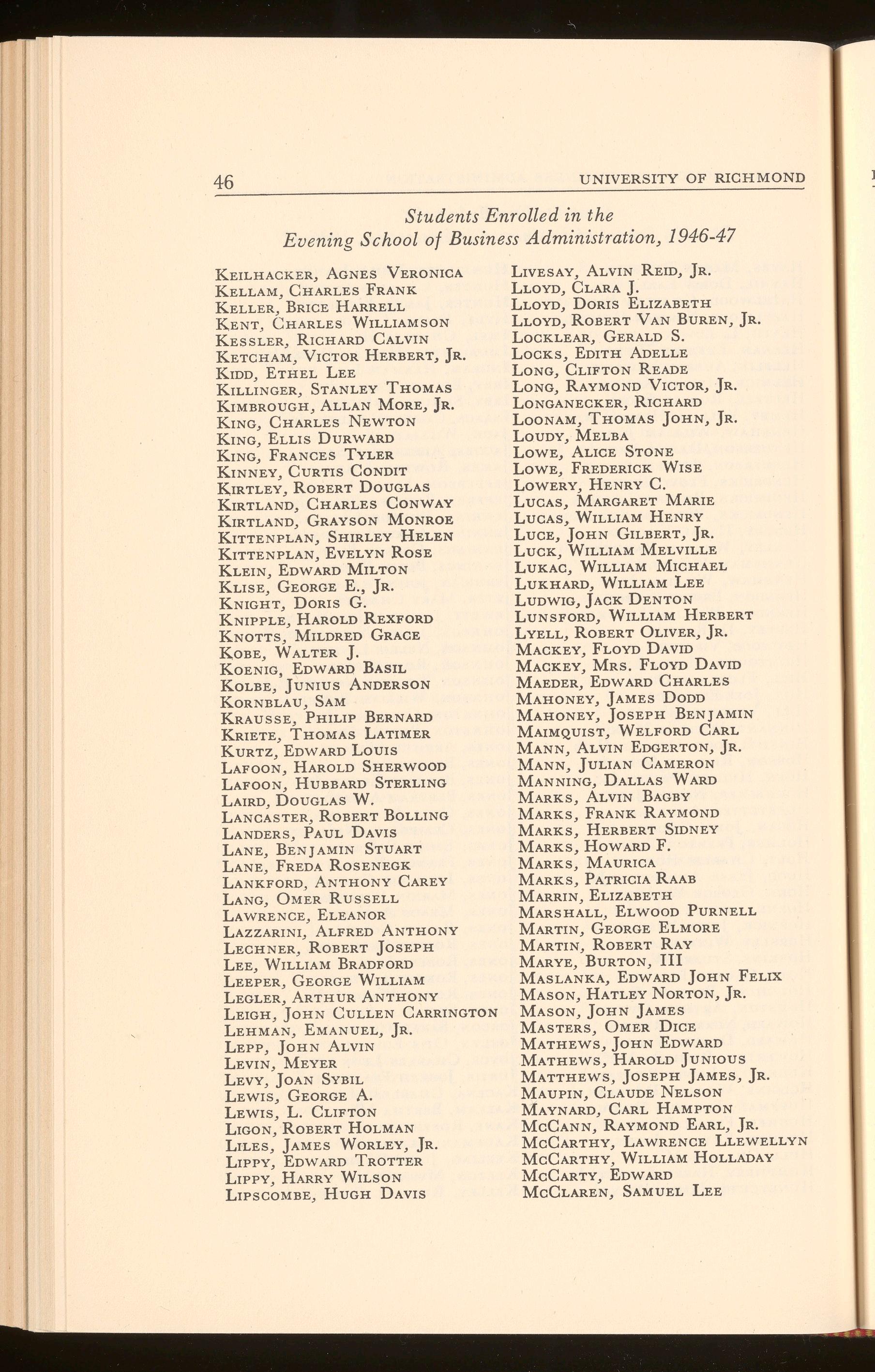
LIVESAY, ALVIN REID, JR.
LLOYD, CLARA J. LLOYD, DORIS ELIZABETH
LLOYD, ROBERT VAN BUREN, JR. LOCKLEAR, GERALD S. LOCKS, EDITH ADELLE
LONG, CLIFTON READE
LONG, RAYMOND VICTOR, JR. LONGANECKER, RICHARD LoONAM, THOMAS JOHN, JR. LOUDY, MELBA LOWE, ALICE STONE LOWE, FREDERICK WrsE LOWERY, HENRY C. LUCAS, MARGARET MARIE LUCAS, WILLIAM HENRY LUCE, JOHN GILBERT, JR. LUCK, WILLIAM MELVILLE
LUKAC, WILLIAM MICHAEL LUKHARD, WILLIAM LEE
LUDWIG, ]ACK DENTON LUNSFORD, WILLIAM HERBERT LYELL, ROBERT OLIVER, JR. MACKEY, FLOYD DAVID MACKEY, MRS. FLOYD DAVID MAEDER, EDWARD CHARLES
MAHONEY, JAMES DODD
MAHONEY, JOSEPH BENJAMIN MAIMQUIST, WELFORD CARL MANN, ALVIN EDGERTON, JR. MANN, JULIAN CAMERON
MANNING, DALLAS WARD
MARKS, ALVIN BAGBY
MARKS, FRANK RAYMOND
MARKS, HERBERT SIDNEY
MARKS, HOWARD F.
MARKS, MAURICA
MARKS , PATRICIA RAAB
MARRIN, ELIZABETH
MARSHALL, ELWOOD PURNELL
MARTIN, GEORGE ELMORE
MARTIN, ROBERT RAY
MARYE, BURTON, III
MASLANKA, EDWARD JOHN FELIX
MASON, HATLEY NORTON, JR. MASON, JOHN JAMES
MASTERS, OMER DICE
MATHEWS, JOHN EDWARD
MATHEWS, HAROLD JUNIOUS
MATTHEWS, JOSEPH JAMES, JR. MAUPIN, CLAUDE NELSON
MAYNARD, CARL HAMPTON
McCANN, RAYMOND EARL, JR.
McCARTHY, LAWRENCE LLEWELLYN
McCARTHY, W1LL1AM HoLLADAY
McCARTY, EDWARD
MCCLAREN, SAMUEL LEE
Students Enrolled in the Evening School of Business Administration, 1946-47
McCLURE, JoHN SNOWDEN MCGINTY, MARY BEATTY
McKENNEY, JoHN FRANcrs
McMAHON, MoRRrs WILLIAM McRAE, ELLIOTT HAMPTON MCSWEENEY, ROBERT EDWARD
MEHLER, AARON
MELIN, FREDERICK W., JR. MERCER, ISAAC JOHN, JR. MERRICK, EDWIN JOEL
METZGER, MARGARET A. METZGER, NATHAN
MEYER, MILTON M., JR. MILLER, FRANCES THORNTON MILLER, HAZEL ROBERTA MILLER, LEWIS NELSON
MrLLER, Lours FRANKLIN MILLER, WILLIS GLEN
MINOR, MINOR RUSSELL MITCHELL, GLADYS MAY
MrTCHELL, NoRMA EvA MITCHELL, WILLIAM HODGES
MODLIN, JOHN REID MOFFAT, CHARLES ELWOOD
MOFFETT, HARRY DALEY
MOHR, NORMAN JEROME
MONTEIRO, CLAUDE MELNOTTE
MOODY, SAMUEL MILLER, JR. MOOERS, JANE ALDEN
MOONEY, WARREN BLAIR
MOORE, CHARLES ELLET, JR. MOORE, HARRY WINSTON
MOORE, JACQUELINE MARIAN
MOORE , MARGERY LUCILE
MOORE, ROBERT BRYANT MOORE, STUART B. MOORE, WILLIAM JENNINGS, JR. MORAN, ROBERT HENSON MORAN, WILLIAM LORENZA MORRIS, GROVER CLEVELAND, JR. MORRIS, NELL L. MORRISSEY, M. LOUISE MORTON, CHARLES F. MORTON, Eu P.
MOSBY, ROBERT RAY, JR. MOSELEY, HARRY DANIEL MOTTLEY, JEFFERSON DAVIS, JR. MUMPER, ROBERT HORACE
MURPHEY, ADICE R. MURRAY, DORIS GENEVIEVE
MusE, FRANK SEAY
MYERS, EVELYN LOUISE NACHMAN, HENRY DUDLEY NAGY, RUDOLPH VALENTINO
NANCE, WADE HAMPTON
NASH, BERNARD MERIDITH
NELSON, EARL THOMAS

NETHERLAND, EVA BAKER
NEWBERRY, ALMA EUGENE
NEWBY, T. ASHBY
NEWCOMER, FRANKLIN
NEWTON, JAMES K. M.
NICEWARNER, AUSTIN ALBIN
NICHOLS, COLEMAN BRANCH
NICHOLSON, CLARENCE M., JR.
NICHOLSON, THOMAS OWEN
NIEDERMAYER, CHARLES EDWARD, JR.
NIELSEN, NED N.
NOEL, EDGAR ALLEN
NOLAN, MARY C.
NOLTE, FRANK BERNARD
NooNAN, RAYMOND E.
NORMENT, JOSEPH EDWARD
NUGENT, JOHN H., III
NUNNALLY, MELVIN BAUGH
NUNNALLY, STUART EUGENE
OAKEY, LUCULLUS SHELTON
OLLIFF, LOUISE ELIZABETH
OPPENHEIMER, ALBERT B.
ORGAIN, JOHN BARBOUR, JR.
OSBORNE, EULA ELIZABETH
OSBORNE, JULIAN
OSBORNE, NEITH LAWRENCE
OTTESEN, ALBERT MARVIN
OVERBY, MARGARET BAUGHMAN
OVERTON, RICHARD HARRISON
OWEN, LEROY DAVIS
OWEN, WILLIAM LEE
OWENS, HUGH HARRISON
PACKARD, ROBERT LEE
PADGETT, SAMUEL FLEMING , III
PAGE, S. H.
PAGE, SAMUEL HAMPTON
PAIR, LOFTON WINFRED
PALEN, EDWIN JEROME
PALMER, GORDON MELVIN
PALMORE, BERNARD HUDGINS
PALMORE, WILLIAM ALAN
PANKONIN, WILLIAM AUSTIN
PARIS, RAWLEY ELIJAH, JR.
PARKER, A. LEAH
PARKER, DAVE ALLEN
PARKER, ROBERT CLEVELAND
PARKER, ROBERT LEE
PARRISH, LINWOOD GIBSON
PARRISH, WILBERT CHESTER
PARSONS, ELSIE EUGENIA
PARSONS, LAWRENCE
PARSONS, MARY ELMA
PARSONS, SHEPPARD TOWNSEND, JR.
PASCO, JOHN, JR.
PATTESON, WILSON PICKRELL, JR.
PAUL, RAY MERCER
PAULETTE, RoY BAKER
UNIVERSITY OF RICHMOND
Students Enrolled in the Evening School of Business Administration, 1946-47
PAULI, DAVID GUTHRIE
PAYNE, PETER WINSTON, JR.
PAYNE, Susrn TERRELL
PEARMAN, STUART MARSHALL
PEARSON, JAMES EDWARD
PEARSON, THOMAS WARREN
PEARSON, VIRGINIA BOLLING
PEARSON, VIRGINIA DANIEL
PEERY, ROBERT CAMPBELL
PENN, VIRGINIA LEE
PENSYL, KENNETH ANDREW
PERKINS, HARRY HALE
PERKINS, REBA LILLEY
PETERS, JAMES LINWOOD
PETERS, JAMES SHELTON
PETERS, VIRGINIA BERGMAN
PEYTON, ARMISTEAD
PHILLIPS, CHARLES HOMER, JR.
PHILLIPS, GEORGE
PHILLIPS, RICHARD LEE
PHILPOTTS, CHARLES OAKLEY
PIERCE, SUSAN EARLING
PILSCH, JACOB, JR.
PINNER, MARGARET KATHERINE
PISPEKY, FRANK J.
PITCHFORD, RAY E.
PITT, EDWARD LEE, III
PITTS, HYTER BROADDUS, JR.
PITTS, JAMES GORDON
PITZINGER, FRANCIS HITE
POEHLER, FRED HERMAN
POEHLER, PAUL HENRY
POHLMAN, CARL WILLIAM, JR.
POLLARD, GEORGE MILLER
POMMER, ERNEST
POOLE, EMMA GLENN
POND, VERLA M.
PORTER, GEORGE JONES
PORTER, HORACE ISAAC
PORTERFIELD, JACK BERRY, JR.
PouzAR, HARRY PAUL
POWELL, GRATTAN MINNICK
POWELL, HAROLD WALKER
PRICE, ERASTUS MARVIN
PRICE, MAURICE FRANKLIN
PRIDDY, SUMPTER TURNER
PRYDE, ELEANOR AGATHA
PUGH, RICHARD MARSHALL
PULLER, JAMES BRANSFORD
PURCELL, THOMAS WILLIAMSON, JR.
PURKINS, CHARLES ALFRED, JR.
PUTNEY, REID TAYLOR
QUARLES, JOHN PHILLIPS
QUILTER, JOHN
QUIST, EDDIE HERMAN
RAFF, JOHN FREDERICK, JR.
RAFF, ROBERT CHARLES
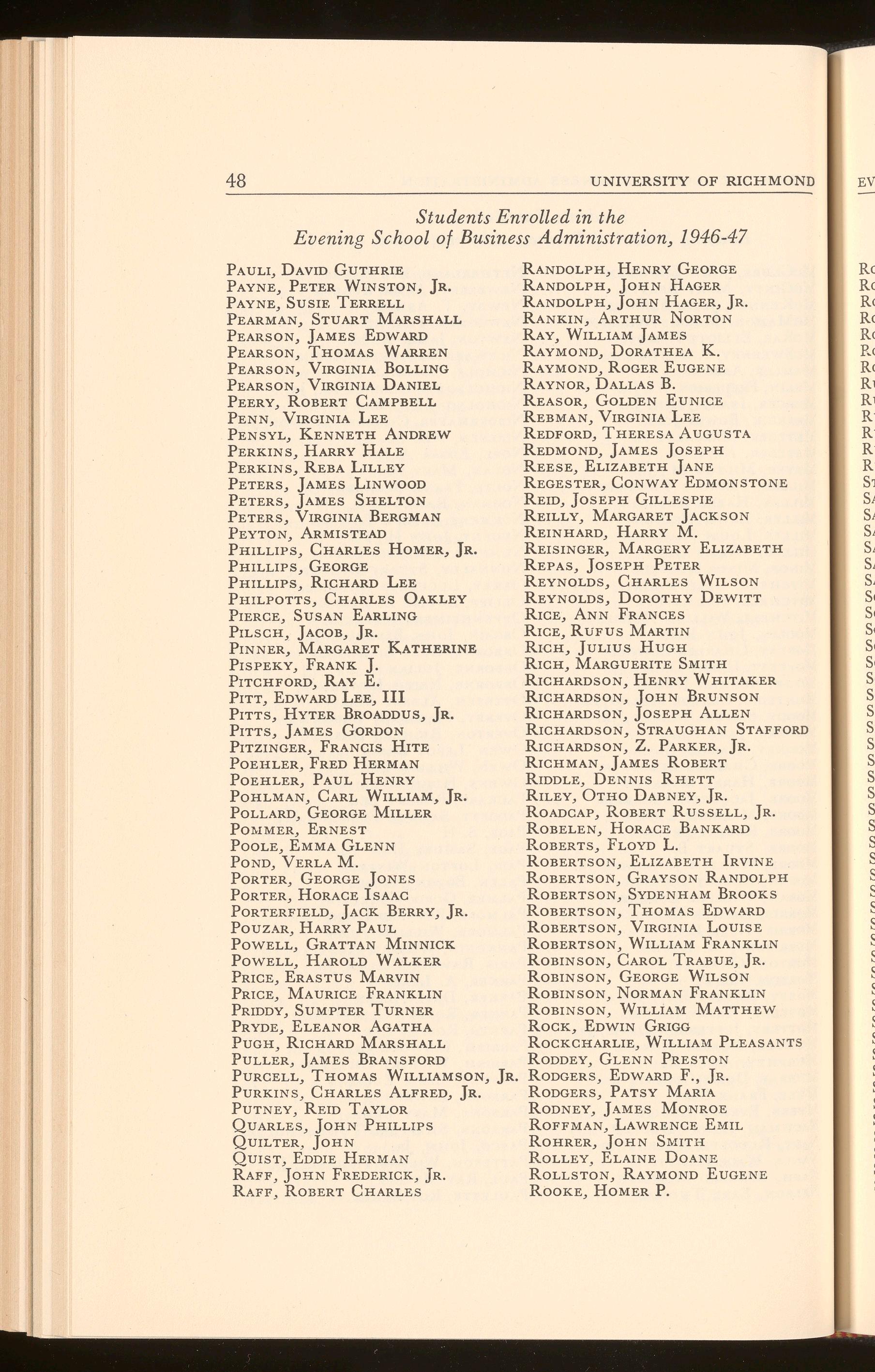
RANDOLPH, HENRY GEORGE
RANDOLPH, JOHN HAGER
RANDOLPH, JOHN HAGER, JR.
RANKIN, ARTHUR NORTON
RAY, WILLIAM JAMES
RAYMOND, DORATHEA K.
RAYMOND, ROGER EUGENE
RAYNOR, DALLAS B.
REASOR, GOLDEN EUNICE
REBMAN, VIRGINIA LEE
REDFORD, THERESA AUGUSTA
REDMOND, JAMES JOSEPH
REESE, ELIZABETH JANE
REGESTER, CONWAY EDMONSTONE
REID, JOSEPH GILLESPIE
REILLY, MARGARET JACKSON
REINHARD, HARRY M.
REISINGER, MARGERY ELIZABETH
REPAS, JOSEPH PETER
REYNOLDS, CHARLES WILSON
REYNOLDS, DOROTHY DEWITT
RICE, ANN FRANCES
RICE, RUFUS MARTIN
RICH, JULIUS HUGH
RICH, MARGUERITE SMITH
RICHARDSON, HENRY WHITAKER
RICHARDSON, JOHN BRUNSON
RICHARDSON, JOSEPH ALLEN
RICHARDSON, STRAUGHAN STAFFORD
RICHARDSON, Z. PARKER, JR.
RICHMAN, JAMES ROBERT
RIDDLE, DENNIS RHETT
RILEY, OTHO DABNEY, JR.
ROADCAP, ROBERT RUSSELL, JR.
ROBELEN, HORACE BANKARD
ROBERTS, FLOYD L.
ROBERTSON, ELIZABETH IRVINE
ROBERTSON, GRAYSON RANDOLPH
ROBERTSON, SYDENHAM BROOKS
ROBERTSON, THOMAS EDWARD
ROBERTSON, VIRGINIA LOUISE
ROBERTSON, WILLIAM FRANKLIN
ROBINSON, CAROL TRABUE, JR.
ROBINSON, GEORGE WILSON
ROBINSON, NORMAN FRANKLIN
ROBINSON, WILLIAM 1VfATTHEW
RocK, EDWIN GRIGG
RoCKCHARLIE, WILLIAM PLEASANTS
RODDEY, GLENN PRESTON
RODGERS, EDWARD F., JR.
RODGERS, PATSY MARIA
RODNEY, JAMES MONROE
ROFFMAN, LAWRENCE EMIL
ROHRER, JOHN SMITH
ROLLEY , ELAINE DOANE
ROLLSTON, RAYMOND EUGENE
ROOKE, HOMER P.
Students Enrolled in the Evening School of Business Administration, 1946-47
RosE, JAMES GARLAND
ROSENBAUM, WALTER L.
ROSENFELD, SOL BURNETT
RosENTHAL, EDITH JOAN
Ross, GEORGE EDWARD
Ross, RoBERT ANTHONY
ROWLAND, JOSEPH STUART
RUBLE, JOHN LOWELL
RUDISILL, ERNEST K.
RuFTY, BOYCE REITZEL
RUIGROK, ALBERT JOSEPH
RUSH, HAROLD REYNOLDS
RUSSELL, ]ACK ELY
ST. ]OHN, VIRGIL WASHINGTON
SANDERS, FRIEL TATE
SANDERS, WILLIAM VERNON
SANTUCCI, EDWARD OSWALD
SAUER, LESTER MARTIN
SAVAGE, JULIAN ESTERS
SAWYER, WILLIAM LOCKWOOD
SCHERMERHORN, EGMONT J.
SCHERMERHORN, JOHN POOL, ]R. SCHMIDT, STUART GRAY
SCHOOLS, DOUGLAS CARROLL
SCHUELKE, MARVIN H.
SCHULTHEIS, WILLIAM LEROY
SCHUTTE, HARRY IGNATIUS, ]R. SCHWEICKERT, KARL REED
SEALEY, WOODROW DOUGLAS
SELPH, ]AMES ANDERSON
SELPH, ]OHN ARCHER, JR. SETTLE, JOHN ROBERT
SEWARD, WILLIAM HENRY
SHAFER, ALEX HOLLADAY, ]R. SHANKS, ]AMES BERNARD
SHANNON, HOWELL FRANKLIN, JR.
SHAW, GEORGE s., JR. SHAW, JARVIS BASIL
SHEFFIELD, EDWARD ROYAL
SHELBURNE, CLARENCE DANIEL SHELDON, LUTHER PITZER SHELLY, RICHARD HARRISON
SHELTON,JOSEPH MosBY
SHEPARD, MILDRED V. SHIELDS, VADEN COLLIE
SHIVELY, JAMES EDWARD
SHORE, JOHN IRBY
SHOWALTER, NORMAN FRANKLIN
SHUMATE, JESSE DANIEL
SHUPE, MERLE
SHURLEY, JOHN ROOKER
SILER, JOHN HAMMOND, ]R. SrMMs, EssIE CLEVELAND
SIMPSON, VANCE RoY
SINGLETON, JonN EDWARD
SIZER, HOUSTON BOYD
SKEELS, ROBERT ALFRED
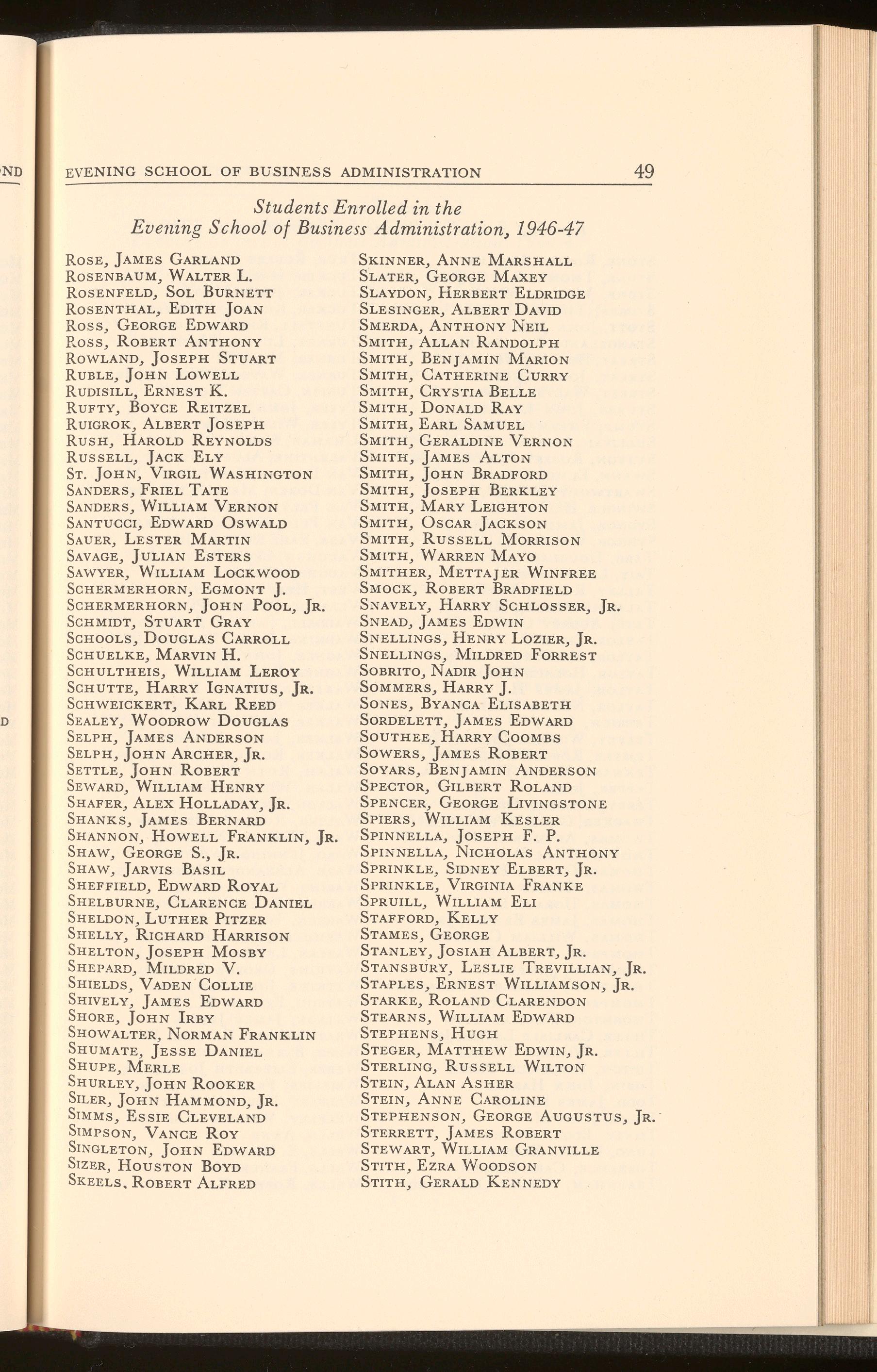
SKINNER, ANNE MARSHALL
SLATER, GEORGE MAXEY
SLAYDON, HERBERT ELDRIDGE
SLESINGER, ALBERT DAVID
SMERDA, ANTHONY NEIL
SMITH, ALLAN RANDOLPH
SMITH, BENJAMIN MARION
SMITH, CATHERINE CURRY
SMITH, CRYSTIA BELLE
SMITH, DONALD RAY
SMITH, EARL SAMUEL
SMITH, GERALDINE VERNON
SMITH, JAMES ALTON
SMITH, JOHN BRADFORD
SMITH, JOSEPH BERKLEY
SMITH, MARY LEIGHTON
SMITH, OSCAR JACKSON
SMITH, RUSSELL MORRISON
SMITH, WARREN MAYO
SMITHER, METTAJER WINFREE
SMOCK, ROBERT BRADFIELD
SNAVELY, HARRY SCHLOSSER, ]R.
SNEAD, JAMES EDWIN
SNELLINGS, HENRY LOZIER, JR.
SNELLINGS, NfrLDRED FORREST
SOBRITO, NADIR JOHN
SOMMERS, HARRY J.
SONES, BYANCA ELISABETH
SORDELETT, JAMES EDWARD
SOUTHEE, HARRY COOMBS
SOWERS, JAMES ROBERT
SOYARS, BENJAMIN ANDERSON
SPECTOR, GILBERT ROLAND
SPENCER, GEORGE LIVINGSTONE
SPIERS, WILLIAM KESLER
SPINNELLA, JOSEPH F. P.
SPINNELLA, NICHOLAS ANTHONY
SPRINKLE, SIDNEY ELBERT, ]R.
SPRINKLE, VIRGINIA FRANKE
SPRUILL, WILLIAM ELI
STAFFORD, KELLY
STAMES, GEORGE
STANLEY, JOSIAH ALBERT, JR.
STANSBURY, LESLIE TREVILLIAN, JR.
STAPLES, ERNEST WILLIAMSON, ]R.
STARKE, ROLAND CLARENDON
STEARNS, WILLIAM EDWARD
STEPHENS, HUGH
STEGER, MATTHEW EDWIN, JR.
STERLING, RUSSELL WILTON
STEIN, ALAN ASHER
STEIN, ANNE CAROLINE
STEPHENSON, GEORGE AUGUSTUS, JR. -
STERRETT, ]AMES ROBERT
STEWART, WILLIAM GRANVILLE
STITH, EZRA WOODSON
STITH, GERALD KENNEDY

UNIVERSITY OF RICHMOND
Students Enrolled in the Evening School of Business Administration, 1946-47
STONE, ROBERT ARTHUR
STONE, THOMAS Lours, JR.
STONE, WILLIAM WALLACE
STORRS, THOMAS IRWIN
STOTT, JOHN JOSEPH
STANGELAND, GORDON EVERETT
STREAT, HENRY JOSEPH, JR.
STREAT, JOHN THOMAS
STREET, WALTER NEWBILL, JR.
STUBBS, JOHN LATHAM
STUMP, SHERMAN WILSON
SULLIVAN, LAWRENCE CLIFTON
SUTTON, ROBERT FRANKLIN, JR.
SWANN, ELMER TOMPKINS, JR.
SWARTWOUT, JOHN B., JR.
SWINGLE, RALPH NELSON
SYDNOR, JAMES THOMAS, JR.
SYDNOR, WALTER, JR.
TABB, DouGLAS CowLES
TAIT, LEE CAMPBELL
TALLEY, ROBERT VERNON
TALMAN, WILLIAM HENRY
TATE, AUDREY GRACE
TAYLOR, EDDIE C.
TAYLOR, HERBERT DALTON
TAYLOR, HORACE HERNDON
TAYLOR, JAMES H.
TAYLOR, NELLIE VIRGINIA
TEBRICH, JOHN
TEEFEY, WILLIAM JOSEPH, JR.
TE MPLE, ROBERT GLADSTONE
TENNANT, HARRY W.
TEPPER, JOHN
TERRY, CHARLES RICHARDS
THACKER, GENEVIEVE MASTEN
THOMAS, ARTHUR DICKEN
THOMAS, CECIL DALLAS
THOMAS, GEORGE EDWIN
THOMAS, GEORGE P.
THOMAS, HORACE L.
THOMAS, JAMES ERNEST, JR.
THOMAS, WILLIAM CARLTON
THOMPSON, FRANK B.
THOMPSON, JAMES C.
THOMPSON, MARGARET ELEANOR
THOMPSON, WILLIAM, JR.
THORNTON, THOMAS RUDD
TILLER, CARLISLE LESLIE, JR.
TILLER, WILLIAM LINCAS
TIPTON, FREDERICK PHILIP
TOBIN, JOHN HAROLD
Tonn, JAMES ELWYN
TOLER, JOHN M.
TONEY, EDGAR GRAHAM
TONG, NEOMA ELIZABETH
TORRENCE, CARL LINDEN
TRAYNHAM, ALBERT CRAWFORD
TRUE, ROBERT CLIFF
TUCKER, HARRY E.
TUCKER, JESSE MILLER
TUCKER, RICHARD THOMAS
TUNSTALL, RICHARD EVANS
TURNER, LUTHER HARDING
TURNER, MARY B.
TURNER, WAVERLY EDWARD, JR.
TURPIN, CARTER MOSBY
TYLER, JOHN, JR.
TYLER, WILBUR TYREE
UHRMAN, SIMON
VALENTINE, ALLEN WILSON, JR.
VAN DOREN, MATTHEW F. MAURY
VAN DOREN, MEVERELL B., JR.
VAN PELT, EDWARD O'NEILL
VAN PELT, GLORIA KATHLEEN
VASS, EARL SAMUEL, JR.
VAUGHAN, CECIL PORTER, JR.
VAUGHAN, GEORGE HILTON
VEST, HELEN MARTHA
VLASICH, WILLIAM PETER
WADDELL, SAMUEL RICHARD
WADKINS, JAMES THOMAS, JR.
WAGNER, JOHN WILSON
WAGNER, KARL HENRY
WAKEMAN, WYTHE B.
WALKER, CAROLYN FRANCES
WALKER, DAVID STEWART, JR.
WALKER, JAMES EWING
WALKER, ROBERT COLEMAN, JR.
WALSH, RUTH NELSON
WALSH, WrLLIAM NoRVEL
WALTON, ANN MAE
WALTER, ROBERT ANDERSON
WARD, HERBERT NORMAN
WARD, JENNINGS WOODROW
WARE, ALEXANDER HUGHES, JR.
WARING, WINSTON HILL
WARREN, RAMON ELDRIDGE
WARREN, WILLIAM RUSSELL
WASHBURN, GEORGE MANLEY, JR. WATERS, LELAND HUBERT, JR. WATKINS, GEORGE BERNARD
WATKINS, JOHN BENJAMIN
WATSON, FRANCIS M., JR. WATSON, JAMES JULIAN
WEATHERFORD, HOWARD BACON, JR.
WEBB, BERNARD LYNN
WEBER, ELIZABETH JOSEPHINE
WEISIGER, FRANCES EVELYN
WELFLEY, DOROTHY SMITH
WELFLEY, WILLIAM MARTIN
WELLS, ANNE
WELLS, E. HERMAN
WELLS, FRANCES E.
WELLS, ROBERT K.
Students Enrolled in the Evening School of Business Administration, 1946-47
WENTWORTH, FLOYD ARTHUR
WEST, EDWIN MONTGOMERY
WEST, JAMES WHITAKER
WHEAT, JAMES C., JR.
WHITE, BENJAMIN BURR
WHITE, GERALD HUBERT
WHITE, JOHN HENRY, III
WHITE, LINWOOD WILKINS
WHITE, SAMUEL GEORGE, JR. WHITE, THOMAS WINFRED, JR. WHITEFIELD, BURNAL THOMAS
WHITEHEAD, JOHN WILSON
WHITLEY, CLAUD MINTON
WHITLEY, ENOS A.
WHITLOW, LEO 0TTOWAY
WHITNEY, HOWARD VROOMAN WILBOURNE, JACK BRADBURY
WILHELM, LINWOOD GIVENS
WILKINSON, CLARENCE NORMAN
WILKINSON, GEORGE BEVEN, JR. WILKINSON, RHODA ELMA
WILLIAMS, CARL WARD
WrLLIAMS, CARY WINSTON
WILLIAMS, DAVID WINSTON
WILLIAMS, DONALD DEITRICK
WILLIAMS, EARL VERNON, JR. WILLIAMS, EMMETT FILLMORE, JR. WILLIAMS, HARRY GENTRY
WILLIAMS, MALVIN J.
WILLIAMS, GUYTON
WILLIAMS, JOHN LAMAR
WILLIAMS, RAYMOND EDWARD WILLIAMS, WARREN CHESLEY
WILLIAMS, WILLIAM E., JR. WILLIAMSON, ALFRF.D GARDNER
WILLIS, E. ELAINE

WILLIS, ROBERT MARION
WILLS, WrRT HENRY
WILSON, CHARLES HERBERT, JR.
WILSON, JOHN DOUGLAS
WILSON, JOSEPH A.
WILSON, MARGARET WILLIAMS
WIMBERLEY, HARRY COBLE
WINBORNE, ALONZO DAVIS, JR. WINFREE, THOMAS LATANE
WINFREE, WILLIAM ASHTON, JR.
WINFREY, JOSEPH HILL
WINGFIELD, EDWARD M.
WINGO, CHARLES M., JR.
WINSTON, BOWLING HENRY
WOERNER, KARL HEINRICH
\VOLFE, TALMADGE D.
Woon, CLARK McDOWELL, JR. Woon, EVELYN HoLMES
Woon, NoRELLA JENNINGS
WOODING, FRANK PRESTON
\VooDsoN, CHARLES WILLIAM
WOODSON, EDWARD RANDOLPH, JR. WOODY, }ESSIE SWITZLER
WOOLFORD, DAVID ROYER
WORSHAM, WILLIE NELSON
WORSLEY, NATHAN ARNOLD, JR. WRENN, LEWIS HERBERT, JR. WRIGHT, AUGUSTUS
WYRICK, RALPH PHILLIP
\VRIGHT, GEORGE KENNETH
YOUNG, JAMES HENRY
ZIESMER, ORVILLE w.
ZIMMERMANN, DAVID E.
ZIMMERMANN, HENRY DANIEL, JR. Zrx, IRVIN THOMAS



